REL A XED?
Peter O’Driscoll is looking at ways to optimise the parking experience


PARKING • TRAFFIC • KERBSIDE

















Civil enforcement officers are public servants who deserve to be treated with courtesy
Like sticks and stones, words will hurt me

Verbal abuse is, sadly, part of the daily reality of being a parking patrol officer. A workshop at Parkex 2024 examined ways of better supporting staff and changing the public perception of parking enforcement. Delegates arriving at the workshop on staff safety were met by Stuart Hanley, a civil enforcement officer at Cornwall Council, covered in colourful labels. The cards were comments that CEOs receive on a regular basis.
The litany of mysognistic, sizeist and racist insults included taunts such as: ‘Fat bitch’; ‘Get a life!’; ‘Arsehole’; ‘Get a proper job!’; ‘W*nker’; ‘You fat c**t’; ‘‘Knobhead’; ‘Tw*tface’; ‘Fat f**king bitch’; ‘I’ll kick your head in’; ‘Go back to the country you have come from’.
A recent British Parking Association survey on abuse of patrol officers saw 13 local authorities and 22 companies respond on behalf of 477 and 5,327 officers respectively. Collectively, some 211 reports of assault were made to the police during the past 12 months, 18 of which had resulted in physical injury. These are truly shocking numbers and one hopes that a solution can be found.
A good start is emphasising the good that parking teams do. While the majority of words displayed by Stuart Hanley were abusive, there were some compliments. One nice comment should be said to our front line colleagues every day: ‘You are wonderful. You matter. You do a grand job!’
Mark Moran Editor


WELCOME COVER IMAGE: PETER O’DRISCOLL, MANAGING DIRECTOR, RINGGO PARKING REVIEW | 3 cdergroup.co.uk
JUNE 2024 | #383 Parking
Review online: www.parkingreview.co.uk
Front line staff are confronted with a daily dose of hateful speech
Cornwall CEO Stuart Hanley displays things said by the public – some are nice, most are not

Making Complex Parking Processes Simple.

Creating space for change
Optimising parking occupancy will help improve the user experience, predicts RingGo’s Peter O’Driscoll
The parking crew makes waves
A group of parking professionals set sail on the River Thames to celebrate the launch the British Parking Awards 2024
Designing the future of parking
Architects, engineers, contractors and operators discussed design, fire safety and renovation trends at Car Parks 2024
Preventing car park collapses
The overloading of older multi-storey and underground car parks is a cause of concern, says CROSS-UK
Parkex 2024 review
Technology trends, staff safety and women in parking were discussed by the British Parking Association’s annual show
Technology trends
A look what happened when the Transport Technology Forum test drove the new National Parking Platform
Life support for electric cars
EV charging infrastructure is an important component of hospital and campus parking, says Believ’s Dan Lessiter
EVolution
New developments in electric vehicles, AI and robotics
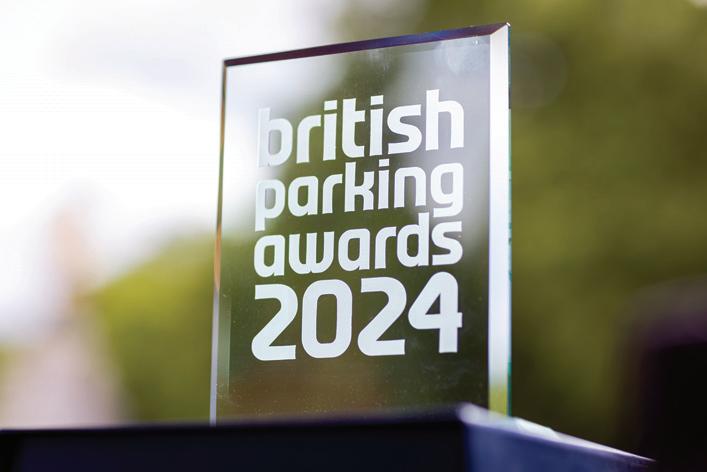
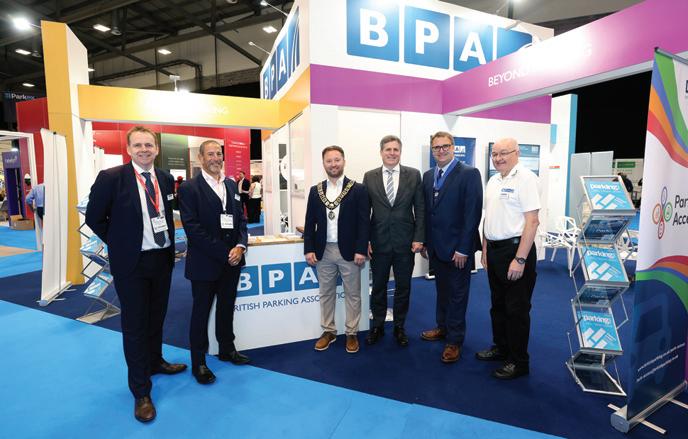

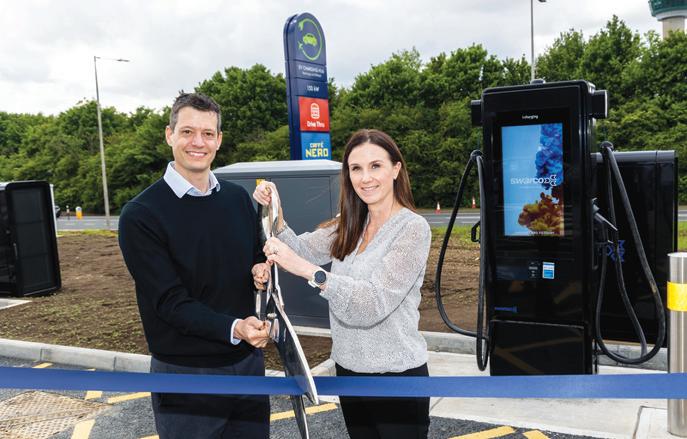

CONTENTS PARKING REVIEW | 5 Editorial Managing editor: Mark Moran Tel: 020
7871 mark.moran@landor.co.uk Deputy editor: Deniz
Tel: 020
7872 deniz.huseyin@landor.co.uk Editorial director: Peter Stonham Production and design production@landor.co.uk Advertising, sponsorship, marketing and exhibition packages Jason Conboy Tel: 020 7091 7895 jason@landor.co.uk Subscriptions Christina Pierre Tel: 020 7091 7959 subs@landor.co.uk Accounts Irina Cocks Tel: 020 7091 7854 irina.cocks@landor.co.uk Managing Director Rod Fletcher Tel: 0191 280 1410 Parking Review was launched in 1989. It is the only independent magazine dedicated to the UK parking sector. ISSN: 0962 3599 Printed by: Pensord 1 Goat Mill Road, Dowlais, Merthyr Tydfil CF48 3TD Published by: Landor LINKS Ltd, Apollo House, 359 Kennington Lane, London SE11 5QY © Landor LINKS Ltd 2024 www.landor.co.uk Registered members of: The Independent Press Standards Organisation www.ipso.co.uk The Professional Publishers Association www.ppa.co.uk 26
7091
Huseyin
7091
28
34
38
42
46
48
MARK MORAN
MADE







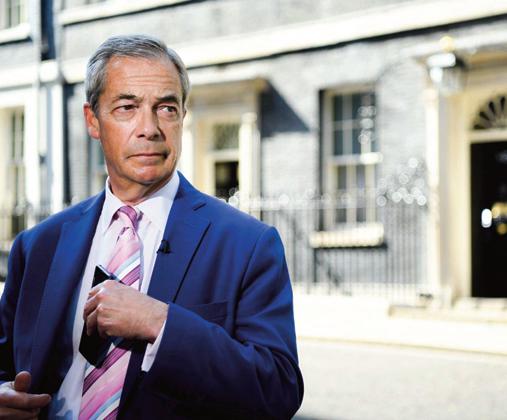





I t ’s p ar t y t







The general election is dominating the news, but to find out what the parties have to say on transport, electric vehicles and parking one has to look beyond the headlines Our Contract Our Contract with You You


Legislation lost in the wash
The dissolution of Parliament brought a guillotine down on pending bills and the work of committees
Prime minister Rishi Sunak’s decision to call a general election has seen political parties, pundits and the public (who will be doing the voting) discuss the issues which matter to them most.
Since 22 May, issues such as taxation, housing, the NHS and migration have dominated the set piece debates and so have framed national newspaper and broadcast coverage.
It is also striking how some topics seem to have vanished from public discourse. For example, the once all-dominating arguments about Europe have vanished and what happens after Brexit is now barely mentioned by the three main UK parties.
Likewise, the existentially important issues of climate change and the environment are receiving far less attention than they merit. The lack of any detailed discourse about net zero and decarbonisation means the socially and economically important topics of transport and accessibility have not been explored, with the transport being relegated to the main parties promising to fill in potholes.
Luckily for those who care about mobility issues, there are specialist magazines, websites and podcasts which have been interrogating the parties positions – or lack of position – on transport, highways, road safety, air quality, electric vehicles and, yes, parking.
To the party manifestos should be added the many manifestos and wish lists published by a wide range of business organisations, campaign groups and consumer bodies across the transport, planning, environmental, consumer and motoring sectors, all of whom will be jostling to influence the policies and actions of whoever it is we put into power on 4 July.
One consequence of a general election being called is that Parliament is dissolved and the political side of government stops, though the civil service does keep the machinery of state turning over while the political classes duke it out at the hustings and on the doorstep. The final days of Parliament sitting saw a process known as ‘washing up’ see some near completed legislation passed, including a laudable Bill expunging the unsound convictions of postmasters caught up in the Horizon scandal.
However, many bills fell away including: the Tobacco and Vapes Bill setting out PM Rishi Sunak’s flagship smoking ban; the Renters (Reform) Bill banning no-fault evictions; the Criminal Justice Bill, legislation that would have given police powers to move rough sleepers, created an offence of causing death by dangerous cycling and banned sex offenders from changing their names; and the Football Governance Bill, which would have established an independent regulator who would have the power to sanction clubs who break financial rules.
Also lost are inquiries currently being undertaken by select committees in the Houses of Commons and Lords.
The election has directly affected the parking sector. A promised consultation about regulating parking on private land has been postponed. The government was to use feedback from the consultation to inform a revised code of practice for parking on private land (this long delayed initiative is one Rishi Sunak championed when a junior local government minister).
In the meantime, the British Parking Association and International Parking Community have agreed to publish a new single code of practice for the private parking sector. Intended as an interim measure until the government version is published, what are the odds on the BPA/IPC version becoming the core guiding document for regulating private land?
6 | PARKING REVIEW
Brook 2AB.
partyof.wales Plaid Cymru Manifesto for th Westminster General Elect n 2024 The Conservative and Unionist Party Manifesto 2024 Real Hope. Hope. Real Change. Manifesto for a Fairer, GreenerCountry
ime… ELECTION 2024
“A FUTURE
IN SCOTLAND.” FOR FAIRNESS, FOR AMBITION, FOR WALES
The manifestos
A look at what the parties have to say on travel, transport, driving, electric vehicles and even parking
Under Rishi Sunak’s leadership the Conservatives have sought to paint themselves as a pro-car, motorist-friendly party. The government has thus ditched the cycling and walking friendly approach championed by Boris Johnson during his stint at Number 10. The active travel agenda outlined in Gear Change was replaced by a Plan for Drivers, which sets the tone for current pledges made by the party.
The Tory manifesto states: “Too often over the last few years, local Labour politicians have made the journeys on which people rely harder. We are determined to turn this situation around. Since 2010, the Conservative government has consistently been on the side of drivers. We have prioritised freezes in Fuel Duty and recently published our Plan for Drivers including reforms to make better use of bus lanes, introduce penalties for overrunning street works and implement a consistent approach to the enforcement of entering yellow box junctions. Following the recent consultation, we will allow motorcycles in all bus lanes and reform motorcycle licensing.”
A new Conservative government will not introduce pay-per-mile road pricing and will ban Mayors and local councils from doing so.
The Tories also say 20mph zones can help improve road safety in residential areas or outside schools, but claim misuse of the limit is undermining public trust and risks congestion and pollution. The manifesto states: “We are clear they must only be considered on a roadby-road basis and with the support of people who live there. We will require any new schemes to be put to a referendum and introduce a ‘right to challenge’ existing low traffic neighbourhoods and 20mph schemes.”
The manifesto thus promises that a new Conservative government’s first King’s Speech will introduce a Backing Drivers Bill that will:
• stop road pricing
• reverse ULEZ expansion in London
• rule out blanket low traffic neighbourhoods and 20mph zones.
It is worth noting that the Conservatives appear to be the only major party that use the word ‘parking’ in their manifesto. The manifesto states: “We will roll out the National Parking Platform this year to simplify paying for parking. Reflecting feedback from older and disabled people, we will also give councils the power to ban pavement parking, provided they engage with businesses and residents to ensure they are not adversely affected.”
The Tory manifesto repeats a previous commitment that funds that would have been used for the cancelled elements of HS2 will instead go towards tackling the country’s pothole problem.
The Conservatives also reconfirmed a commitment to Pumpwatch, a national scheme that will provide drivers with live fuel pricing.
When it comes to electric vehicles, the Tories pledge to deliver the Zero Emission Vehicle (ZEV) Mandate, which requires car makers to sell an increasing proportion of zero-emission vehicles annually, starting in 2024. The mandate requires 80% of new cars and 70% of new vans sold in Great Britain will now be zero-emission by 2030, increasing to 100% by 2035. The Conservatives promise they will ensure EV charging infrastructure is truly nationwide, including rapid charging. The party also promises to support domestic car manufacturers if there is evidence other countries are breaking global trade rules.
During what has been a cautious campaign, Sir Kier Starmer’s Labour Party has repeated a previous commitment to renationalise the rail system and also introduce local authority run bus franchises. But, like the Tories, Labour wants to sound like it is the driver’s friend.
The Labour manifesto states: “Cars remain by far the most popular form of transport. Labour will maintain and renew our road network, to ensure it serves drivers, cyclists and other road users, remains safe, and tackles congestion. We will fix an additional one million potholes across England in each year of the next parliament, funded by deferring the A27 bypass, which is poor value for money. Labour will further support drivers by tackling the soaring cost of car insurance.
“And, as set out in our automotive sector plan, Labour will support the transition to electric vehicles by accelerating the roll-out of
chargepoints, giving certainty to manufacturers by restoring the phaseout date of 2030 for new cars with internal combustion engines, and supporting buyers of second-hand electric cars by standardising the information supplied on the condition of batteries.”
In an entertaining, stunt-filled campaign, Liberal Democrat leader Sir Ed Davey is standing (while falling off things) on a manifesto calling for a ‘fair deal’. The manifesto is strong on greener transport themes.
The Liberal Democrat manifesto states: “Conservative ministers have badly neglected our transport infrastructure. Their chaotic U-turns have seriously undermined the rail industry, electric vehicle manufacturing and regional development. They have failed to roll-out electric charging points at anything like the speed necessary, and they have left local bus routes in rapid decline. Roads are in a terrible state, with potholes everywhere. By investing in electric vehicles and clean public transport, as well as encouraging walking and cycling, Liberal Democrats will enhance local, regional and national connectivity while boosting the economy, protecting the environment and improving public health.
“We will make it cheaper and easier for drivers to switch to electric vehicles by rapidly rolling out far more charging points, reintroducing the plug-in car grant, and restoring the requirement that every new car and small van sold from 2030 is zero-emission.”
The Lib Dems would support these new charging points with an upgraded National Grid and require all chargepoints to be accessible with a bank card. They would also cut VAT on public charging from the current level of 20% to 5%, the same as that collected when an EV is charged at home. The harmonisation of VAT on charging EVs at home and in public car parks is an idea advocated by the automotive sector, motoring organisations and groups supporting the transition to EVs.

The SNP’s new leader John Swinney unveiled a manifesto that sets out a vision of a greener transport system. It calls for a fully devolved, integrated and nationalised railway, and transition to zero-emission transport fuels.
With regards to motoring, the SNP says it wants to strengthen incentives to purchase cleaner vehicles. It argues the UK government should establish a £500m Low Income EV Car Leasing Fund to enable 50,000 EV leases a year to benefit low income families.
The SNP manifesto says: “Reducing road traffic is key to cutting emissions, but in a rural and sparsely populated country, not everywhere and everyone can be expected to make the same changes at the same time. It is vital that we ensure roads are as safe, reliable and resilient as possible.”
Plaid Cymru leader Rhun ap Iorwerth is promoting a manifesto that makes a case for better rail, bus and active travel provision across Wales. While Plaid Cymru supports the principle of the introduction of the 20mph speed zone across roads in Wales in order to reduce the number of accidents and life-changing injuries, it believes that the speed limit was poorly implemented by the Labour Welsh Government. Plaid Cymru says it supports a review to ensure it is working successfully across Wales in reducing dangerous driving in urban areas.
The Greens want to see more investment in cleaner and greener transport, calling for more investment in active travel, buses, a renationalised rail system and the electrification of transport. The Green Party also wants to reimagine how we use streets in residential areas in order to reduce traffic and open them up for community use.

Nigel Farage’s right wing movement vows to ‘Stop the War on Drivers’. It would legislate to ban clean air zones and low traffic neighbourhoods. Reform UK says it will keep the speed limit low where safety is critical, otherwise, 20mph zones will be scrapped. Farage’s party also makes a pledge to scrap moves to meet net zero commitments, which would mean no ban on petrol and diesel cars and no legal requirements for manufacturers to sell electric cars.
ELECTION 2024 PARKING REVIEW | 7
Renamed and reborn
Trellint delivers comprehensive parking and kerbside management solutions that make the kerb easy to use and accessible to all. Its vision is to enhance the value of every kerb. To accomplish this, it is leading the transformation of the industry with intelligent kerbside management solutions that promote equitable access to the kerb, conquer congestion, and improve safety.
Modaxo is a collective of companies focussed on connecting people with the places they need to be. In April Modaxo announced that it had completed its acquisition of Conduent’s kerbside management and public safety businesses having previously announced its intention to do so in December 2023. The acquisition signalled the launch of two new brands, one of which is Trellint. The new name is inspired by the supportive structure of a trellis reflecting a desire to “empower the growth of the parking industry by becoming an interwoven part of the communities it serves.”

At its heart, Trellint’s offering is tech-led enforcement but the way they create the software for that enforcement is in many ways unique. Moving away from the Conduent fold allows the software development business to forge a new way forward, opening up opportunities for the longestablished and experienced team – the new name heralds a new approach.
Originally formed as a family run software company in 1993, the business, along with its software, has developed dramatically over time. Xerox bought the company in 2012 and then, following a restructure, it became part of Conduent. Its most recent acquisition by Modaxo, and its rebrand as Trellint, brings the strength of the business and its offering into sharp focus.
Trellint’s main operational and technical hub is in Portsmouth, and along with its other offices in the Reading and Oxford areas, it employs a total of around 130 staff. There have been aggressive growth plans under way for the past three years and there will now be a period of consolidation while Modaxo allows Chris Newman, Head of UK Operations, and the UK management team to pull some five-year strategic plans together.
Chris joined the business some 17 years ago and he recognises the recent acquisition and the rebrand to Trellint as an opportunity to harness the support Modaxo is offering from its operation in North America. He said: “Joining Modaxo, an established global entity, gives us a framework for reporting but it also permits Trellint a degree of autonomy so that decisions can be taken in an agile way and as long as there is commercial justification. Modaxo appreciates our value proposition and we believe that this agility and flexibility will be crucial as we move forward.”
ADVERTISING FEATURE
Chris Newman
Despite the legislative differences between the territories Modaxo exists in, which include the US, Canada, Mexico and Cyprus, there is some synergy between the way the offices operate. Trellint in the UK is aligned with the US in many ways with the American firm now invested in ANPR technology (through the other newly created brand Elovate) and spotter vehicle technology which is to be used in driving Trellint’s efficiencies here.
Chris continues: “With real investment and momentum, we are looking to improve our products and services so that
we can take everything we’ve done over the past three years, refine it and establish ourselves as a leading techled enforcement provider.”
In its new form, there is more potential for strategic partnerships and these will be under close consideration over the coming months as they could be key in enabling deployment of Trellint’s software at scale.
Building bespoke solutions: The Oxford Zero Emission Zone
Trellint’s has the ability to create bespoke solutions and a project such as the Oxford Zero Emission Zone is a case in point.
Trellint was first appointed by Oxfordshire County Council to support its parking operation and was then asked if it would be possible to deliver a zero-emission zone. The county council’s clear policy was that it wished to improve the air quality, health and wellbeing of its residents and businesses.
The zero-emission zone (ZEZ) would be free for electric vehicles but impose a daily charge on petrol and diesel vehicles unless they had an exemption, so the challenge for Trellint was to enable the accurate identification of non-compliant vehicles through the creation of a realtime Known Vehicle List lookup system.
It was the first of its kind in the UK, and it integrated cameras in the city centre with the permit system and with the back office, allowing drivers to pay different tariffs depending on whether they are a resident or a business permit holder. The system used vehicle CO2 (g/km), fuel type and the emissions standards (Euro standards) in determining the appropriate ZEZ charge.
The bespoke system created by Trellint is fully configurable so once the basic parameters are in place, it can be adapted for any number of schemes including congestion and air quality schemes, Healthy Streets schemes, Low Traffic neighbourhoods, School Streets schemes and others. The system was designed to allow for the easy addition of new data sources.
Chris Newman said: “The ZEZ for Oxfordshire has been a resounding success for them, so much so that they are thinking about renewing and expanding the scheme
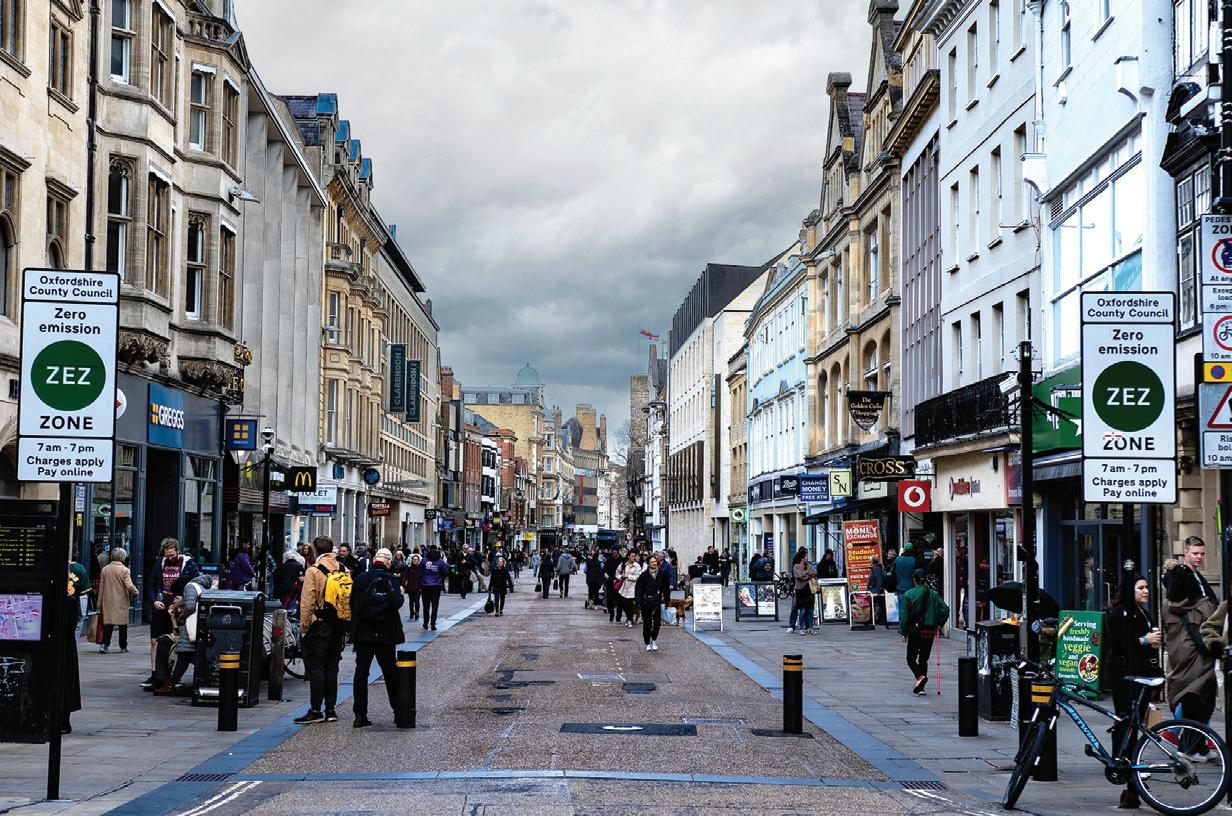
across Oxfordshire. Working in the agile, iterative and collaborative way that we have with the Council team, developing plans together and our UX team working directly with them, is why it been so effective and why the public has faith in it as an accurate and flexible platform.”
Access to data is obviously a huge benefit with any scheme, but while Trellint can give clients a huge amount of data, there is not always the resource available to analyse that data and apply learnings for best effect from the client end. A self-service reporting platform can be provided by Trellint and then, if required, Trellint can also provide the data analysis so that it can be used to make changes or help plan ahead, see where non-compliance is high, where there are spikes in occupation, or where deployment of enforcement officers for special events such as match days or festivals when a high volume of traffic is expected. This allows Trellint’s clients to get the most out of the data they have gleaned – a real partnership giving actionable results.
ADVERTISING FEATURE
trellint.com
Parking policy should tackle climate change
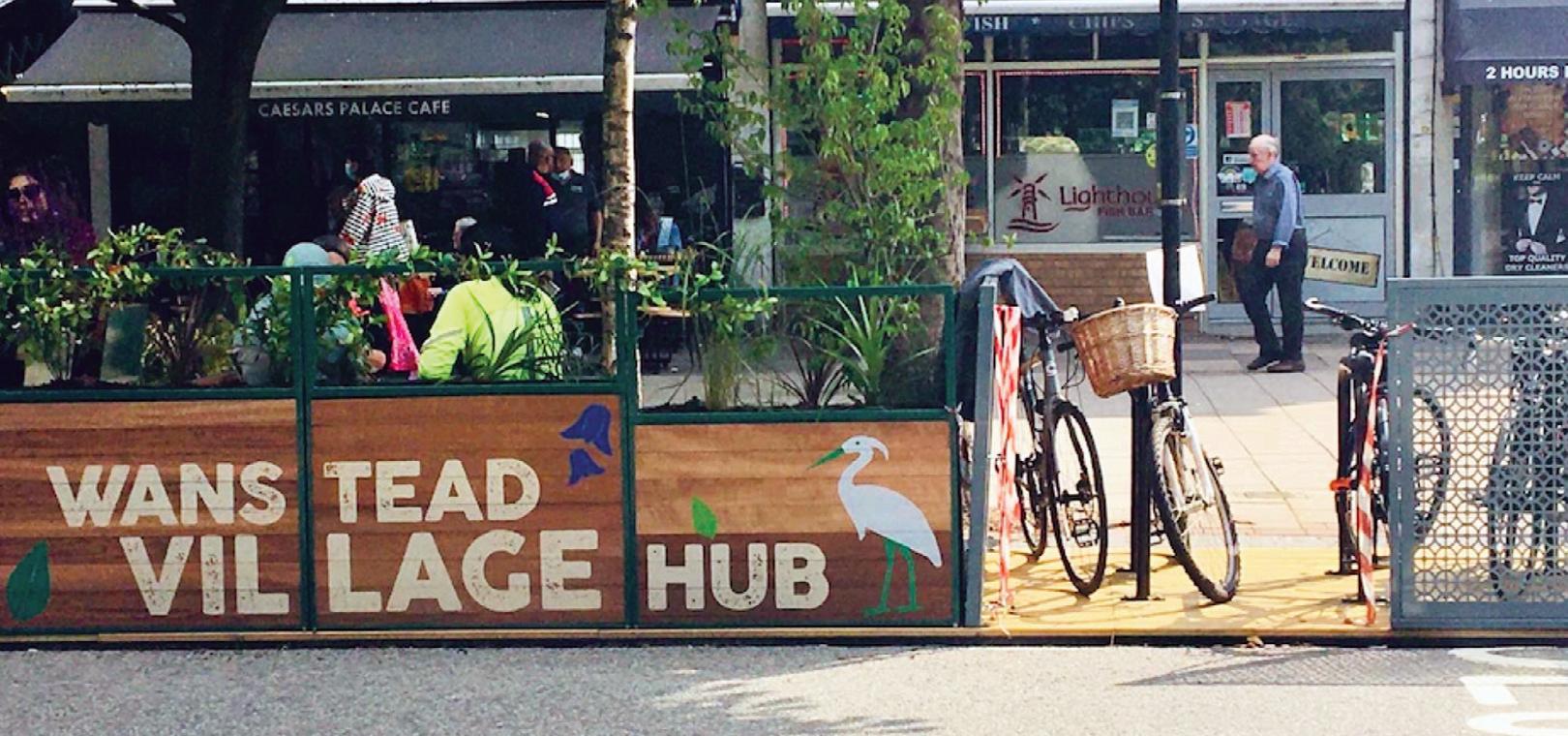
Possible promotes the parklet concept
Possible and CPRE call on London boroughs to reallocate kerbside for more sustainable uses
Parking policy can be a costeffective intervention that can have a significant positive impact on climate, road safety, air quality and accessibility, but environmental campaigners feel it is under-utilised in London.
Climate campaign group Possible has teamed up with the Campaign to Protect Rural England (CPRE) to launch an interactive Parking Action Policy map which evaluates the parking policies of each London borough from a climate perspective.
The campaigners regard parking policy as a key tool councils have to tackle climate change
and reduce reliance on cars, but argue that hardly any London local authorities are using these powers effectively.
Possible and CPRE evaluated the parking policy of every borough in London by grouping areas of policy into key categories such as the cost of parking, controlled parking zones (CPZs) in place, availability of electric vehicle (EV) charging, and accessibility, and identifying key pieces of policy which the campaigns wanted to see evidenced in each of these categories.
The more policy a council had in place, the higher their score in each category. A council’s overall score is an average of their scores across all categories.
The research found a wide variation across boroughs.
The boroughs of Camden, Hackney, Haringey, Islington and
Dutch car park ramp collapses
A car park ramp at a Dutch hospital collapsed last month. No one was injured when part of the car park at the St. Antonius hospital in Nieuwegein partially failed on Sunday 26 May.
Police used drones and checked CCTV camera footage and staff rosters to ensure no one had been caught up in the collapse.
A specialist rescue team used dogs to search the debris to ensure that nobody was buried when the car park ramp’s collapsed at around 10pm.
The hospital cancelled all non-essential admissions on the following Monday.
Nieuwegein mayor Marijke van Beukering said in a statement that it is unclear why the building partially collapsed.
The car park, owned by Q-Park, has six storeys and is used by staff and visitors.
A car park collapsed while under construction at Eindhoven Airport in the Netherlands during 2017. An investigation concluded that this car park collapsed because of heat stress exacerbated by a design fault. This led to the Dutch home affairs ministry to urge local authorities to check their records to see if any buildings in their area using prefabricated concrete slabs were at risk.
In 2018, some 14 offices and meeting rooms in two ministry office blocks in The Hague were closed off to staff because the floors were said to be potentially unsafe.
Lambeth were rated among the highest of all London boroughs, measured to have significantly better parking policies than others and receiving scores over 50 out of 100.
At least ten boroughs, including Bexley, Havering, Hillingdon, and Redbridge had some of the poorest parking policies and, therefore, received scores under 20.
Possible and CPRE are calling on every London borough to commit to reallocating at least 25% of this kerbside space for more sustainable uses, such as parklets, rain gardens, cycle storage and parking, and sustainable transport hire.
Additionally, councils can take action by introducing more controlled parking zones (CPZs) in their boroughs, including on housing estates, which can be
POSSIBLE
susceptible to commuter parking, turning them into free-forall car parks and limiting public space for people.
Carolyn Axtell, parklets campaign manager at Possible, said: “Parking policy is one of the most effective tools a council can use to combat the climate crisis. It is not cost-prohibitive, and can encourage people in all London boroughs to reduce their car use – which is necessary for both the capital and the UK to meet their climate targets.
“As the Parking Action Policy map shows, most of London’s councils are failing to make full use of parking policy to deliver safe and accessible streets, and to ensure that there is equity in the distribution of public space.
“While some London boroughs are leading the way in using parking policy to create climate friendly and more equitable streets, we still have a lot of work to do.”
Alice Roberts, head of campaigns at CPRE London, said: “Cars are hugely inefficient of space: car dominance leads to loss of, and lack of, parks and play spaces within cities, where land is swallowed up by huge amounts of ‘grey space’ given to roads and parking.
“We advocate for cities run on public transport, walking and cycling – with space freed up for more greenery, parks and space to be active, outdoors and in contact with nature.”
Baby dies in church car park
A one-year-old girl has died after being hit by a Land Rover in a church car park.
Ivy Mae Ross was struck outside the Plymouth Brethren meeting hall in Balmedie, Aberdeenshire, at about 7.45pm on 15 May. The accident happened after a Bible reading at the hall.
She was taken to Aberdeen Royal Infirmary but died a short time later.
Her parents Holly and Glenn said: “We can confirm that our beautiful daughter Ivy Mae passed away following a tragic accident last evening after our regular church gathering.
“We are absolutely devastated and ask that our privacy is respected at this challenging time.
“We value all the prayers and messages of sympathy and support
we have received from the local community. The emergency services tireless work and support is greatly appreciated.”
The Plymouth Brethren church issued a statement: “We are a very supportive church, and we are giving the family and friends of the people involved in the accident the help they need.”
Inspector Scott Deans of Police Scotland said: “At this time, our thoughts are with the family of the deceased, along with everyone else affected by this tragic incident.
“Our investigation into the circumstances remains ongoing and we’d like to thank the wider Balmedie community for their patience and understanding as officers carry out their inquiries in the area.”
NEWS 10 | PARKING REVIEW

The parking industry in the UK is undergoing a revolution, and WPS is at the forefront. Say goodbye to the frustration of multiple parking app sign-ups – the National Parking Platform (NPP) streamlines payments for a seamless experience.
Are you ready to embrace the future? WPS is your trusted partner for a smooth transition. Our future-proof hardware is fully NPP compatible, ensuring a hassle-free upgrade whenever you’re ready.
Upgrade your parking experience today. Contact WPS to discuss your NPP integration.

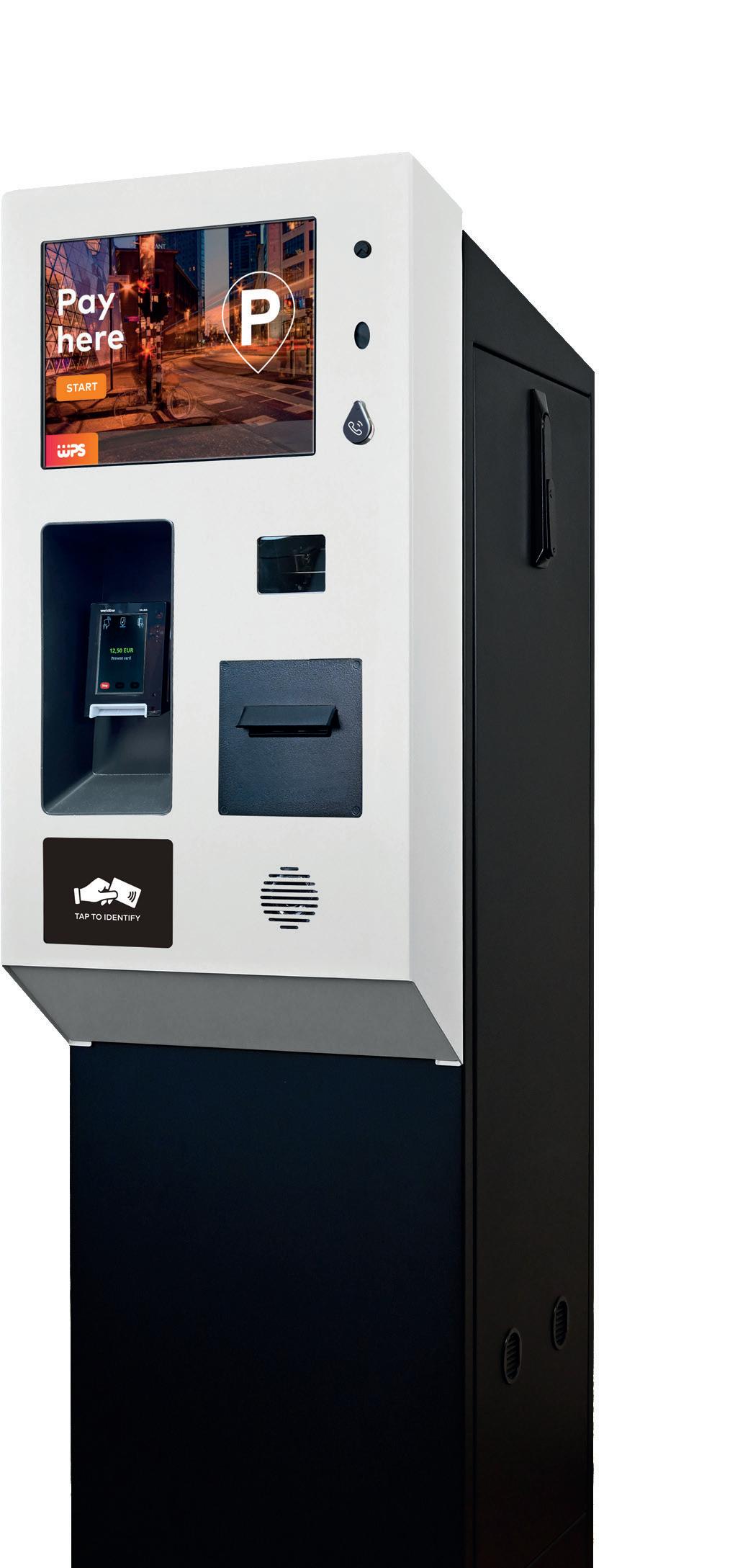

info@wps-uk.com 01793 541080 www.wpsparking.com We are NPP ready. Are you?
Plans to introduce a workplace parking levy (WPL) scheme in Edinburgh have been suspended after councillors voted against paying £100,000 to develop a final proposal for the project following a public consultation. City of Edinburgh Council has been studying the case for a workplace parking levy since 2018 when the transport and environment committee agreed to start investigating the approach.
The case made for a WPL scheme was that it would cut the number of car journeys in the city centre and reduce air pollution. Money raised by the WPL would have been reinvested into sustainable and active travel infrastructure. It had been anticipated that a scheme would raise up to £12m a year. Businesses could have been charged up to £650 per available space every year, but would have been able to pass the cost on to drivers at their own discretion.
In 2019 the Scottish Government introduced legislation that allowed councils to decide whether or not they wanted to go ahead with plans.
However, a public consultation ran between November and February attracted more than 2,600 individual responses and over 30 from businesses and organisations which revealed a mixed picture when it came to support for the WPL scheme.
The future of the WPL scheme was discussed at the transport and environment committee on 23 May.
Council officer Gareth Dixon, who has led work on the WPL project, said the purpose of the engagement had provided a first chance to talk to the public and to businesses. Addressing the committee he said: “A workplace parking levy is not about banning cars outright, it is about encouraging people to travel by car less for certain reasons. But the biggest impact comes from that raised revenue that it could potentially generate, and if that goes toward public transport it would encourage that modal shift which again would take people away from single private car use.”
An amendment tabled by Labour and Lib Dem councillors, and supported by the Conservatives, agreed “no further work” should be undertaken on the WPL “until a plan is developed in partnership with trade unions, employers and community councils to address the predictable and non-trivial negative impacts such as displacement parking and the impact of shift workers”.
The amendment said a city-wide scheme is “not appropriate for Edinburgh at this time”. It called on officials to investigate “other legal and financial options available to the council which can address, in particular, the substantial number of vehicles travelling into Edinburgh from outside of the local authority area each day”.
The committee voted 6-5 to halt work on the scheme.
Edinburgh is run by a minority Labour administration. Labour transport convener Scott Arthur has been an opponent of the scheme since it was first proposed. He referred to the experience of Nottingham, the only place in the UK to have a WPL. “The last time I
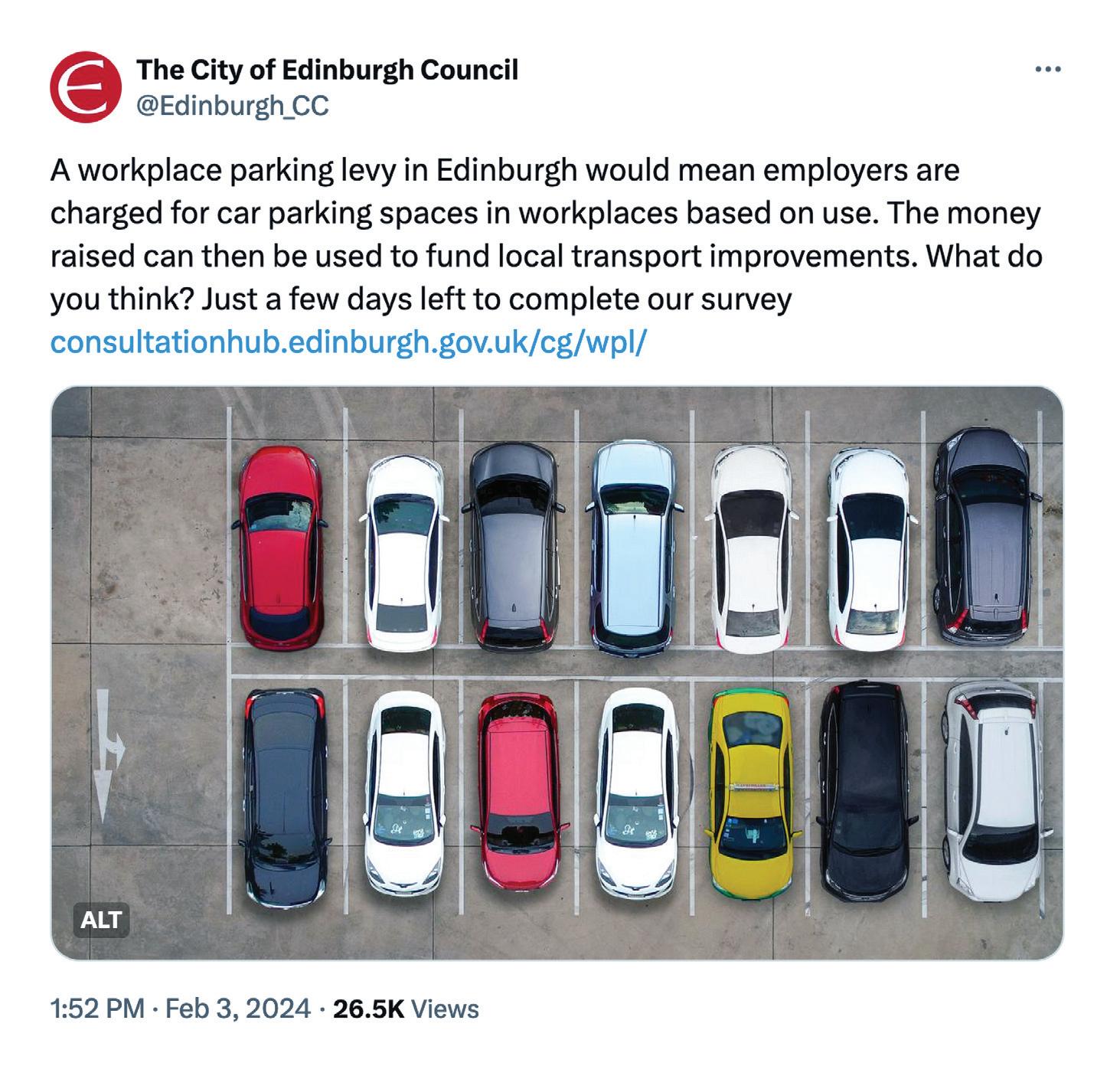

Edinburgh workplace parking charge scheme loses funding
Transport committee blocks spending on scheme preparations
looked, traffic had grown faster in Nottingham than it had in Edinburgh,” Arthur claimed. “It’s not a silver bullet but it could, if integrated with a wider suite of powers, have a part to play, particularly through funding rather than actually discouraging people to use their vehicles.”
Kevin Lang, leader of the Lib Dems, said his group did not think WPL was enforceable. He said: “People can, in many parts of Edinburgh, very easily avoid paying any charge at all simply by parking on a residential street. What about those areas around big retail centres, where you could see very substantial commuter parking being shifted into residential areas?”
Lang highlighted the problem of displaced parking. Controlled parking had been suggested as the answer, but Lang said parking controls would require another round of consultation. He continued: “The other issue is we have absolutely no guarantee here of any new bus services from this. In many parts of Edinburgh you still do not have proper transport connectivity. If you live at Kirkliston and work at Hermiston Gait there is no direct bus service. If you live in East Craigs and work at Craigleith retail park there is no direct bus service.
“And there is no guarantee that we’re going to be connecting these things, so we can’t
guarantee we’re going to provide the alternatives that would encourage them to use public transport.”
The Conservatives backed the amendment, with committee member Cllr Marie ClairMunro saying: “Any introduction of a workplace parking levy would be a hammer blow to hard working people – especially women, carers, potentially teachers, nurses, low-paid workers and businesses. The workplace parking levy clearly impacts those individuals more when there is no public transport available.”
The SNP and Greens both wanted to continue with work on a WPL.
SNP transport spokesperson Cllr Danny Aston said: “I absolutely acknowledge there’s still work to be done to address trade union concerns and the points raised by employers. But I have yet to be convinced those are insurmountable, nor am I clear that all work on the WPL has to pause while that happens.”
Green Party committee member Cllr Jule Bandel said: “We keep complaining we don’t have any money and then we reject £10-12m of potential revenue.”
She said WPL would act as a form of demand management and provide funds for sustainable travel improvements that enable people to give up their car and achieve significant modal shift.
NEWS 12 | PARKING REVIEW
City of Edinburgh tweet about the WPL consultation from February 2024
Edinburgh emission zone enforcement begins
Penalty charge notices being issued following a two-year grace period
A scheme that restricts the most polluting vehicles entering the city centre of Edinburgh is now being enforced. A Low Emissions Zone (LEZ) was introduced in Edinburgh on 31 May 2022, along with LEZs in Glasgow, Aberdeen, and Dundee.
In Edinburgh, a two-year grace period was put in place, meaning no penalty charges were issued during this time.
In line with Scottish Government regulations, since 00:01 on 1 June the council has been able to issue penalty charge notice (PCN) fines for contraventions within the LEZ.
The LEZ ensures that all vehicles driving within Edinburgh’s LEZ must meet the less-polluting emission standards or face a penalty charge.
It is anticipated that the LEZ will reduce harmful emissions of nitrogen dioxide from vehicles, with air quality improvements expected to extend beyond the scheme’s boundary.
LEZ restrictions apply to
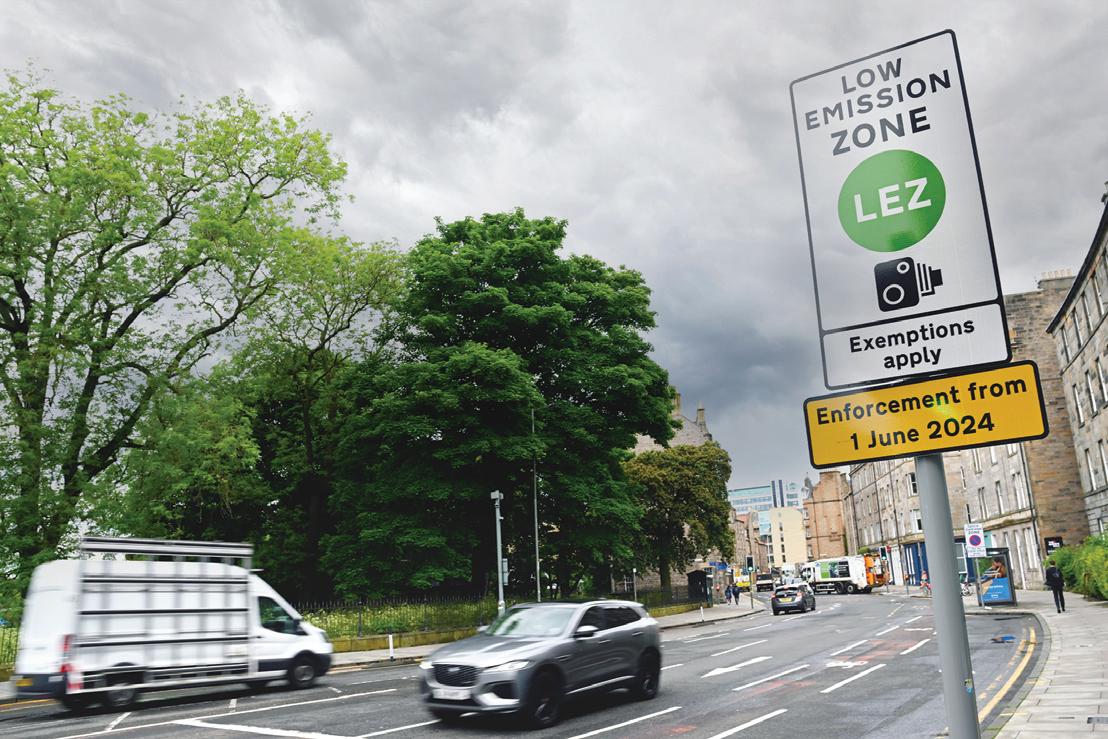
motor vehicles, except motorcycles and mopeds. Vehicles must meet minimum emissions standards to drive within the zone, though national exemptions apply including for Blue Badge holders and emergency vehicles.
Changes have been made to roads to allow drivers with vehicles that do not meet the standards to avoid them entering the LEZ. These include junctions in the Old Town (junction of Pleasance with Holyrood Road), and Tollcross, as well as changes to Morrison Street. A map of the LEZ is available on the coun-
cil’s website.
Individuals can check whether their vehicle is compliant on the LEZ Scotland website.
The Scottish Government is providing £5m across Scotland to reopen the LEZ Support Fund for 2024-25 where residents and businesses can apply for support to ease the transition through retrofitting, disposal and other grants. Over the past three years people in the Edinburgh region benefited from £2.4m of grant support to prepare for the LEZ.
The LEZ forms part of the city’s wider ambitions under the 2030 Climate Strategy and other
schemes such as the City Mobility Plan and the 2050 Edinburgh City Vision.
Edinburgh’s transport and environment convener Cllr Scott Arthur said: “We’ve reached an important milestone in our journey to become a healthier, greener, and more sustainable city. For the past two years we’ve run a positive information campaign to give people time to get ready for the LEZ, and to make sure they avoid penalties once enforcement begins.
“We have ambitious plans to achieve net zero, accommodate sustainable growth, cut congestion, and improve air quality, amongst other commitments to create a safer and more peoplefriendly city; and the LEZ is a key component of these.
“Public attitudes towards LEZs are improving across Scotland, with a recent poll indicating that 60% of respondents were in favour of the zones, with just 21% opposed. This is clear evidence that people are seeing the many benefits of LEZs, and how they link in with our wider aims to make our city cleaner, greener and healthier for everyone.”

Condition Surveys Deck Waterproofing Corrosion Management Repair and Protection Movement Joints Lifecare Plans 50 Call to find out more: Southern 020 8654 3149 Northern 01675 488261 cemplas.co.uk WHERE TRANSFORMATION STARTS NEWS PARKING REVIEW | 13
LEZ signage in Edinburgh
Large vehicles outgrowing council car parks
Autocar survey of councils reveals bans on oversize vehicles
Drivers of larger cars will find it increasingly hard to park their car without risking punishment if the current trend of growing car dimensions continues, warns Autocar magazine.
Autocar submitted a Freedom of Information (FOI) request to every council in the UK, enquiring whether they planned to extend parking bays to accommodate the longer cars that are now common on British roads. Data from the FOI request revealed that, despite the fact that cars are getting bigger, just 8.2% of councils have plans to increase the size of the bays in their car parks.
Several councils confirmed that they impose maximum length restrictions on vehicles, putting the drivers of many bigselling models at risk of receiv-
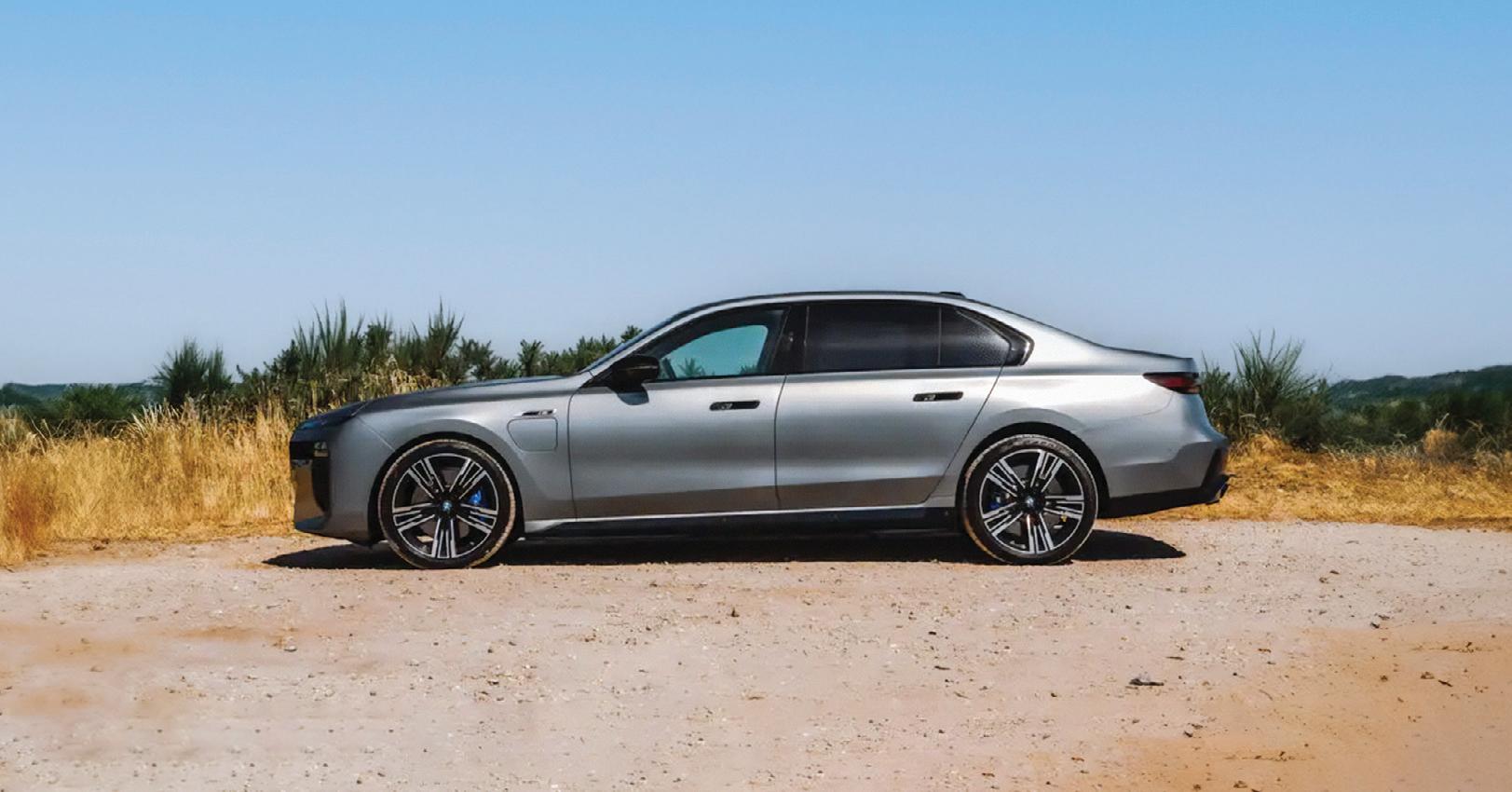

ing fines when using councilrun facilities.
Wokingham Borough Council, South Hams District Council, Broadland District Council and South Norfolk Council place restrictions on vehicles that do not fit into their parking spaces.
Standard off-street parking
Sheffield parking enforcement supports cyclists and pedestrians
New parking enforcement rules are to be introduced across Sheffield aimed at making roads and pavements safer for cyclists and pedestrians. Since 20 May, motorists can be issued a penalty charge if they park across dropped kerbs (which have been lowered for vehicle access or pedestrians), in cycle lanes, or are not parked close to the kerb.
HGVs are also not allowed to park with wheels on the footway, unless loading (as allowed by national regulations), while nonlicenced vehicles parked up and offering goods for sale may also be penalised.
The new enforcement rules have been introduced following a recent consultation where over half of those who replied had experienced vehicles blocking their driveways, while over 70% said they had experienced vehicles blocking pedestrians, dropped kerbs and double parking.
Motorists who are found to be breaking the new enforcement rules and causing obstruction to other road users, could face a fine of £70, reduced to £35 if paid within
14 days.
Richard Eyre, director of streetscene and regulation at Sheffield City Council, said:
“The aim of these new enforcement rules is to keep pedestrians and cyclists safe on Sheffield’s roads and these new rules allow the council to enforce against obstructive parking that could previously only be enforced by the police.
“Double parking, for example, may obstruct other road users including emergency services vehicles, while parking in front of dropped kerbs can put people with visual impairments or with restricted mobility at risk, as well as impacting drivers trying to enter or leave a premises.”
Drivers are also being reminded they need to obtain a pay & display ticket or PayByPhone session as soon as they park their vehicle.
Many locations now offer an option to pay by card at a machine while PayByPhone allows drivers to pay via an app, online or by telephone.
Failure to display a valid parking ticket could result in a fine of £50, reduced to £25 if paid within 14 days.
bays measure 2.40 metres wide by 4.80 metres long.
Autocar says seven out of the top 10 best-selling car brands in the UK last year produced cars that exceed this length.
Analysing how the sizes of popular models have changed since 2018, Autocar compared
the sizes of a sample of 27 cars sold in the UK. It found they had increased in length by an average of 97.6mm (3.8 inches).
For example, Autocar said that the BMW 7 Series has grown nearly a foot longer, meaning it is too long for the majority of UK car park bays.
Belfast helps the bin lorries
A pilot scheme is under way to address parking issues in Belfast that make it difficult to empty residents’ bins on time.
Belfast City Council is collaborating with the Police Service of Northern Ireland (PSNI) and the Department for Infrastructure (DfI) on the ‘Park with us in mind’ initiative.
The campaign is targeting hotspots where council waste-collection vehicles are often unable to gain access to help residents dispose of their waste and recycling.
This can be because of poor, inconsiderate or illegal parking, including parking at street corners, on double yellow lines or on both sides of the road, making it hard or
impossible for collection vehicles to pass through.
Six areas have been identified for the pilot, based on data collected by the council regarding frequently missed collections. During the pilot, which will run for 18 months initially, there will be a phased approach to helping streets tackle problem parking issues.
Cars causing an obstruction or parked illegally will, in the first instance, have an advisory notice placed on their windscreen. This will outline the importance of proper parking to ensure bins can be collected on time and other essential-services vehicles, including ambulances and fire engines, can pass by in an emergency.
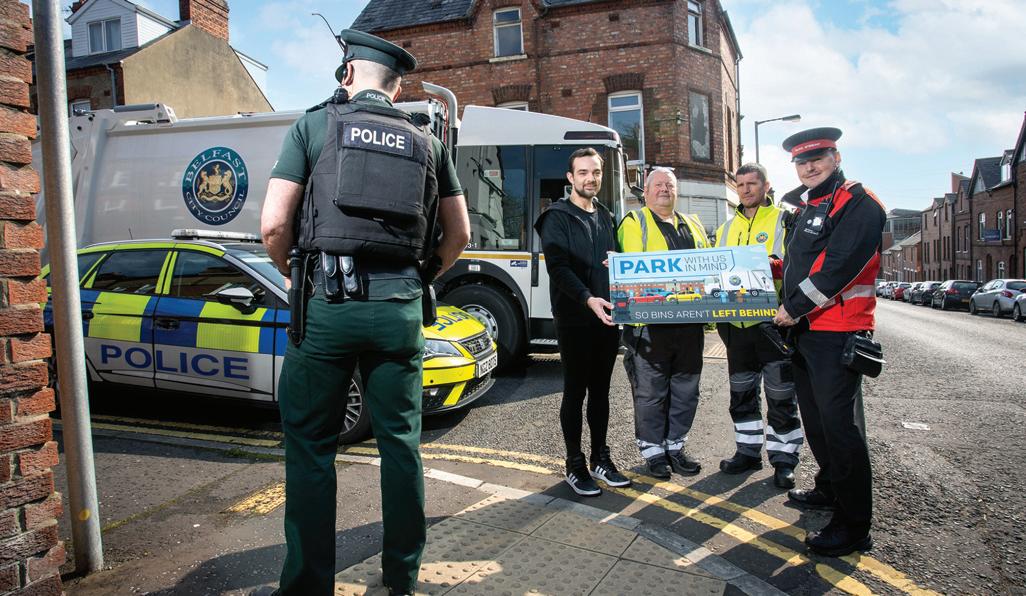
NEWS 14 | PARKING REVIEW
The BMW 7 Series
Launching ‘Park with us in mind’

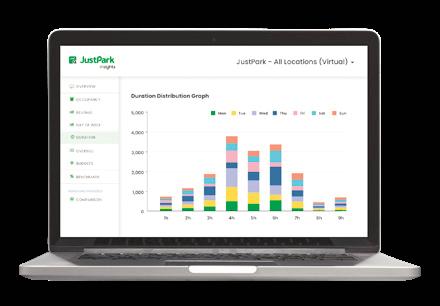

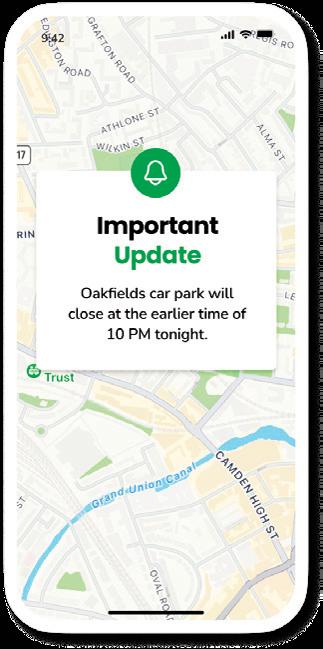






Airport drop-off zone costs are on the move
RAC analyses the cost of taking friends and family to the airport
Drivers taking relatives and friends to the airport should brace themselves for record terminal drop-off prices, warns motoring group the RAC.
Seven of the UK’s 21 busiest airports are putting up fees and one is introducing them, says the motoring organisation.
The biggest jumps have been at Southampton Airport, which has increased its drop-off fees to £6 for 20 minutes (it was £4 for 20 minutes in 2022) and Belfast International, which has put the charge up by £2 to £3 for 10 minutes.
Belfast’s other airport, Belfast City, has now introduced a charge of £3 for 10 minutes, having previously not charged for dropping off.
Drivers heading to Glasgow Airport pay £5 for 15 minutes (up from £4 for 15 minutes in 2022) while at Aberdeen the initial rate also sits at £5 for 15
Sometimes the dropoff fee is worth it...


minutes (up from £4 for 10 minutes in 2022).
Leeds Bradford has increased its charges to £6 for 10 minutes (from £5 for 10 minutes).
Liverpool John Lennon is now £5 for 10 minutes (up from £4 for 10 minutes).
Birmingham has increased its fee to £4 for 15 minutes (from £3 for 15 minutes).
Despite not increasing its fee this year, London Stansted still tops the RAC’s drop-off charges table with an initial charge of £7 for 15 minutes.
Six of the busiest UK airports
Airport Parking Index published
The average price for a day’s parking at a UK airport is over £47, with a week’s parking averages over £230, suggests new Airport Parking Index.
The index has been developed by car finance app Carmoola as a guide for travellers looking for affordable parking options whilst on holiday and for those dropping off friends and family for flights.
Carmoola analysed the websites and pricing of ‘pay-on-the-day’ parking options across the UK’s top 15 most popular airports as of April 2024. When analysing the cost of parking per hour and day, Carmoola analysed the fees as per short-stay parking. Long-stay parking prices were analysed when researching the cost of a week long ticket.
Carmoola also examined the cost of dropping-off someone at ‘DropOff Areas/Bays’ for under 10 minutes.
Through this research, the app determined the average costs of parking and dropping off per airport. It found in 2024, the average price for a day’s parking at a UK airport is £47.49, with a week’s parking averaging a total of £234.
London City Airport is the most expensive for all parking durations, with rates starting at £18.50 per hour – two-thirds (68%) more than the national airport average of £11.
London City was additionally found to be the most expensive airport for ‘pay-on-the-day’ parking for a week-long stay, with a sevenday ticket costing holiday-goers £504.
It was discovered that drivers can save up to 78% off parking if they were to pre-book airport parking, with all airports offering some form of discount.
Belfast International has been discovered as the most affordable airport for holiday parking for all durations of stay. The Northern Ireland-based airport was found to charge drivers just £7 for an hour, and a mere £90 for a week’s stay.
The index also looked into the pricing strategies for drivers dropping off travellers, revealing that Birmingham and Luton are the only airports which offer free dropoff. The majority (87%) of airports which charge drivers for dropping off friends or family members, were found to charge an average of £5 for up to 10 minutes.
are among the 13 airports that have frozen drop-off charges since last summer. Alongside Stansted holding its prices are London Heathrow and London Gatwick which charge £5, Manchester is £5 for five minutes, London Luton is still asking for £5 for 10 minutes and Edinburgh costs £4 for 10 minutes.
There are three airports where relatives and friends can be dropped off without any charge: Cardiff, London City and Inverness airports all have a free option at the terminal forecourt.
How to avoid high drop-off charges
Do your research
Check out the drop-off facilities on the airport’s website to understand fees, payment options and stay times. Terminal forecourt drop-off areas are likely to be the most expensive. Have your payment ready Once you have found out how to pay, ensure you have payment ready to hand, whether that is adequate change, a debit or credit card or preprogrammed the payment number into your mobile. Some airports allow you to pay online.
Say your goodbyes before travel
Say your farewells before you get to the airport – if you don’t they might prove expensive, particularly if you go over the initial time limit for drop-offs. Check your taxi fare includes a drop-off fee
Meet & greet firm did not turn up
Passengers were left stranded at Birmingham Airport after returning from holidays to find meet & greet airport firm Blue Circle Parking had halted operations.
Birmingham Airport said it and NCP teams had been actively trying to assist impacted travellers on 21 May.
An airport spokesperson said: “Blue Circle customers with future bookings with this provider will be contacted by the operator.”
Blue Circle Parking is based in London Heathrow and offers parking at London Gatwick, London Luton and Birmingham Airport.
Its website states it has been in operation since 2009, and also offers park & ride services.
Booking agent Holiday
Extras said on its website Blue Circle Parking was experiencing “operational challenges” and that Airparks and the airport had stepped in to help.
Holiday Extras apologised to its customers who had experienced delays and it has shared with them details of a helpline.
Seamus McCauley, head of public affairs at Holiday Extras, said: “As soon as we were made aware of the problem we immediately took steps to make sure that our customers were able to drop-off and collect their cars as planned.
“Everyone who has a Blue Circle booking can now dropoff and collect their car as planned, and their booking will be handled by our partners at Maple Parking.”

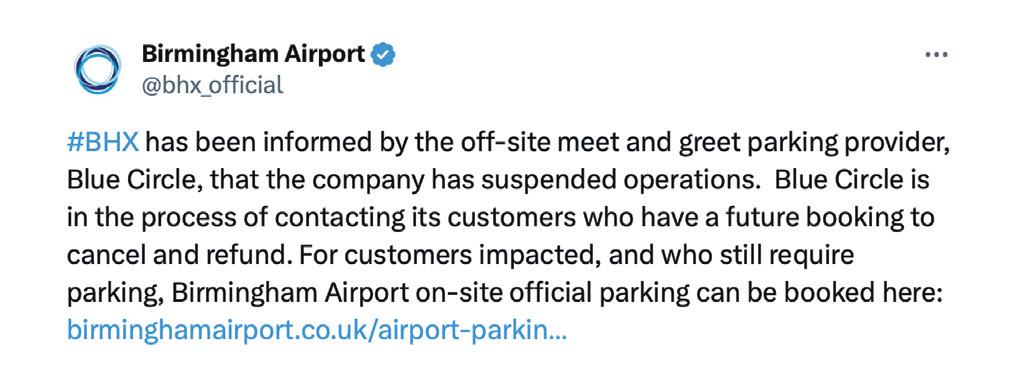
If you’re booking a taxi to take you to the airport, check to see whether the fare includes or excludes any drop-off fees to avoid any nasty surprises upon arrival. Birmingham
NEWS PARKING REVIEW | 17
21 May
Airport tweet
of
RAC
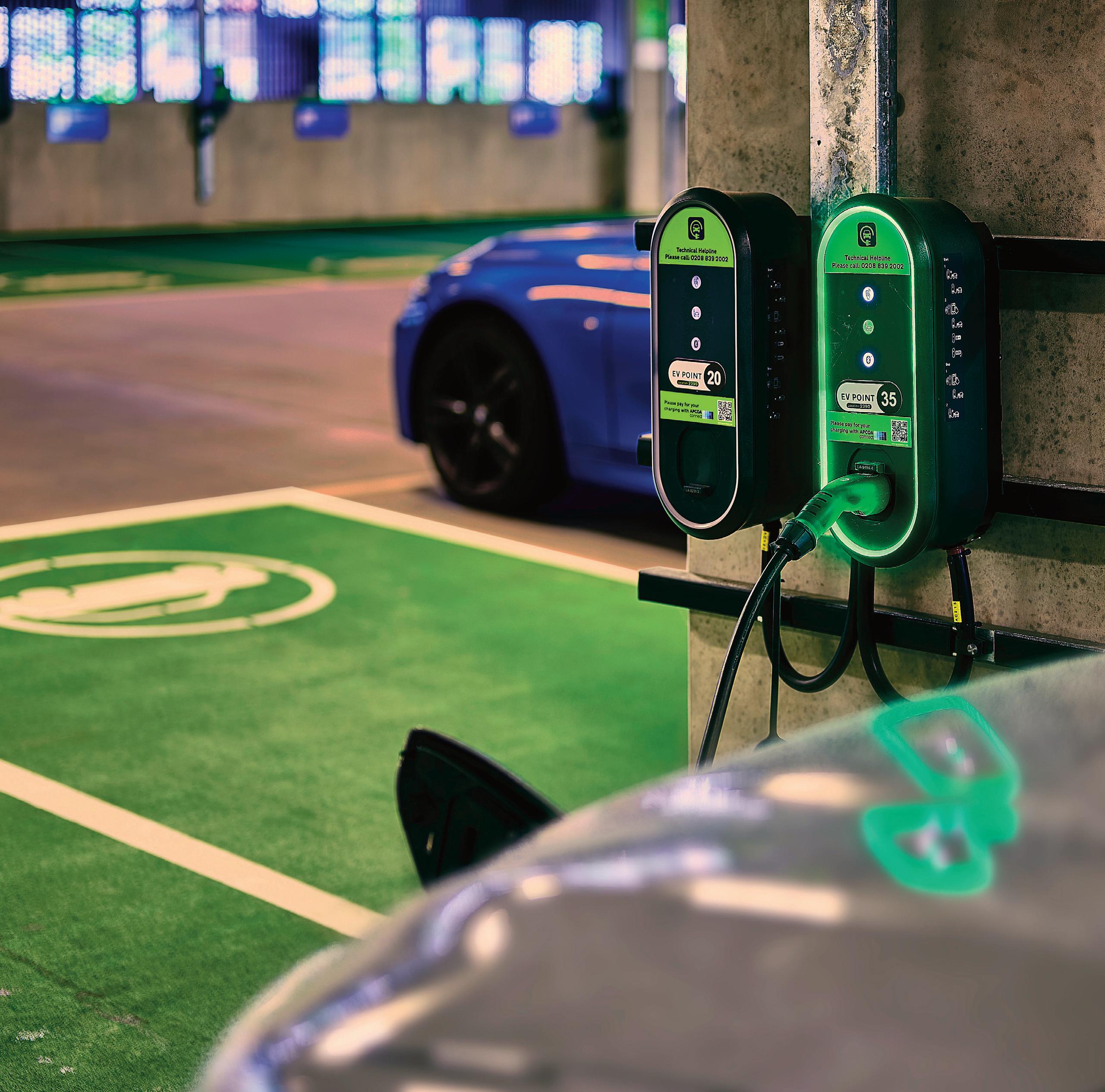
Compleo chargers come with reliability built in. We achieve 99.7% uptime, so your chargers work e�ciently, giving your customers the power they need, when they need it.
We o昀er a complete EV charging solution, with a range of AC and DC chargers suitable for every environment along with powerful software to manage your network . What’s more, our API integration means our chargers work seamlessly with your existing payment systems and apps.
All of which means it is easier to generate revenue for your business, when you partner with Compleo. Call 01235 355190 or visit compleocharging.co.uk/parking

The power to move
Reliable EV charging doesn’t have to be complicated
Compleo unveils ground-breaking new high-power EV charger at Parkex 2024
Setting new standards for performance and reliability, Compleo’s ground-breaking eTower 200 made its public debut last month at Parkex, and is set to revolutionise the UK’s EV charging landscape
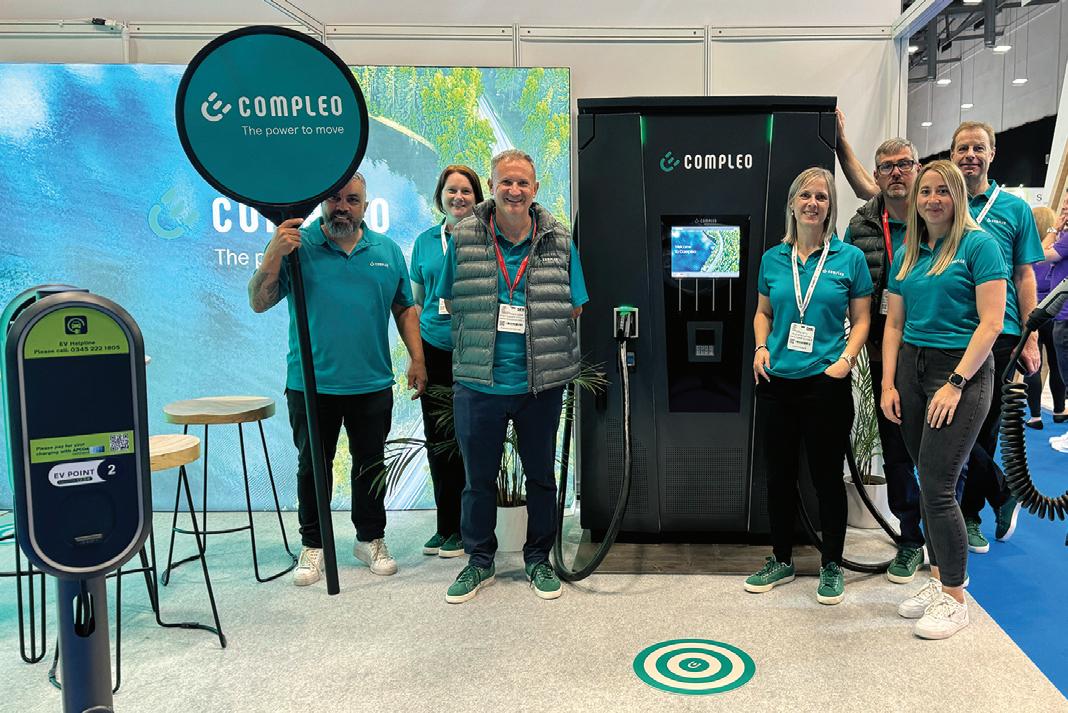
Designed to bring ultra-fast 200kW charging into the tightest of spaces, Compleo’s new high power charger is the smallest and quietest ultra-fast charger on the market, making it ideal for installation in underground or multi-storey car parks.
With its user-friendly design and functionality – including highlyvisible LED indicators showing state of charge for each charging vehicle and integrated chip-and-pin payment terminal – the eTower 200 provides a consistently better experience for drivers, charge after charge.
Simplicity, flexibility and reliability across the range
The flagship eTower 200 sits at the top of Compleo’s comprehensive range of AC, DC and HPC chargers, which are all designed and manufactured in Germany to deliver impressive performance without compromise.
Compleo’s rapid DC charging stations deliver up to 50kW and are ideal for short-term parking or for when drivers simply need to charge and go.
Perfect for when visitors are staying longer – and with thousands of units in operation at car parks across the UK and Europe – Compleo’s new generation eBox chargers delivers up to 22kW AC and can be pole or wall mounted to save space, in either single or twin configuration.
With its innovative eClick system, installation of Compleo’s eBox is quick and easy. Once connected and after the most basic of training, anyone can install or change a unit in seconds, without the need for tools or an electrician.
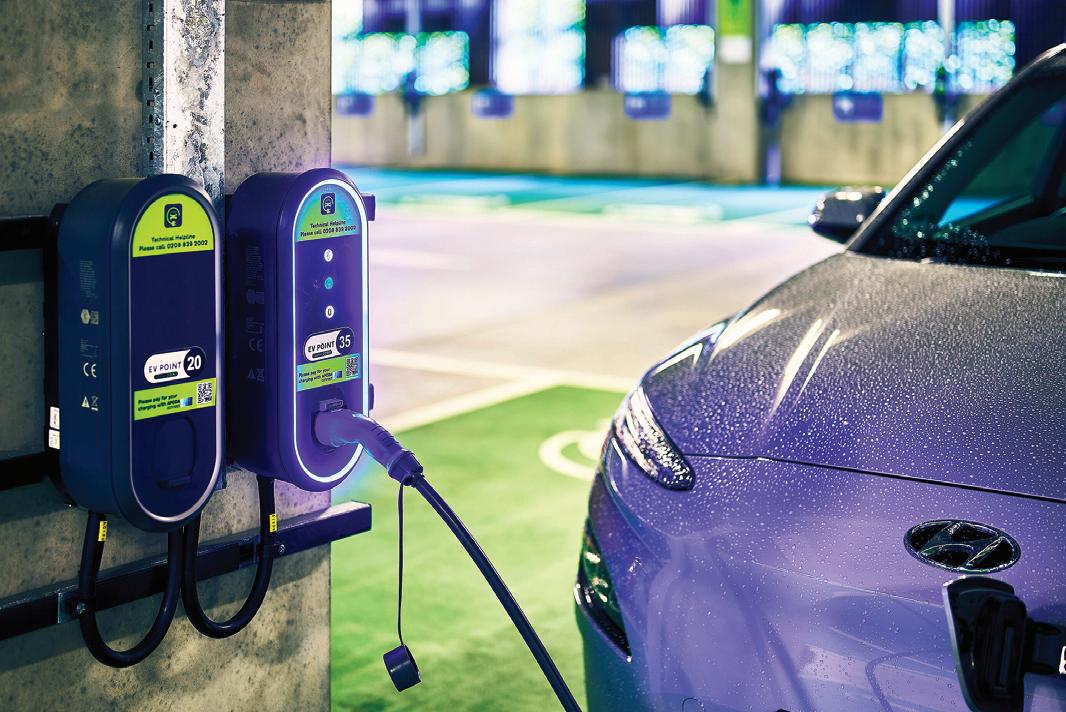
Testament to the robust German engineering that sits behind every Compleo charge point, APCOA has chosen Compleo eBox charge points for its managed car parks across the UK, where they typically achieve 99.7% uptime.
Park and charge in a single transaction
The ability to integrate with any payment system is a feature common across Compleo’s entire range of charge points, making it easy for operators to add EV charging to their car parks.
With seamless API integration, car park operators can set their own tariffs and enable customers to pay for parking and charging in a single transaction, and via any existing app or payment terminal.
Expert guidance and support from UK-based team
Compleo makes it easy for operators to add EV charging to their car parks and drive additional revenue through their business with efficient, reliable and hassle-free solutions.
Based in Abingdon, Oxfordshire, their friendly team of experts offers guidance and support throughout the entire process, from assessing needs to installation, connection and beyond.
ADVERTISING FEATURE
For more information, visit compleocharging.co.uk/parking Alternatively, call on 01235 355190
Our award-winning AI: Expertly handles your PCN calls and webchats. Increases payments. Reduces challenges.
PCN? I can help! PARKING TECHNOLOGY PARKING TECHNOLOGY PARKING TECHNOLOGY
Contact us for a demo: info@barbourlogic.co.uk Working with 60 UK partners Got a


Investing in investigation
Car maker JLR commits £1m to support police in tackling vehicle thefts
Car maker Jaguar Land Rover (JLR) is investing more than £1m in support of proactive policing to tackle the organised crime groups targeting vehicles in the UK. JLR said its investment will support several police forces with additional, dedicated resources to respond to vehicle thefts in hotspots across the country, as well as a new national policing unit to gather intelligence. This will inform increased activity at the ports exploited by criminal gangs to export vehicles, including stolen Range Rovers.
The funding will give specialist officers more capacity to investigate vehicle crimes. Pilot operations with two police forces have already resulted in stolen vehicle recoveries and arrests. In addition to its direct support for operations against vehicle thieves, JLR UK is supporting UK authorities by sharing vehicle location and telematics data, which aids prosecution and vehicle recovery efforts. As part of this, JLR has trained more than 650 officers to assist the search of recovered stolen vehicles and seizure of the tools used.
Patrick McGillycuddy, managing director of JLR UK, said: “We are constantly developing our systems and security features and through our close collaboration with police, we stay ahead of any emerging methods and quickly deploy anti-theft measures.
“This additional investment, coupled with our other ongoing and proactive action, shows our commitment to supporting the authorities in having a tangible impact on combating this issue in the UK.”
The company is keen to counter a perception that its high value Range Rover models are easy to steal. JLR said it is constantly developing its systems and security features and through close collaboration with police seeks to stay ahead of emerging methods and quickly deploy anti-theft measures.
According to Auto Trader data, the average price of a used Range Rover has fallen 9.3% since May to £35,224, compared with declines of 5.7% for all luxury SUVs and 2.8% for all cars. JLR cites police data from UK ports that shows the number of stolen Range Rovers discovered was down almost half – 49%, in 2023, compared to 2022.
The company said the latest generation of JLR vehicles is highly resilient to thefts: Police National Computer (PNC) data show since January 2022, only 0.2% of new Range Rover
and new Range Rover Sports have been stolen, while only 0.3% of new Defenders have been affected since launch in 2020.
JLR says it has adopted a multifaceted strategy to tackle vehicle thefts and the impact on insurance premiums for its clients. For clients of previous-generation vehicles, including those out of warranty, JLR has invested £15m to update vehicle security –giving them the highest possible levels of protection. In October 2023, JLR introduced Jaguar Insurance and Land Rover Insurance, to help new and existing owners obtain competitive cover – in particular those clients looking for Range Rover insurance. It has already provided more than 46,300 quotes, with an average quote premium of £183 per month.
Jaguar Land Rover is a wholly owned subsidiary of Tata Motors, part of Tata Sons.
 Patrick McGillycuddy
Patrick McGillycuddy

CAR CRIME PARKING REVIEW | 21
Felixstowe port during a JLR-backed police investigation JLR UK
Q-Park is building a greener business
Operator publishes corporate social responsibility report
Q-Park is promoting sustainable mobility by offering electric vehicle chargepoints and reducing its energy consumption, the car park operator’s new corporate social responsibility (CSR) report states.
The company operates in the Netherlands, Germany, France, Belgium, United Kingdom, Ireland and Denmark. The Q-Park is present in over 320 cities, operates more than 3,600 parking facilities comprising over 706,000 parking spaces.
Urban Liveability, the CSR report, states: “Our purpose is to enhance urban liveability and connect communities by providing sustainable mobility solutions and seamless parking services. Our vision is to be the most preferred sustainable mobility hub partner by 2030.”
Q-Park has been reporting annually on sustainability since 2011. In the early years, it was focussed on raising awareness and integrating sustainable development in its day-to-day business. From 2017 onwards, it has focussed more on developing and implementing shared solutions after the company identified how it could contribute to achieving the UN Sustainable Development Goals (SDGs) and its role in helping society progress towards Europe’s
Q-Park acquires Britannia Parking
Q-Park has acquired Britannia Parking Group. Britannia Parking has a national footprint consisting of over 600 car parks which range from multi-storey parking facilities to surface car parks.
Britannia’s automatic number plate recognition (ANPR) systems are managed from a CCTV and control room at the company’s Bournemouth base. As well as owning and leasing their own parking facilities it also manages car parks on behalf of landowners. Its clients included investment funds, independent property developers, pubs and retail parks. After a due diligence process Q-Park reached agreement for the full purchase of Britannia Parking and completed the deal on the 4 June.
Adam Bidder, managing director of Q-Park UK said: “We are absolutely delighted to be able to confirm the acquisition of the Britannia Parking business. They are a successful and commercially solid business which made them a perfect acquisition target and we welcome our new colleagues to the Q-Park family.”
CSR REPORT 2023
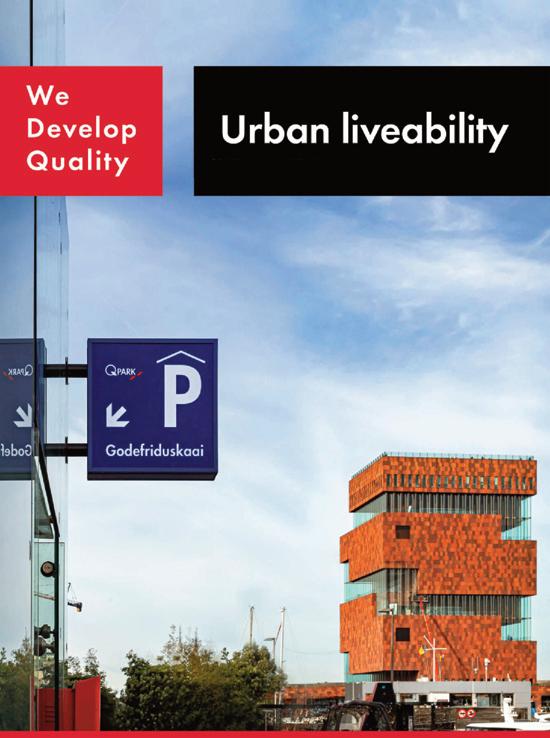

aim to be climate neutral by 2050.
The Urban Liveability report is structured around the company’s CSR Strategic Framework. It includes a ‘double materiality’ analysis via which it has defined key sustainability matters, ambitions and three focus areas. The framework supports the process to being EU Corporate Sustainability Reporting Directive (CSRD) compliant.
Q-Park launches charging
The company says it is reducing its energy consumption and carbon footprint. The carbon footprint per parking space in operated parking facilities is lower compared to 2022.
In 2023, the average kgCO2 per parking space was calculated to be 45.4 (2022: 48.3). The company says that since it started measuring its emissions in 2010 it has achieved a 75% reduction in carbon footprint per parking space.
Q-Park says mobility transition means supporting the electrification of the car fleet in western Europe by significantly increasing the number of EV charging points installed in its parking facilities. The company is investing significantly to expand their EV charging offering, resulting in:
• 4,114 EV chargepoints (2022: 2,831), an increase of 45%;
• 283 parking facilities offering EV charging (2022: 235), an increase of 20%.
The total energy consumed in its operated parking facilities amounted to 88.4GWh compared to 95.8 GWh in 2022, a decrease of 8%. Q-Park said it is also contributing to the energy and mobility transition by transforming search traffic to destination traffic and is enhanced with:
• 506 parking facilities offering online prebooking, an increase of 6% on 2022
• 225 parking facilities near public transport hubs, an increase of 2%.
point hub in Manchester
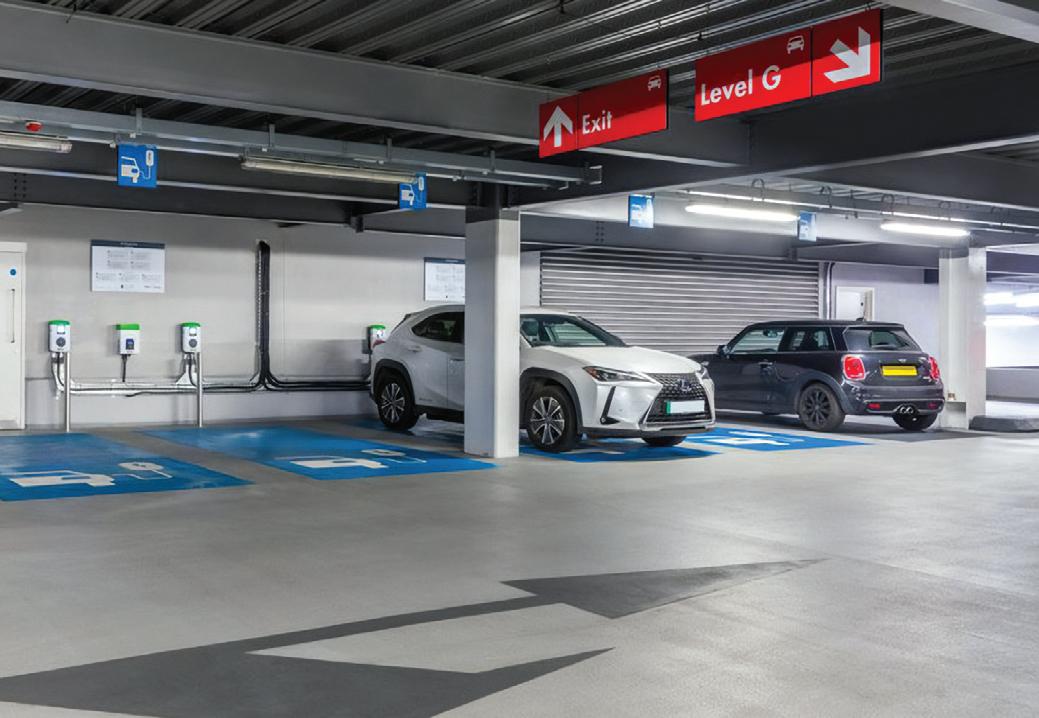
Park Deansgate North, Manchester’s largest urban charging hub. The speed at which we have installed more based on their overwhelming popularity clearly demonstrates how Q-Park are right at the forefront of the parking industry when it comes to EV charging.”

An electric vehicle charging hub has been opened at the Q-Park Deansgate North car park in Manchester.
Q-Park has operated the 455space facility since 2017 after being involved in the design and construction of the facility, which is located underneath the new Embankment development.
Deansgate North is located near the Manchester Arena, The Arndale Centre and Manchester Victoria Station.
Q-Park operates seven parking facilities comprising of nearly 3,000
parking spaces in the city,
The 41 charger facility at Deansgate North means the car park operator operates over 100 EV charging points across Manchester. The new charging infrastructure includes the latest in contactless payment technology which were initially installed and commissioned prior to the new government legislation being announced.
John Denton, head of commercial at Q-Park UK, said: “We are absolutely delighted to now have over 100 EV charging points in Manchester city including 41 at Q-
Q-Park is currently investing over £3m in the UK and Ireland on the roll-out of over 600 electric vehicle charging points across its portfolio of parking facilities. The results of this project saw Q-Park win the Best EV Chargepoint Provider Award at the EVolution Awards 2023.
Q-Park chargers in Manchester
• Q-Park Deansgate North – 41 EV charging points
• Q-Park First Street – 18 EV charging points
• Q-Park Manchester Hospitals – 4 EV charging points
• Q-Park Piazza – 26 EV charging points
• Q-Park Piccadilly Place – 10 EV charging points
• Q-Park Waterside – 8 EV charging points
• Q-Park Wilmslow Park – 4 EV charging points.
BUSINESS NEWS 22 | PARKING REVIEW
Q-Park Deansgate North
ANNUAL
AppyWay completes crowdfunder
Kerbside technology firm raises over £900k via online funding call
AppyWay has raised over £900,000 via a crowdfunding exercise. The UK company’s systems integrate cashless payments, detailed parking and loading maps, and occupancy data.
The kerbside technology company has attracted £912,116 via Crowdcube from 218 investors. Interest in the company saw pledges exceeding the £600,000 initially being sought by 156%.
The funding will be invested in sales and marketing scaling operations to support a growing customer base as well as preparations to enter international markets.
Customers include Direct Line, Motability, ARM, BT, Connected Kerb and Motability Operations, as well as a number of UK local authorities including Edinburgh, North Yorkshire, Lambeth and Transport for London Launching the funding offer in March, Dan Hubert, founder

CMA reviews EasyPark’s plan to buy Flowbird
The Competition and Markets Authority (CMA) is investigating EasyPark’s plan to buy Flowbird.
The CMA is considering whether the planned acquisition by EasyPark Group AS of Mobility 1 SAS (Flowbird) would lead to a substantial lessening of competition within any market or markets in the United Kingdom for goods or services. To assist with its assessment, the CMA has asked for comments on the transaction from any interested party.

and chief executive of AppyWay, said: “Recent government legislation on digital roads mandates that all authorities embrace the digital kerbside.
“Fortunately, AppyWay has spent the past decade building their technology precisely for this moment. Today, this unique platform is strategically positioned to capitalise on this digital revolution and scale across the UK and beyond.
Whittaker is new sales director at Concrete Preservation Technologies
• AppyWay has joined the Open Mobility Foundation, an organisation linking over 50 municipalities in the USA who are exploring shared transportation ideas.
Dan Hubert said: “We join a roster of blue-chip technology providers. Our leading digital kerbside platform is internationally ready to decarbonise cities from the curb/kerb up. God bless America.”
An EasyPark spokesperson told Parking Review: “As communicated in November 2023, we are excited about the intended acquisition of Flowbird, pending customary approvals from relevant competition authorities. We have been working with the UK Competition and Markets Authority and providing necessary information as part of their review process. At this time we are unable to share further details. We will provide updates when they become available.”

for almost three decades and is the author of a number of industry publications.

Tim Whittaker has become sales director of Concrete Preservation Technologies (CPT), a company working in the structural renovation sector. Whitaker joins CPT after most recently serving as managing director of USL Group.
His experience of concrete repair and electrochemical techniques goes back to the mid-90s when he was involved with electrochemical chloride extraction and sacrificial anode use in car park repair schemes.
Whittaker has maintained a working relationship with CPT for 25 years and became a strong advocate of galvanic cathodic protection.
With a BSc (Hons) Degree in Building Surveying, Whittaker has operated within the field of property refurbishment, structural repair, waterproofing and corrosion control
He said: “When presented with the opportunity to join the team at CPT I absolutely jumped at the chance. I have known the founders of the company for many years and was extremely excited to hear the plans that have been put in place to sustainably grow the business, both in the UK and internationally.
“The product range and market leading testing services offered by CPT are truly niche and help customers comprehensively understand their structure before committing to any repair strategy. The team here at CPT are true building pathologists, forensically investigating modes of concrete deterioration and allowing built environment stakeholders to essentially ‘see the unseen’.”
CPT managing director Adrian Roberts said: “We are absolutely delighted to have Tim join us to head up our sales team bringing with him his huge wealth of experience. We look forward to further successes and continued sustainable growth as CPT evolve.”


IPC promotes Jarrett and Naylor
The International Parking Community (IPC) has promoted two of its key managers.
Vicky Jarrett is now head of compliance, a role that will see her ensure members adhere to the association’s code of conduct.
Chris Naylor has become head of membership and relations, a role which will see him building and maintaining relationships between members, partners and interested parties as well as looking after the strategic growth of the IPC.
Parkopedia wins automotive awards
Connected parking services provider Parkopedia won four categories at the Just Auto Excellence Awards 2024. The annual awards are organised by automotive industry news service Just Auto.
The company won trophies for Innovation, Business Expansion, Product Launches and Research & Development.
The judges said: “Parkopedia is a winner for its strategic advancements in EV charging, in-car payment technology and efforts to refine driver data and experience.”
BUSINESS NEWS PARKING REVIEW | 23
Dan Hubert
Tim Whittaker
APCOA mentors London businesses
Parking operator builds on connections made at Heathrow summit
As part of its commitment to Heathrow Airport’s environmental strategy, parking contractor APCOA UK is mentoring a group of west London businesses.
APCOA UK is working with five of the small and medium enterprises (SMEs) that attended the Heathrow Business Summit, which highlighted ways in which local firms can help Heathrow to grow sustainably.
The companies are NU Electrics, Focused Futures Consultancy, Seetec Pluss, PowerQuad and Booni Box.
By offering a dedicated APCOA mentor to each of these five local businesses, APCOA is helping them to grow and become ‘Fit to Bid’ over the next 12 months by supporting each one with a bespoke ‘actions tracker’ targeting business development, compliance, governance, public relations and media.
APCOA says feedback has

been positive. One business commented: “We are happy to be working closely with APCOA and Heathrow. This is a wonderful opportunity that I know that we are all grateful for.”
Another mentee said: “I feel extremely grateful that we have been selected for this pro -
Richmond upon Thames awards APCOA enforcement contract
The London Borough of Richmond upon Thames has awarded a parking enforcement contract to APCOA UK.
Enforcement of controlled parking zones (CPZs) make the borough safer for pedestrians and accessible to emergency and refuse vehicles at all times, as well as preventing all-day commuter parking and reducing the number of abandoned vehicles.
Paul Chadwick, executive director for environment and community services, Richmond Council concludes: “Richmond Council prioritises helping our residents to use forms of travel that support our environmental and health goals, particularly moving safely around our borough on foot – ensuring our parking options are used in a controlled way is essential to facilitating this.
“We are looking forward to working with APCOA and are
pleased to partnering with an organisation who shares our commitment to reducing the carbon impact of our operations.”
From August, APCOA civil enforcement officers will patrol the borough either on foot or using an all-electric fleet of bikes, mopeds and vehicles. The use of electric vehicles is designed to improve the sustainability of operations and support wider environmental, social, and governance (ESG) commitments.
Kim Challis, APCOA’s regional managing director UK and Ireland, said: “A controlled CPZ is an important strategy in managing unauthorised or anti-social parking and we are pleased to be working in partnership with the London Borough of Richmond, using our experience and expertise to deliver a first-class service for residents and visitors alike.”
gramme and I am committed to doing my part in making it as successful as possible.”
The mentoring project is supported by Simon Butterfield, Heathrow’s head of procurement (operations). The Heathrow Business Summit is an annual event that features
presentations from Heathrow’s senior representatives and key suppliers showcasing procurement prospects, offering an opportunity for local SMEs to find out how they can work with the airport and its contractors. The 2024 summit takes place later this year.
Wandsworth calls in APCOA
The London Borough of Wandsworth has awarded APCOA UK a parking enforcement services contract.
Commencing on 1 August, the contract centres around on-the-ground enforcement of the borough’s parking regulations by APCOA civil enforcement officers (CEOs).
The CEOs will address high polluting incidents of engine idling by informing drivers of the environmental impact and will also carry portable air monitoring devices, gathering data to inform the council’s ongoing focus on improving air quality for its 329,000 residents.
APCOA CEOs will operate in the borough seven days a week enforcing Wandsworth’s parking regulations, put in place to keep traffic moving safely to maintain access for emergency vehicles and to ensure that parking is fair and equitable for both residents and visitors. Where necessary, CEOs will have the ability to
report vehicles for re-location and removal.
The patrols will also contribute towards the council’s focus on sustainability by covering the borough on foot or using an all-electric fleet of e-bikes, electric scooters and electric vehicles.
Wandsworth’s cabinet member for transport, Cllr Jenny Yates, said: “We are looking forward to working with our new parking contractor APCOA and we welcome their commitment to decarbonising their operations.”
APCOA’s regional managing director UK and Ireland Kim Challis said: “With a vast amount of experience in deployment and outstanding levels of expertise and customer service, we are looking forward to working in close partnership with the London Borough of Wandsworth to deliver an innovative and sustainably focussed service.”
BUSINESS NEWS 24 | PARKING REVIEW
The APCOA team with their business mentees
Milton Keynes extends Egis UK contract
Digital enforcement operation uses
Dispatch solution
Egis UK has had its digital parking contract with Milton Keynes Council extended by three years.
Egis is an architectural, consulting, construction engineering and mobility services business. In 2018, Milton Keynes appointed Egis to deliver a digital parking enforcement operation across 21,000 parking spaces in the city. The contract has led to a positive shift in driver behaviour, delivering a 13.3% increase in compliant parking revenue compared to pre-pandemic levels.
The adoption of Egis’ digital solution has helped the council improve the efficiency of enforcement officers, with every civil enforcement officer (CEO) seeing an increase in hourly parking charge notice (PCN) issuance rate. This resulted in a 53.6% increase in total PCNs issued by the
An Egis scan car

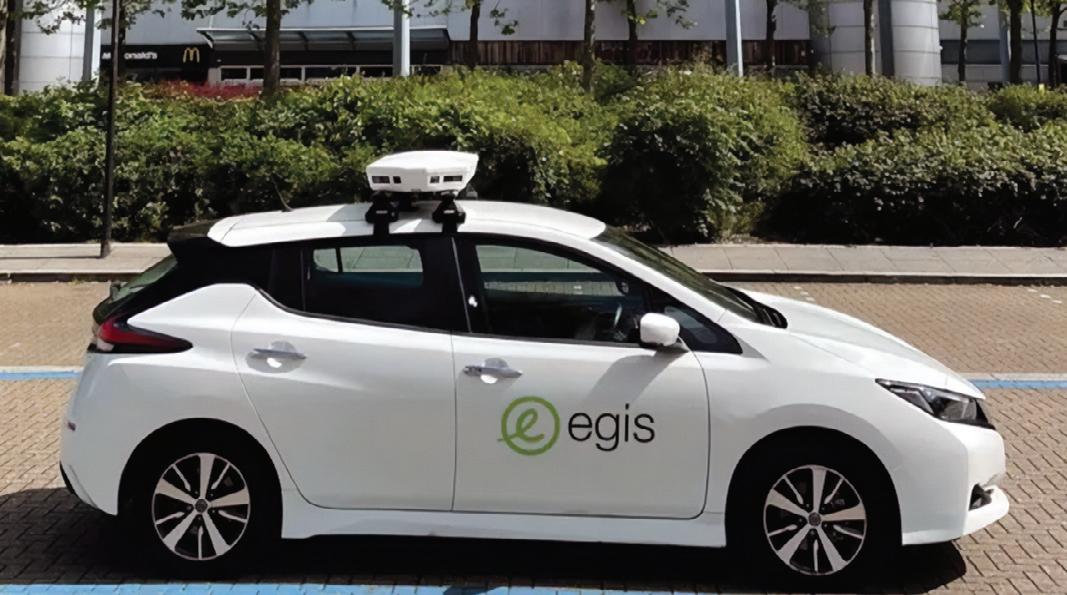
existing workforce.
Under the contract extension Egis will continue to deliver the suite of technologies. These solutions include Egis’ Dispatch software and automatic number plate recognition (ANPR) car, which detects parking contraventions by digitally scanning around 750,000 vehicles per month within a scheduled patrol area.
The Dispatch solution has been used by Egis in 21 cities across Europe, where it manages over 250,000 parking spaces. Milton Keynes City Council became the first place
PayByPhone hires new technology lead

Mobile parking payments provider PayByPhone has appointed JeanPierre LeBlanc as chief technology officer.
LeBlanc is responsible for leading PayByPhone’s global technology team to support the company during its next period of growth.
A Canadian, LeBlanc joins PayByPhone from Pagefreezer, and brings over 20 years’ executive experience from renowned global companies in the software and mobile marketplaces including Borland, Nokia and Alcatel-Lucent. Most recently, he held CTO positions in the transportation and mobility space with DDS Wireless and PBSC Urban Solutions. He has worked in multiple countries: Canada, China, Finland, France, Switzerland and the USA.
LeBlanc said: “I am thrilled to be
joining PayByPhone at such an exciting time under its new ownership. I thrive on creating and delivering compelling and innovative products and I am looking forward to evolving PayByPhone’s offering to help our users truly simplify every step of their journeys.”
LeBlanc takes over from Chris Spacagna who was interim chief technology officer during the recruitment phase. Spacagna reverts to his role as senior director, software development, reporting to LeBlanc.
LeBlanc joins the PayByPhone management board and will report to Stuart Houlston, chief information officer, international fleet at Corpay, PayByPhone’s parent company.
Jonny Combe, PayByPhone chief executive officer, said: “Jean-Pierre has the passion and innovative mindset to drive our business forward and we are delighted to welcome him to the team. He brings a wealth of experience to PayByPhone and has a proven track record of leadership in technology, having delivered many first-of-kind and market-leading commercial products. This is an appointment our users, clients and authorities will certainly see the benefit of.”
in the UK to benefit from Egis’ experiences of cities such as Paris and Amsterdam.
Paul Harrison, network and enforcement manager at Milton Keynes City Council, said: “Egis has been instrumental in driving innovation and efficiency in our parking services since the start of our partnership.
“We continue to see drivers across the city become more compliant with parking regulations, which is due to the increased efficiency of our enforcement officers and the visual deterrent of the scan cars.

“The extension of our contract reflects our confidence in Egis’ expertise and their ability to deliver transformative solutions that align with our smart city objectives. Together, we are committed to creating a more seamless and sustainable urban mobility landscape for the benefit of all.”
Nigel Coltman, project director for mobility services at Egis, said: “We are proud to continue our collaboration with Milton Keynes City Council in advancing digital parking solutions that not only improve operational efficiency but also contribute to a more sustainable and less congested urban environment. The success of this solution in Milton Keynes serves as evidence of its potential impact in other urban environments. By leveraging data-centric solutions and intelligence-led enforcement strategies, we aim to empower places to resolve parking challenges while promoting sustainable urban mobility.”
We currently supply and have vacancies around the UK for Permanent and Temporary positions:
• Civil Enforcement Officers
• Environmental Enforcement Officers
• Parking Back Office (Appeals/Notice Processing/Correspondence)
• Parking Change Management
• Interim Parking Managers
• Car Park Attendants/Marshalls/Stewarding
• Parking Supervisors (Both Enforcement and Back Office)
• Parking Management (Both Enforcement and Back Office)
• Heads of Parking/Directors
• Parking Technologies (Business Development and Project Managers/ Field Service Engineers/General Managers)
• Off Street Parking (Business Development, Contract Managers and Regional Managers)
• CCTV Operators – SIA and BTEC qualified
Looking for staff or need employment? Please contact our experienced team on:
Tel: 0203 668 5680
Email: parking@unity-recruitment.co.uk
Web: www.unity-recruitment.co.uk

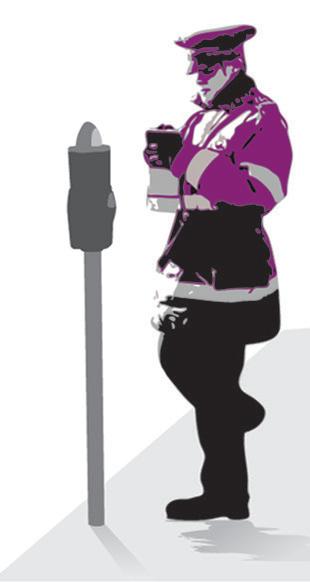


***Parking Experience Essential***
BUSINESS NEWS PARKING REVIEW | 25
 Peter O’Driscoll
Peter O’Driscoll

Creating space for change
Optimising parking occupancy will help improve the user experience, says RingGo’s Peter O’Driscoll
As the number of vehicles on the road continues to grow, so too do concerns around parking, especially for the UK’s towns and cities. In recent years, this growth in car ownership has been met with changes in consumer behaviour and a move towards purchasing increasingly large vehicles – which is further increasing the demand on the country’s parking facilities.
Against this backdrop, achieving optimum parking occupancy has never been more important. As well as ensuring that drivers can find parking quickly and efficiently, it can help to reduce congestion and improve traffic flow. Improving the parking experience also encourages repeat visitors, which could be essential to businesses and other organisations struggling against the tough economic climate.
Optimum parking occupancy is about more than just the number of car park spaces and the time between visitor turnovers. It is about the use of space and how it best supports a community or area, making it more liveable and accessible for all.
Getting the right balance
Over the years, there have been many different takes on what optimum parking occupancy looks like or how ‘full’ a car park can get without it becoming inefficient for the visitor. It’s a fine balance – if parking occupancy is too high, it can negatively
affect traffic performance in an area and create search traffic. However, if it is too low it is not impactful from a space utilisation perspective.
In the 1990s, Professor Donald Shoup of the University of Los Angeles (UCLA) conducted research using the well-known grid structure adopted by many US cities – where each block has 2025 parking spaces – and found that if there were always a couple of parking spaces available per residential block, there were no parking problems.
This led him to conclude that an 85% occupancy rate of onstreet parking spaces is what to aim for to avoid the congestion caused when the spaces are over 85% full, and drivers have to circle around looking for a free space.
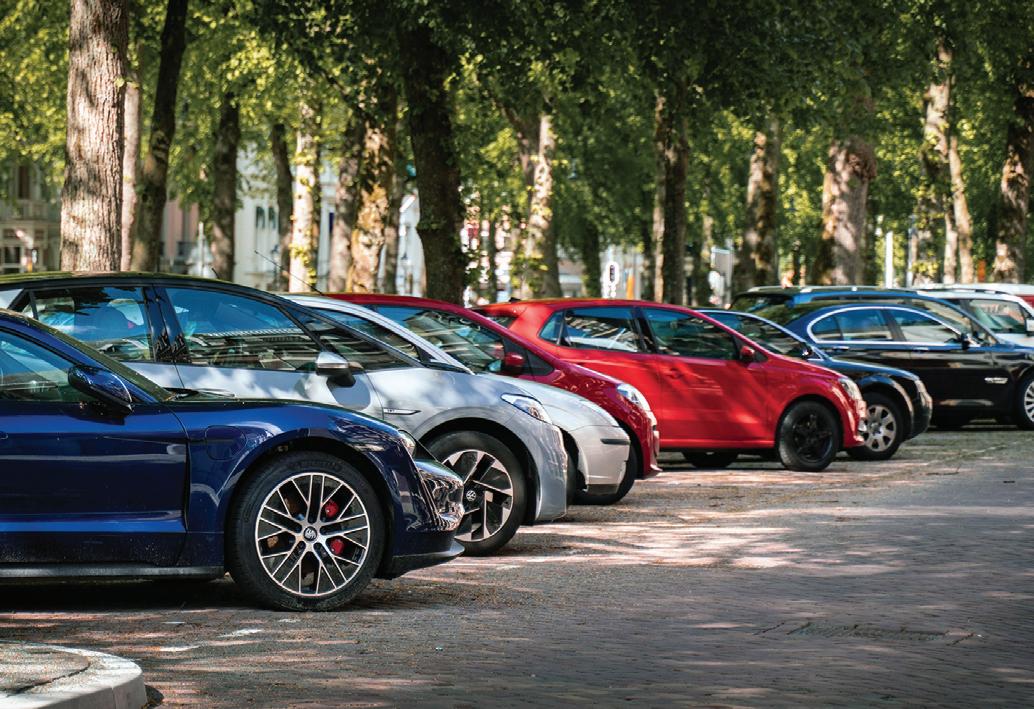

TRENDS
26 | PARKING REVIEW
Green and pleasant parking MICHAEL FOUSERT/UNSPLASH
Optimum parking occupancy is about more than just the number of car park spaces and the time between visitor turnovers – it is about the use of space and how it best supports a community
Peter O’Driscoll
Nowadays, the optimum parking occupancy level for both onstreet and off-street parking will vary greatly depending on location and function. For example, rail parking, in most instances, will be focussed on long-term stays for visitors who commute via train or take leisure trips. Therefore, a turnover rate of 1.5 vehicles per space each day would be expected, and occupancy rates will not change much. However, retail is a different ball game, with the turnover likely to be around eight vehicles per day at least.
With all this variation, the ideal occupancy rate can be difficult to measure. Most resources seem to agree that it sits between 8090% for most realistic scenarios. However, regardless of the percentage, the most important aspect of optimum parking occupancy is that the spaces are being used as efficiently as possible.
Achieving optimum
One way in which councils and car park operators can ensure that parking spaces are used appropriately and efficiently is by implementing policies. This could take the form of time-limited parking, permit parking or paid parking operators.
Putting a time cap on parking can be really effective. Setting a maximum time limit for parking in a particular area helps to ensure that parking spaces are available for an increased number of motorists throughout the day. It can also help to reduce congestion and wait times by encouraging drivers to move their vehicles after a certain amount of time. However, when implementing such guidelines, car park operators must be careful not to jeopardise the user experience. Motorists still need options and flexibility when it comes to parking. For example, they should be able to extend their stay should they need to.
The digitisation across the sector can enable councils and operators to use parking spaces effectively whilst still ensuring the user experience remains positive. For example, the increased use of applications to pay and manage parking means that local authorities can gather more data points and information about vehicle types, emissions and dwell times. These data points can form the backbone of transport strategy, enabling councils to make more informed decisions, especially when it comes to environmental policies and wider parking controls to make the UK’s cities more liveable.
However, optimising parking spaces – and increasing the liveability of our cities – shouldn’t just stop at implementing policies.
Reimagining space for the benefit of all
With the UK’s population growing by an average of 0.3% each year space has never been more premium. This is especially true in our cities and more urban areas.
There is an increasing pressure from all parties to ensure that any space is being used as efficiently and effectively as possible. As a result, many councils and businesses are reimagining kerbside spaces to revitalise retail and hospitality.
For example, four parklets have been installed in Hammersmith in central London as part of a larger initiative to encourage green spaces, cleaner air and promote cycling. Meanwhile, councils like Hounslow are engaging in public consultation to introduce


greenery to underused, unoccupied public areas historically reserved for parking.
Unsurprisingly, projects such as these are only increasing in popularity. Transforming these spaces within city environments is having a big impact in terms of the fight against climate change and making the streets greener for residents, shoppers and businesses.
A changing landscape
Optimising parking is essential to improve the user experience for both visitors and residents alike. The digitisation currently taking place across the industry offers unique insights to make significant – and informed – decisions about what users want to see. When used correctly these insights have the potential to not only improve the parking experience but totally transform our spaces, making them more efficient and more liveable.
Peter O’Driscoll is managing director of RingGo, a cashless parking solution used by in more than 500 towns and cities nationwide ringgo.co.uk
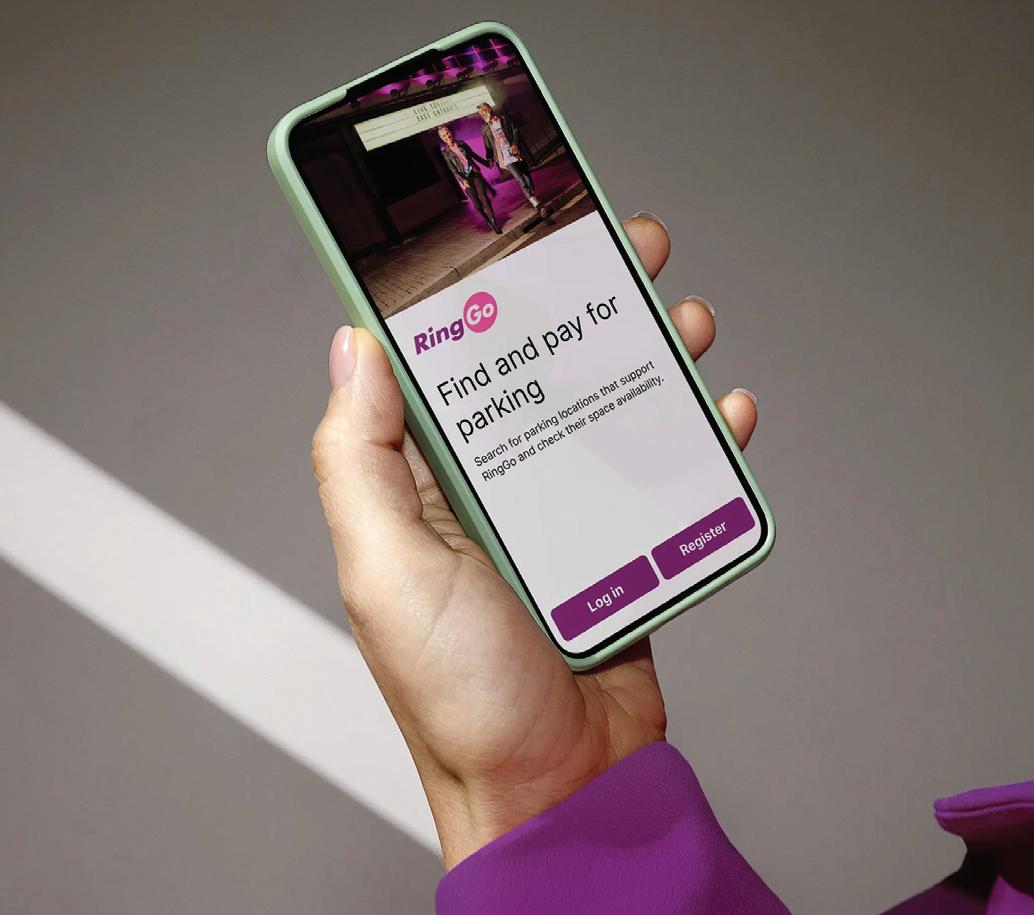

TRENDS PARKING REVIEW | 27
The connected driver is an informed and relaxed person
IVAN CAJINA/UNSPLASH
Chaos theory in action









See the categories and entry criteria at: www.britishparkingawards.uk ENTRY DEADLINE: 15 JULY Organised by Sponsored by Presented by THE AWARDS CEREMONY Friday 13 September, Royal Lancaster London Showcasing excellence, celebrating success

Meet the parking crew
Parking professionals gathered on the River Thames to launch the British Parking Awards 2024
The British Parking Awards 2024 were officially launched aboard a riverboat sailing on the River Thames. The cruise was a spectacular showcase of London at its best, with the Houses of Parliament, London Eye, The Shard, HMS Belfast, The City, Docklands, Greenwich and the South Bank all looking luminous in the evening sunlight.
The competition was created and launched by Parking Review magazine back in 2002 to celebrate achievement and showcase best practice. The competition now encompasses the interlinked worlds of parking, connected vehicles and e-mobility.
The classic competitive categories recognise inspiring individuals, dedicated teams and partnerships, ground breaking technologies, effective communication, community engagement, and excellent car park structures.
This year the Parking Rosettes strand will focus on two themes that showcase the positive and progressive aspects of parking in the form of a Connected Vehicles Award and the Accessible Parking Award
As the competition celebrates its 22nd year it continues to reflect the way in which the sector is evolving, as seen in the EVolution Award, dedicated to electric vehicle infrastructure.
The entries are assessed by a jury made up of people with a background in parking, transport, technology and communications. They will draw up the short list and then decide the eventual winners, including the recipient of coveted MiPermit Inspiration Award.
Entry to the competition is free. Check the official website for deadlines and advice on how to submit your entry packs.
The finalists will be revealed in August and they will go forward to the British Parking Awards ceremony, which is held at the Royal Lancaster London on Friday 13 September
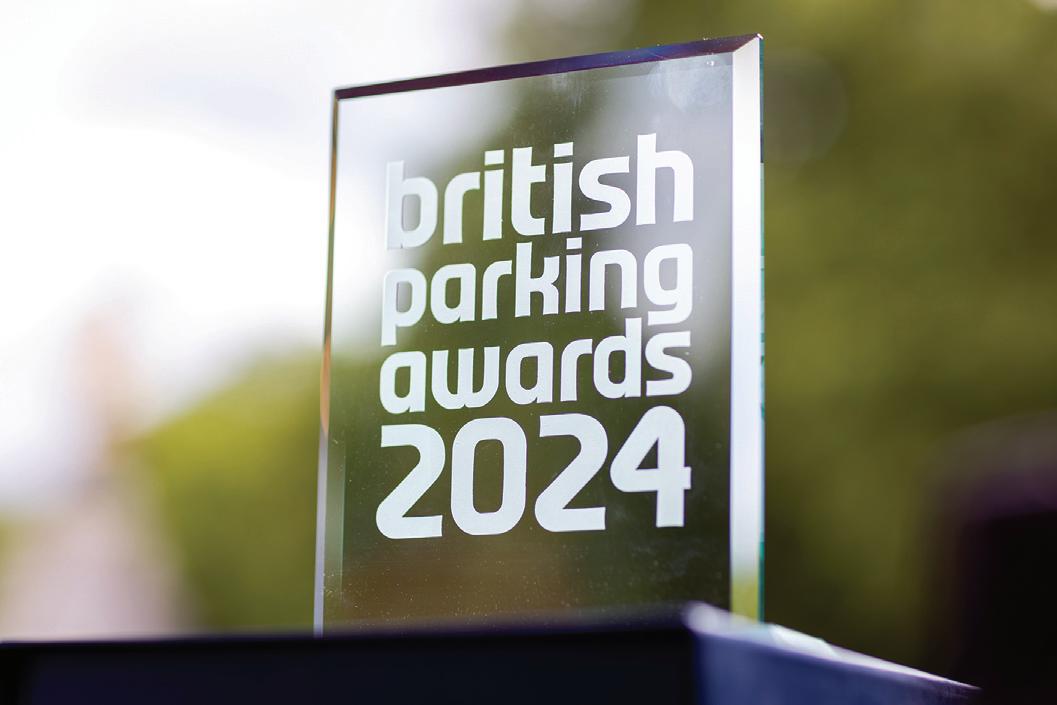
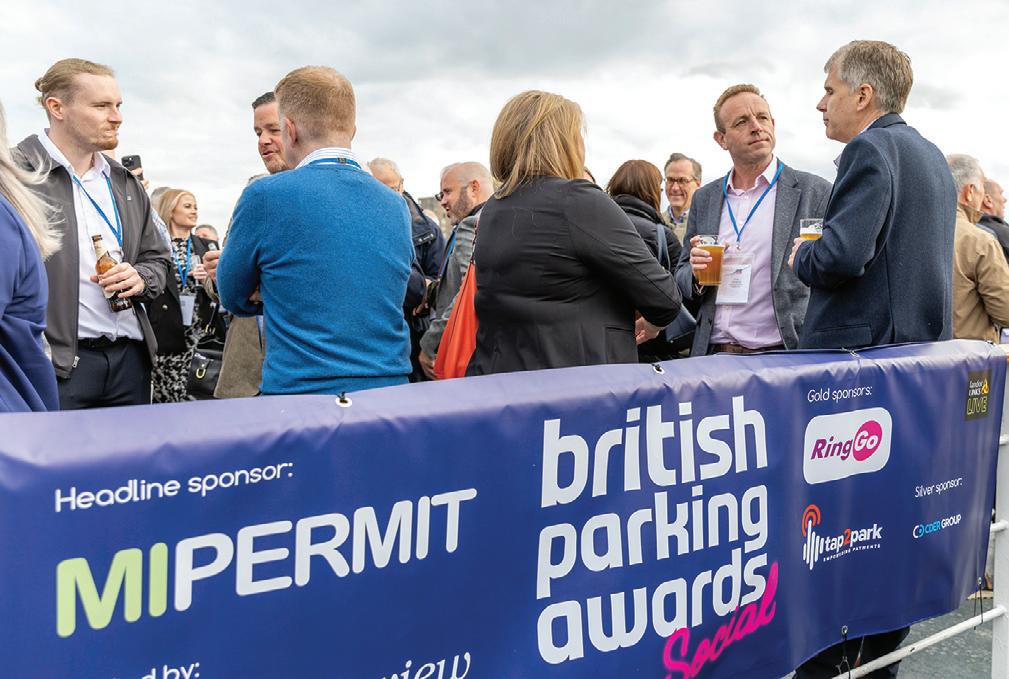
BRITISH PARKING AWARDS PARKING REVIEW | 29
MATTHEW WALKER PHOTOGRAPHY www.britishparkingawards.uk
BRITISH PARKING AWARDS

ALL ABOARD! The British Parking Awards Social saw parking professionals from across the on-street and off-street sectors gather for a voyage on the good ship Golden Jubilee on a summer’s evening where the rain clouds parted and the sun showed its face. The 170 people gathered aboard enjoyed an evening catching up with old friends, and making new ones, while comparing notes on their ideas for entries to the 2024 competition with Parking Review editor Mark Moran.




30 | PARKING REVIEW MATTHEW WALKER PHOTOGRAPHY
Competitive categories
Parking Person of the Year
The Parking Person of the Year award is open to all local authorities and private operators that may nominate an individual parking employee who has consistently made an outstanding contribution to the industry and represents a ‘model of excellence’.
Rising Star Award
Recipients may be young employees or recent joiners of any age. Local authorities and private operators can nominate an individual parking employee, consultant or contractor who has consistently made an outstanding contribution to their team and the wider parking sector.
Parking Team of the Year
The Parking Team of the Year Award recognises the excellent work of both on-street and off-street parking operations. It is open to teams working in both the public and private sectors.
Parking Operator of the Year
This category is open to new and established car parks owned by either the public or private sectors. The award recognises car parks that are managed, designed and maintained in a way that makes the start and end of each driver’s journey a pleasant experience.
Communication Award
Recognising imaginative, engaging and informative approaches to communicating with the public and other organisations through advertising campaigns, websites, social media and publications.
The Back Office Award
The Back Office Award recognises the excellent work of back office teams working for local authorities, private parking operators, transport consultancies and civil enforcement agencies.
The Front Line Award
Dedicated to parking personnel who engage with drivers and the general public as a part of their day-to-day activities, this award will recognise excellent customer service, communication and community engagement.
Parking Partnerships Award
The Parking Partnerships Award recognises the importance of partnership working in the parking sector. The partnership may involve pairings or groups of local authorities, companies, professional bodies, campaign groups and other stakeholders.
Parking in the Community Award
Parking is an essential service and can be a positive contributor to local communities. This award recognises people working within the parking sector who have engaged with and supported their local communities.
Parking Technology Award
The Parking Technology Award recognises advances in the systems used to manage parking. The innovation will be a piece of parking hardware, a device or a wider system that makes the management of parking more efficient and/or customer-friendly.
Best New Car Park
The Best New Car Park Award is a site-specific category that recognises outstanding design and construction techniques that turn car parks into landmark structures.
Car Park Renovation Award
The Best Car Park Renovation Award reflects how car parks can be transformed into inspiring buildings with a genuine social value and can host a variety of uses.
Traffic Team Award
The new Traffic Team category recognises the skills and achievements of organisations responsible for implementing traffic and parking schemes such as CPZs, TROs, permit schemes, payment systems, EV charging and a host of other essential services – including planners, engineers, consultants and contractors.
Special awards
A trio of trophies presented to people and projects that have made a real difference and positive contribution to the world of parking.
MiPermit Inspiration Award
The MiPermit Inspiration Award recognises individuals and organisations that have made a significant contribution to improving parking. Inspiration Award recipients are exemplars of excellent practice that have inspired colleagues, clients and the wider parking community.
Lifetime Achievement Award
The Lifetime Achievement Award will be presented to a parking professional who has made an outstanding contribution to the sector over the course of their career. Parking organisations and professionals are invited to nominate an individual who has consistently made an outstanding contribution to the industry and represents a 'model of excellence' across their entire career.
Special Jury Award
The Special Jury Award is presented to a scheme, project or person that has particularly impressed the British Parking Awards jury, which is a panel of experts drawn from across the parking, automotive, transport and related sectors.
Rosette trophies
Special awards reflecting topical themes.
Connected Vehicles Award
Satnav systems, digital mapping, mobile phones apps and ever smarter in-car systems are enhancing the ability of drivers to search for, book and pay for parking while on the move. The Connected Vehicles Award recognises the work being done to harness the potential of data and communications technology to enhance the parking experience of car, van and truck drivers.
Accessible Parking Award
Cars enable people with limited mobility and a range of health issues to make independent decisions about how they travel. But the benefits of having a car and the Blue Badge scheme only work if parking is made available and kept accessible at destinations such as town centres, shopping centres, leisure venues, hospitals, transport interchanges. The Accessible Parking Award recognises work done to provide accessible parking and to ensure such spaces are not misused.

EVolution Award 2024
The worlds of parking and electric vehicle charging are connecting. The parking sector is playing a key role in the transition to electric vehicles (EVs), as reflected in the launch of Parking Review's special EVolution section and website.
The EV Charging Award recognises the development of innovative approaches to providing EV charging infrastructure, systems and services in car parks and at the kerbside. The category is open to parking providers, chargepoint operators and technology developers.
BRITISH PARKING AWARDS PARKING REVIEW | 31
#britishparkingawards

A CRUISE WITH VIEWS! London’s ever changing skyline was a dramatic backdrop to the British Parking Awards Social, with highlights including Tower Bridge opening as the Golden Jubilee sailed past the majestic HMS Belfast and this year’s celebrity host –Paul Sinha – making a (sort of) surprise appearance. Parking Review and Landor LINKS would like to thank MiPermit, CEDR Group, RingGo and Tap2Park for their kind sponsorship, which made this most memorable of evenings possible.

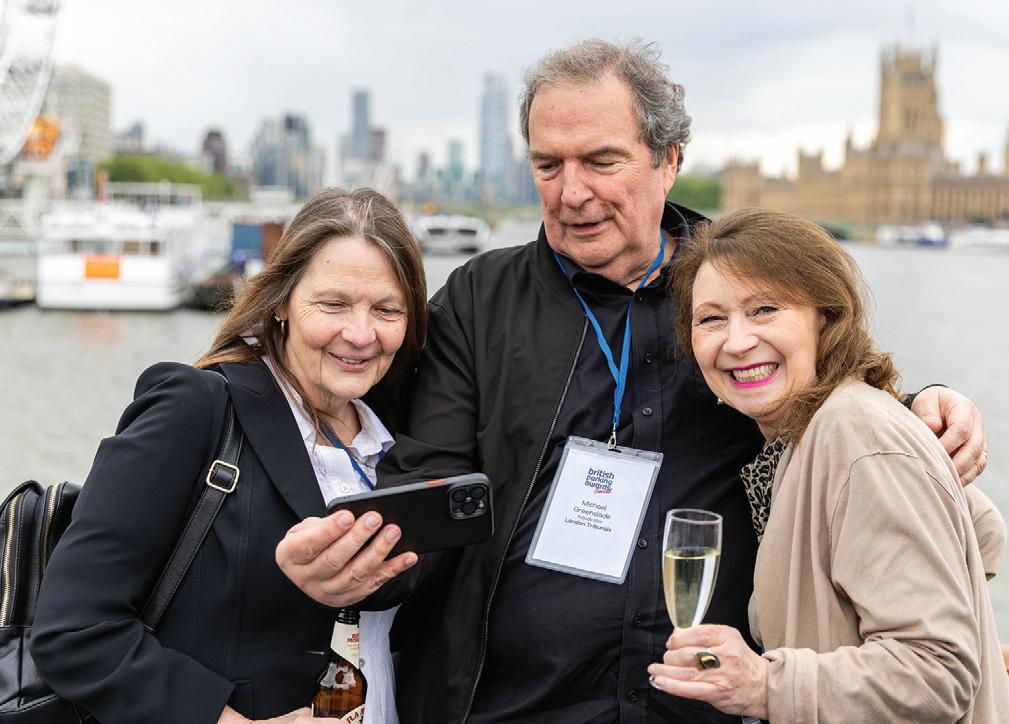


BRITISH PARKING AWARDS 32 | PARKING REVIEW
MATTHEW WALKER PHOTOGRAPHY
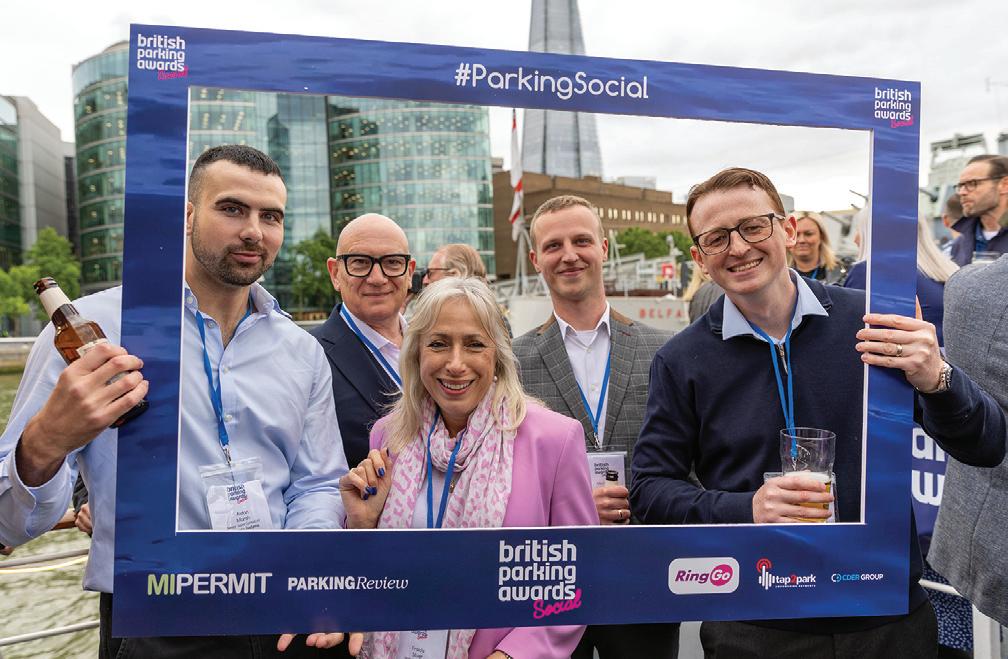



‘The Sinnerman’ will reveal the
winners…
The British Parking Awards 2024 will be presented at the Royal Lancaster London by the renowned comedian and quizzer Paul Sinha.


A trained medical doctor Paul is perhaps best known as the ‘Sinnerman’ on the hugely popular ITV quiz show The Chase. As a comedian Paul has played every major comedy club in the UK, performed in 18 countries across the globe, taken eight solo shows to the Edinburgh Fringe, and won Best Club Comedian at the Chortle Awards in 2014.


…and Roger will be ‘God’
One of the most well-known and trusted voices on British television, Roger Tilling is now firmly established as the voice of the British Parking Awards. With over 25 years of television and radio experience, the UK's television networks have made Roger their first port of call when a Voice of God delivery is needed for major television events and primetime shows, from The Royal Variety Performance to The British Soap Awards, and Never Mind The Buzzcocks to Top Gear
Headline sponsor
Supporter
Category sponsors


PARKING REVIEW | 33
BRITISH PARKING AWARDS www.britishparkingawards.uk
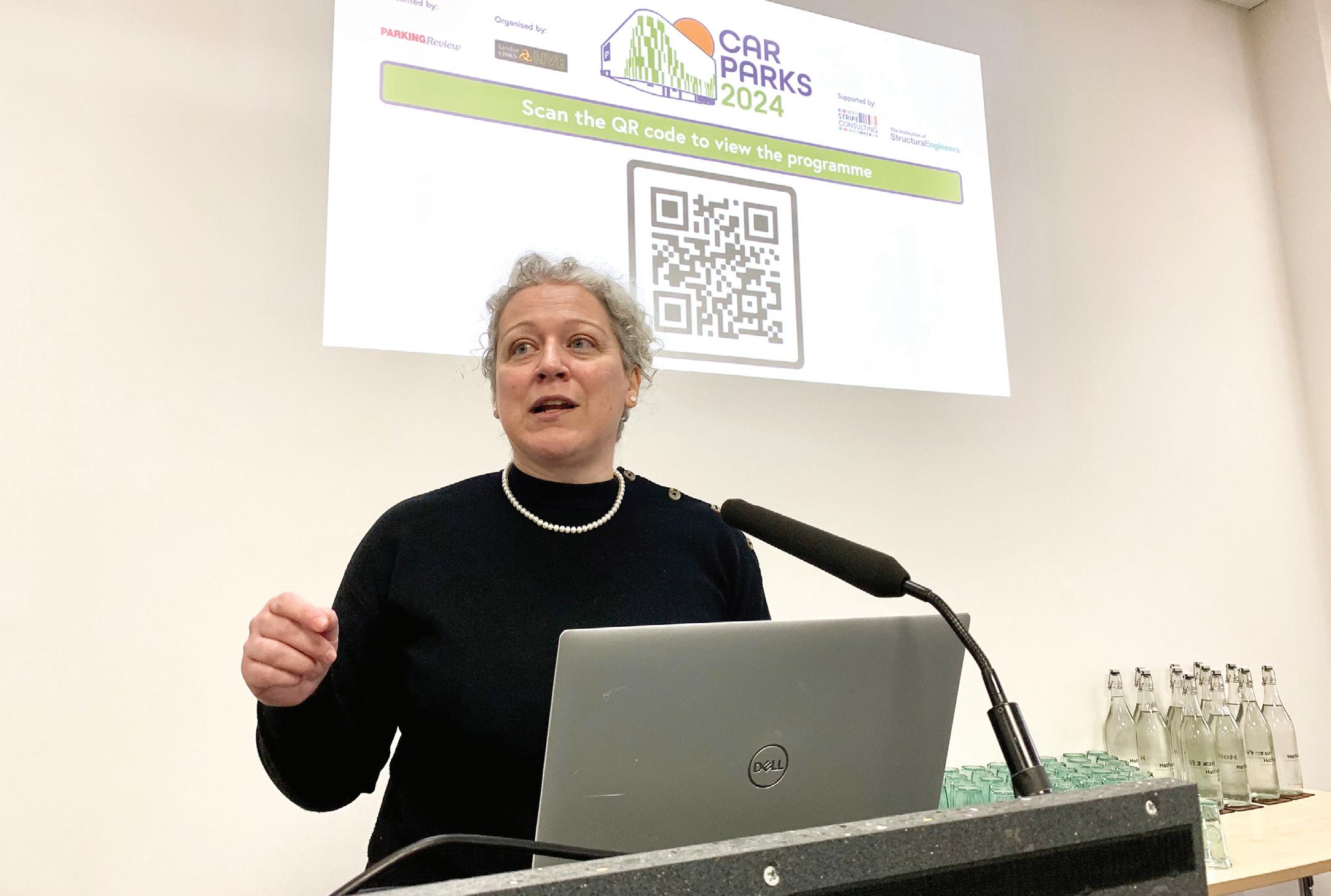
Building better car parks
The life of car parks
“Car parks are here to stay and they will keep evolving,” said Vaso Vaina, managing director of Stripe Consulting in her keynote address.
Car parks are not just places to garage vehicles. They are dynamic spaces whose users are always on the move. Car parks are also important civic structures that support their local economy, open up destinations and provide space for a wide range of other services activities. A new generation of public car parks is showing that multi-storeys can be iconic gateways to town and city centres and act as catalysts for urban regeneration.
The Car Parks 2024 conference focussed on the design, construction, operation and maintenance of parking structures. The event, held at 15 Hatfields in London, covered a multitude of themes ranging from car park design, fire safety and how to refurbish historic car parks. The expert panels also explored issues such as providing accessible spaces and planning for the provision of electric vehicle charging infrastructure.
The day showcased recent champion car parks from the British Parking Awards, including new builds and renovations. There was also a session devoted to the Institution of Structural Engineers’ new book Car Park Design, a publication that won the ‘Special Jury Award’ at the British Parking Awards 2023 as an exceptional publication that particularly impressed the jury.
Besides the topical presentations and expert panels, the day gave delegates chance to network with colleagues in an exhibition showcasing the latest systems and services.
Car Parks is a Landor LINKS event and was programmed by Parking Review. We are now planning Car Parks 2025
While multi-storeys are a functional building form that are usually taken for granted, they are actually important structures that are essential to the operation of towns, cities, transport interchanges, hospitals and retail destinations.
Sometimes car parks can even be inspiring, she suggested. There is a new generation of parking structures that can provide attractive gateways to town centres, act as catalysts for urban regeneration and even be attractive civic buildings.
“The general public is very interested in these structures,” Vaina said. “They say that a very good car park is the one that nobody notices because it has no problems or issues. This is why we all want to design a car park that nobody notices, just one that functions really nicely!”
Vaina then handed the stage over to colleagues from her multi-disciplinary team. Stripe Consulting’s head of architecture
Jon Elliott, architect Jessica McGregor, and senior technical manager Harry Smith explored the life of a car park from the point of inception to the end of its life.
They looked at how to plan, design, construct and maintain these complex structures, addressing issues such as:
• The planning process
• Understanding the needs of the destination
• Planning for people
• Choosing the structural type
• Designing façades
• Selecting the right systems to operate a car park
• Maintenance
• Life Care Planning
• ‘End of life’ car parks: Renovation or replacement?
CAR PARKS 34 | PARKING REVIEW
Vaso Vaina

Lighting the way ahead
Standing on a hill above Sunderland, the illuminated exterior of the Riverside car park is a beacon for the city’s regeneration. This iconic structure acts as a good example of how new parking facilities can blend both functionality and striking aesthetics with sustainable construction and operation.
Jeanette Armin, commercial development manager at Sunderland City Council, provided insights into the development of Riverside Sunderland, which won a Best New Car Park trophy at the British Parking Awards in 2023.
The Riverside car park provides over 650 spaces, including 49 accessible bays and 115 EV spaces, as well as motorcycle and cycle storage. It as an important piece of infrastructure, enabling the growth of a vibrant mixed-use community offering new housing, leisure, healthcare and employment opportunities.
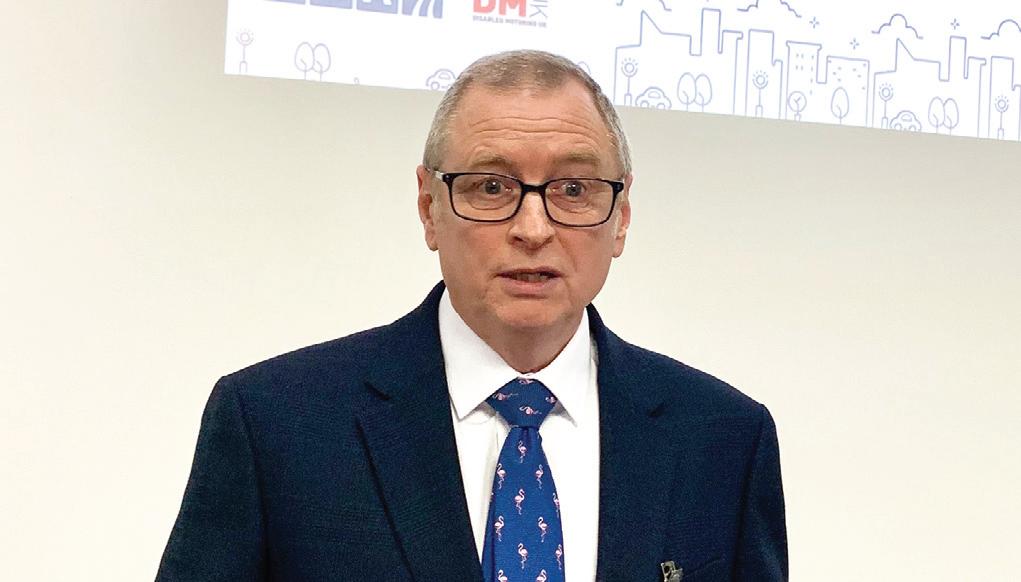

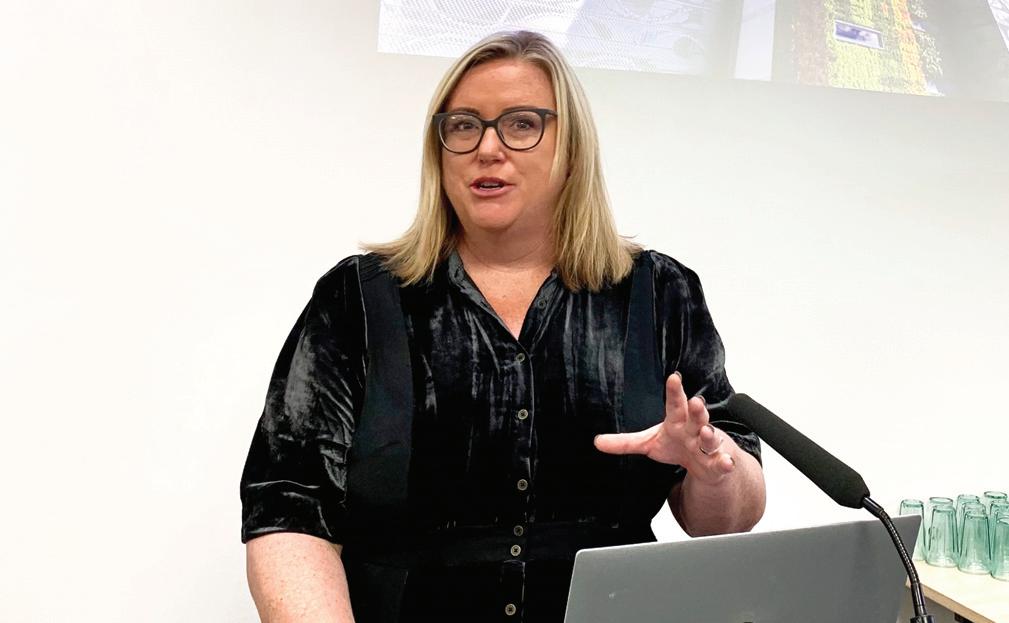
Accessible car parks
Park Access is a new accreditation by the British Parking Association and Disabled Motoring UK (DMUK) for car park operators seeking to provide accessible sites. Graham Footer, chief executive of DMUK, explained the two main pillars of the new scheme.
• Park Access: An accreditation that aims to become recognised throughout the whole of the UK for accessible and inclusive parking and electric vehicle (EV) charging facilities. Park Access will enable everyone, regardless of their accessibility needs, to identify car parks and facilities, such as EV chargepoints, that they can use with ease.
• Park Access EV: The accreditation encompasses PAS1899, a new accessibility standard for public EV charging points developed by the British Standards Institution (BSI), in its role as the National Standards Body (NSB). It provides detailed requirements and recommendations for the design of public EV charging infrastructure.
Designing out car crime
The Safer Parking Scheme is a national standard for UK car parks that have low crime and measures in place to ensure the safety of people and vehicles. Sara Fisher, head of operations and business development at the British Parking Association (BPA) explained how before receiving a Park Mark or Park Mark Plus logo a car park has to undergo a rigorous assessment by specially trained police assessors and BPA scheme managers.
CAR PARKS PARKING REVIEW | 35
Riverside Sunderland
Jeanette Armin
Graham Footer
Sara Fisher
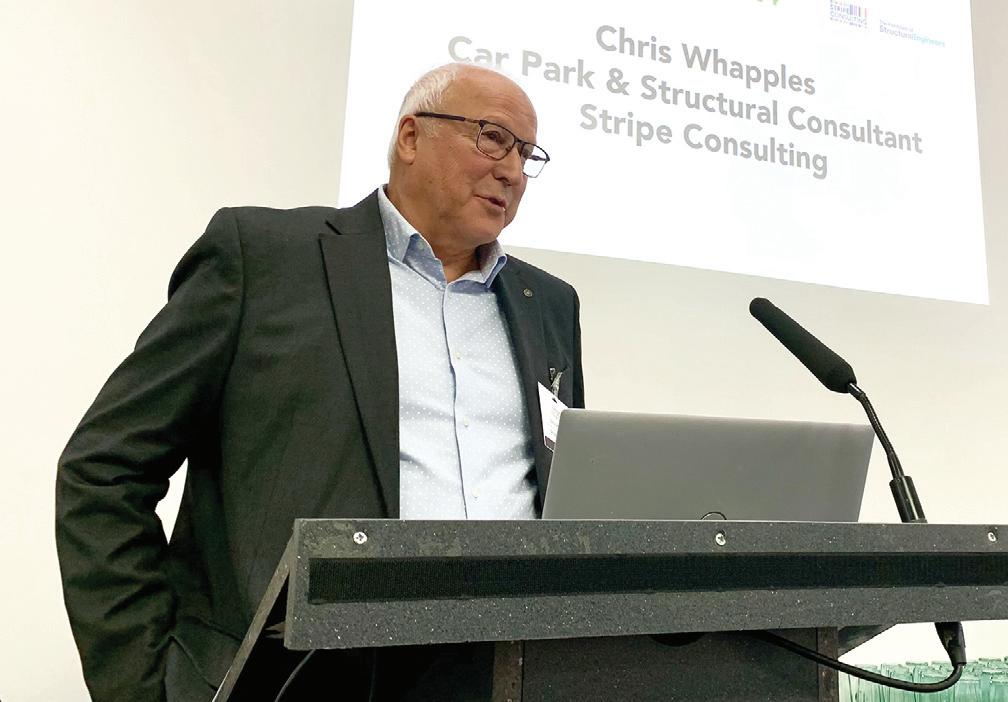
Parking design by the book
Car Park Design is a major new book published by the Institution of Structural Engineers (IStructE). A panel of architects, engineers and construction experts involved in writing the guide were on hand at Car Parks 2024 to discuss the aims and contents of the publication.
Car park consultant Peter Guest, a Car Park Design co-author, outlined how the book covers the design, construction and asset management of all car park structures, including standalone multi-storey car parks and underground car parks.
Guest set how the guide addresses issues such as designing for increasing loads, the efficient circulation of vehicles (with particular emphasis on flow rates of ingress and egress), and the provision of electric vehicles charging infrastructure.
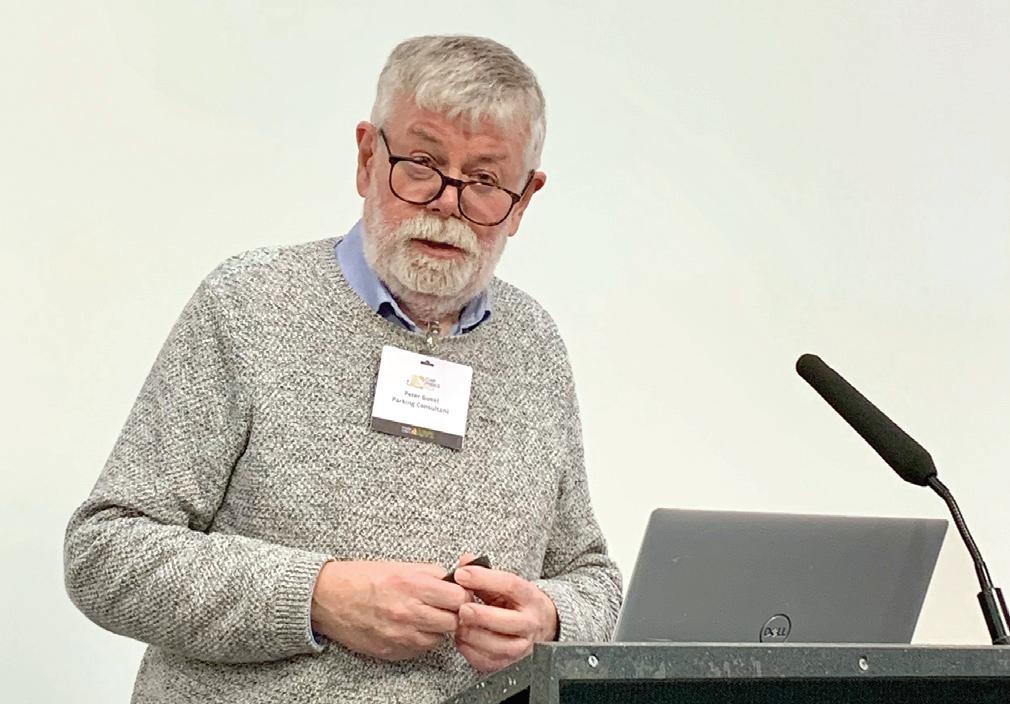
Understanding fire in car parks
There has been a spate of catastrophic car park blazes across the UK and Europe where fire spreading between cars has led to the failure of multi-storey structures.
A session on fire in car parks was led by Russell Simmons, chair of the British Parking Association’s Structures Group and Fire Risks in Car Parks Group. He set out how the parking sector is working to better understand fire in car parks, and how to design and build fire prevention into modern car parks.
Marco Reifert, head of the design management department, and James Fildes, project development manager at Huber Parking UK presented a study of fire safety measures in multistorey car parks. They shared an analysis of current fire safety measures and relative cost implications.
The Huber team discussed three real world car park fires – Sola Airport in Stavanger, Norway (2020), Cork Shopping Centre, Ireland (2019) and Luton Airport (2023).
They looked at designed times of fire resistance, the actual time taken for the structures to collapse and considered factors such as weather conditions and how the fire actually spread.
Reifert and Fildes suggested that there was no one simple solution, as working to implement incremental time increases in

Chris Whapples, car park and structural consultant at Stripe Consulting, said car parks are, by definition, places to park cars, so it seems sensible to look at what is happening to the design of vehicles when building or renovating parking structures.
Whapples, who was the overseeing consultant of Car Park Design, explained how the circulation and bay layouts of car parks needs to take account of the growing size and weight of modern cars, and the requirements of electric vehicles.
Whapples said: “Cars are changing faster than regulations can keep pace and to ensure that your car park is fit for purpose, I encourage applying the recommendations in the IStructE Car Park Design guidance to both new and existing car parks.”


Car Park Design won a British Parking Award and joins the Institution of Civil Engineers’ Recommendations for the Inspection, Maintenance and Management of Car Park Structures on the essential reading list for anyone involved in the off-street parking sector.
Russell Simmons, chief executive of Ballast Nedam UK, and another Car Park Design co-author, convened an ‘Ask the experts’ session during which the panel answered questions raised by delegates on a range of issues relating to the development, design and building of car parks.
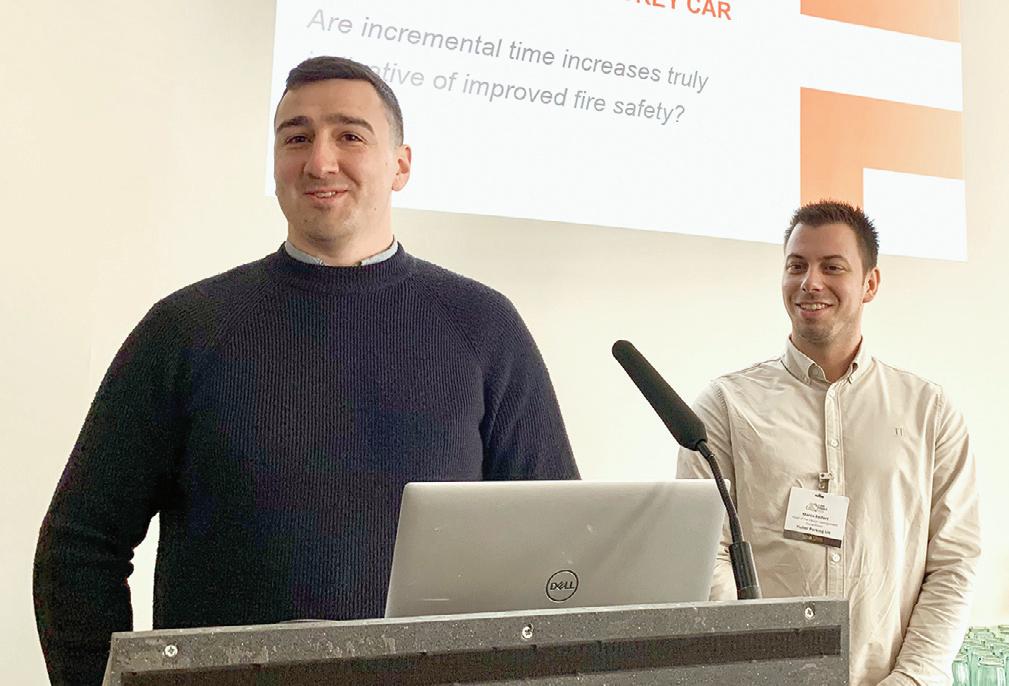
fire resistance is not truly indicative of improved fire safety. Fire resistant design can only be one element of a more holistic approach for fire safety in car parks that can include options such as deploying automatic fire detection systems or installing sprinkler systems.
PARKS 36 | PARKING REVIEW
CAR
Chris Whapples
Russell Simmons
Peter Guest
James Fildes and Marco Reifert
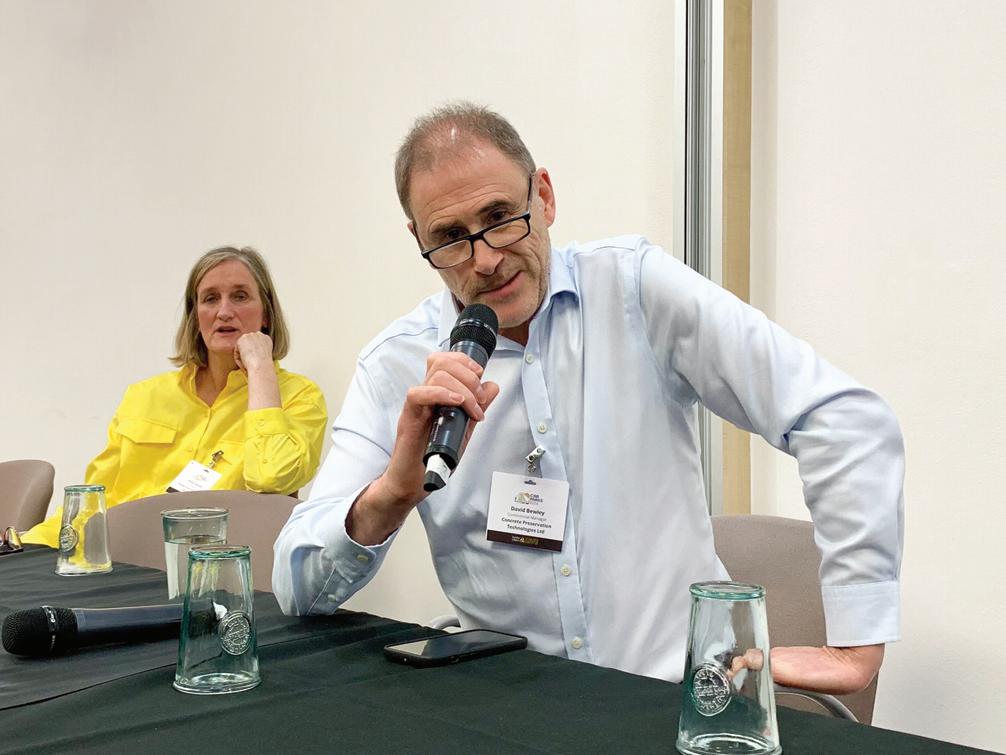
Car park revival
A good number of 1960s and ‘70s vintage car parks are facing demolition after being deemed to have reached the end of their life. However, sometimes it can sometimes make more commercial, operational and environmental sense to renovate older parking structures. Car Parks 2024 presented case studies of projects that have won the Best Renovation trophy at the British Parking Awards.
Restoration in a historic city
The Podium Car Park is a 1960s structure in the centre of the historic city of Bath. Polly Church, director of Potter Church & Holmes Architects explained how the car park and an adjoining Hilton Hotel had been chalked up for demolition. But things changed when Strathclyde Pension Fund bought the site.
The pension fund has a sustainability framework and believed saving the existing structures would be less carbon expensive than demolition and replacement.
DTZ Investors, working on behalf of Strathclyde Pension Fund, assembled a team of architects, engineers, surveyors and contractors to devise a way to save the building. The team included Potter Church & Holmes, Parking Matters, Cushman Wakefield, Makers, Stripe Consulting, Quinn Ross and Cogent.
As Bath is the UK’s second most visited city after London
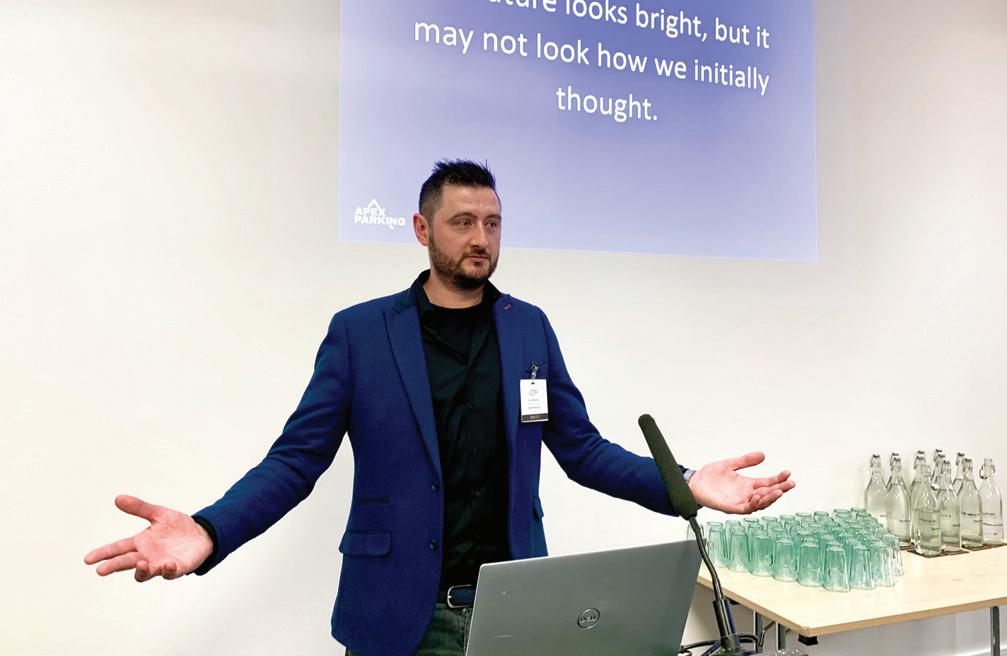
Where are car parks heading?
Car Parks 2024 concluded with a session led by Manny Rasores de Toro, Mr Parking Technology & Services Consultancy, that explored how car parks will evolve.
Car parks of the future
Guy Watson, managing director of Apex Parking provided an operator’s perspective. He believes car parks are here to stay, but instead of merely being places to leave a car, he argued that the next generation of car parks should be well-designed and
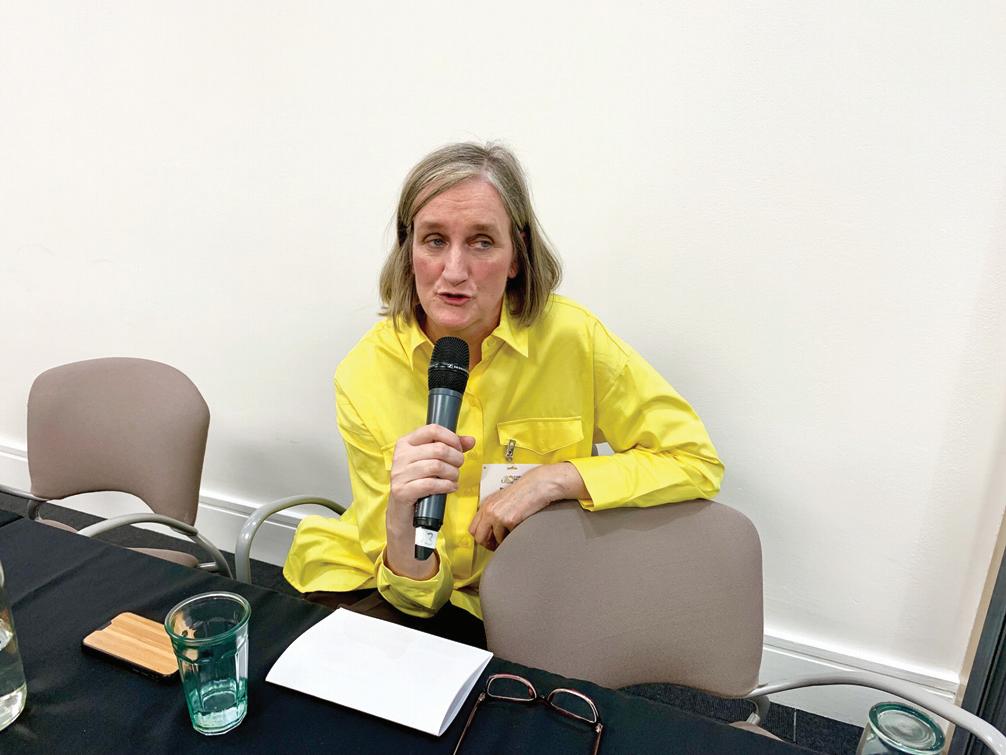
redesigning a 1970s Brutalist multi-storey car park in a UNESCO World Heritage location was a genuine challenge. The team had to devise designs and use materials that complied with the Bath Pattern Book, a document which sets out what materials can be used when building in specific contexts in the city.
The car park’s perimeter was secured using Webnet wire mesh, payment system updated, electric vehicle chargepoints installed and a new wayfinding and signage scheme introduced. The result is a new look Podium car park serving a historic city.
Preserving a Grade 2 Listed structure
Preston Bus Station Car Park was opened to great fanfare in 1969 and was likened to a “baroque cathedral for buses”. But, by the turn of the 21st century, redevelopment plans saw the vast concrete building under threat of demolition.
Campaigning by enthusiasts of Brutalist architecture bore fruit in 2013 when the bus station and car park was awarded listed status and the decision was taken to refurbish the structure. This proved to be a mammoth undertaking.
David Bewley, commercial manager, Concrete Preservation Technologies, explained how thorough investigation, use of innovative corrosion control technologies and carefully crafted concrete repairs mean that this truly iconic car park has been restored to its former glory.
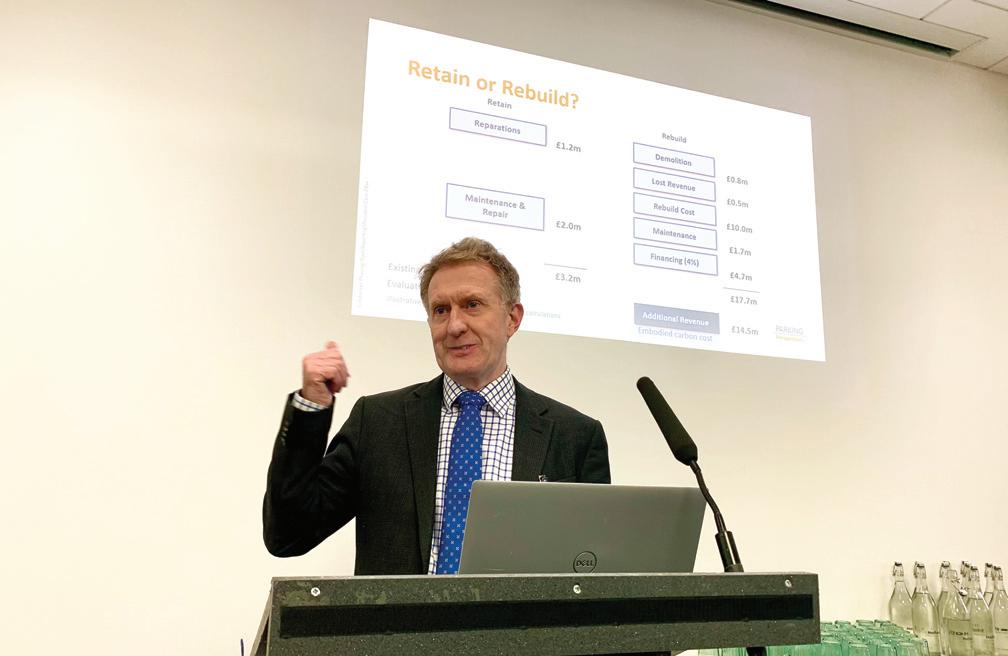
managed facilities that provide electric vehicle charging, access to shared mobility schemes and attractive services such as click & collect.
“We need to deliver customer focussed products, improved vehicle volumes, and a genuine service to clients,” Watson said. “We need to provide better environments for customers to rebuild their confidence and trust. We need to bring customers back because without increased customer patronage today, who pays for tomorrow?”
The
new economics of parking
Andrew Potter, director of Parking Perspectives, set out an analytical approach to help car park owners make informed decisions on what to do with ageing facilities. The big question facing many car park owners is whether to rebuild or reconfigure structures so they offer a better parking experience in order to deliver a better return, or to offer lower service levels and tolerate reduced yields? His answers were thought-provoking and will be discussed in depth at Car Parks 2025
CAR PARKS PARKING REVIEW | 37
Peter Bewley
Guy Watson
Polly Church
Andrew Potter
Heavy vehicles should be excluded from using some car parks


A weight y problem
The overloading of older multi-storey and underground car parks is a cause of concern, says structural and fire safety reporting group CROSS-UK
The growing weight of cars presents a potential problem of overloading of car parks, a report by a structural and fire safety group has warned. The report was published by Collaborative Reporting for Safer Structures UK (CROSS-UK), an initiative of the Institution of Structural Engineers (IStructE), Institution of Civil Engineers (ICE) and Institution of Fire Engineers. CROSS-UK seeks to help professionals to make structures safer by publishing safety information based on the reports they receive and information in the public domain. The initiative shares information and concerns produced by reporters, sector experts whose anonymity is protected.
Older car parks
A CROSS reporter notes that for over 80 years multi-storey car parks (MSCPs) have been designed for vehicles with a maximum gross weight of 2,500kg, which equates to a uniformly distributed load of 2.5kN/m2. They add that the maximum gross weight has now increased to over 3,000kg, necessitating the design loading to be increased to 3.0kN/m2, as outlined in the IStructE’s recently published Car Park Design guidance.
The average gross weight of vehicles has also increased from 1,500kg to 2,000kg requiring the impact force on rigid vehicle restraint barriers to be increased from 150kN to 200kN. The reporter is concerned that the significant increase in size and gross weight of vehicles may impact the safety of some older car parks.
The reporter also notes that over the last 20 years there has been a significant increase in size and gross weight of vehicles that are able to use MSCPs.
Older car parks, and particularly those of the 1960s and 1970s, were designed and constructed to design standards that have since been found inadequate. For example punching shear in flat slabs was designed to BS CP 114: Part 2 1969 – The structural use of reinforced concrete in buildings.
During the 1960s and 1970s there was a construction boom resulting in a shortage of materials and labour, and a fall in the quality of the finished product.
The reporter shares that many, but not all, of these car parks were demolished due to structural fears around premature corrosion and loss of strength. Some have been subject to repairs, but these may have been cosmetic patch repairs with incompatible materials and may not have restored the structural integrity. The reporter highlights that repairs to cantilevers are particularly vulnerable, as the reinforcement is in the top of the deck where the risk of corrosion from penetration of chlorides is a maximum.
There are still a number of specialist system build car parks in service which are sensitive to structural deterioration and the manner in which repairs were undertaken. The reporter believes these car parks need to be assessed for modern vehicles.
Outlining common areas of concern, the reporter believes drainage should be an integral part of the design but notes it can be installed after coring the structure (sometimes in structurally sensitive areas such as punching shear zones) thus affecting the continuity of the reinforcement. They add that some car park decks have no falls or internal drainage, which leads to increased chloride penetration in areas where ponding is taking place.
Having highlighted common areas of concern, the reporter adds there are many others and advises engineers to study the structural morphology and interrogate the history of a car park before carrying out any strength assessment.
STRUCTURAL SAFETY
38 | PARKING REVIEW
BRYDON MCCLUSKEY/UNSPLASH
The reporter also recommends that older car parks be assessed in accordance with the ICE’s Recommendations for Inspection, Maintenance and Management of Car Park Structures using the loads recommended in the IStructE’s Car Park Design guidance.
The reporter concludes that strengthening may have to be carried out should the structure be incapable of withstanding the increased loading or, if this is prohibitively expensive, a weight limit should be imposed to restrict entry to the suspended levels.
New builds
To build bigger and faster, construction has moved in the direction of off-site manufacture and design has adopted ‘Lean’ design principles where the use of materials has been minimised. The reporter highlights that the curvature of long-span precast deck units can impose high bearing stresses on the seating and that, if the seating is concrete, high bearing stresses can cause spalling and reduce the bearing area – especially where the interface has no slip membrane.
Overloading can cause instability of steel frames and bolted connections especially where the structure has been designed to maximise the efficiency of the components. The performance and longevity of permanent metal formwork is dependent on the ability of the deck membrane to prevent water ingress and internal corrosion at the interface with the concrete. The reporter notes that when permanent metal formwork is used structurally and the membrane has not been regularly maintained, the strength of the deck can be reduced in proportion to the magnitude of the corrosion. Decks that have bolted units or constructed from Glass Reinforced Plastic (GRP) components often suffer from the bolts working loose and falling out under repeated loading.
The reporter also shares that the ability of a restraint barrier to withstand impact loading can depend solely upon the performance of the holding down bolts, some of which are incapable of withstanding repeated loading from vehicles nudging the barrier.
The reporter concludes by highlighting that Eurocode and National Annex for the UK implies the design loadings are for vehicles of maximum gross weight up to 3,000kg. However, this figure defines only the category in which the vehicle sits and the loadings are applicable for vehicles of maximum gross weight of 2,500kg and average gross weight of 1,500kg which is no longer compatible with the IStructE’s recently published Car Park Design guidance.
CROSS Expert Panel comments
This is a timely warning for the industry, as vehicles get heavier and particularly with the increase in popularity of electric vehicles. The panel notes that flammability and fire load are increasing concerns as much as structural load. Picking up on the reporter’s last point about weight limits, digital methodologies could be part of a solution.
Structures can already be automatically monitored for the development of structural distress, perhaps digital number plate recognition could link to vehicle kerbside weight and thereby exclude vehicles above a given weight. Drivers of heavy vehicles would have to get used to being excluded from some car parks – just as drivers of high ones are now – or be restricted to ground supported floors. This approach may be a cost effective alternative to strengthening.
Automatic number plate recognition (ANPR) could also provide an excellent opportunity to gather data on the distribution of kerb weights of vehicles using a car park. The technology is already in use, as one’s number plate is often read on entry and again on exit to decide whether one has paid and the barrier can be lifted.
A statistical analysis similar to those routinely used for Bridge Specific Assessment Live Load (BSALL) studies on long span bridges is possible to define a suitable level of live load, and how it might change with the population of vehicles.
To find out more about CROSS-UK visit: www.cross-safety.org/uk/about-cross-uk



CROSS Newsletter
Key learning outcomes
The CROSS-UK Expert Panel offers the following advice for car park owners, designers and engineers.
For car park owners:
• Consider the suitability of car parks for the size and weight of modern vehicles
• Seek advice from suitably qualified and experienced engineers with regard to any remedial measures that may need to be taken
• Consider entry control by electronic means for example automatic number plate recognition
• Consider parking heavy vehicles on non suspended levels.
For designers and structural engineers:
Consider the effects of modern vehicles on older structures and how these can be accommodated, for example, by limiting their spacing or access before adopting strengthening of the structure.
Essential reading: CROSS-UK reports
CROSS has previously published Safety Reports concerning potential structural issues with car parks:
• Safety Report 119 – Multi-storey car park defects
• Safety Report 224 – Structural assessments of multi-storey car parks
• Safety Report 265 – Multi-storey car parks – Structural condition concerns
• Safety Report 267 – Multi-storey car parks demolished due to structural defects.
More recently, CROSS has issued safety information concerning fire risks:
• Safety Report 857 – Fire resistance of multi-storey car parks
• Safety Report 940 – Fire risks in multi-storey car parks
• Safety Report 1007 – Fire protection to car park steel frame
• Safety Alert – Fire in multi-storey car parks.
STRUCTURAL SAFETY PARKING REVIEW | 39
Share knowledge to help create a safer built environment Modular construction design concerns Sudden collapse of 1850s stone balcony Horizontal mains used as a solution to meet vehicle access requirements Overloading of older multi storey and underground car parks
CROSS-UK Newsletter 73 | June 2024

MOBILITY HUBS

THURSDAY 11 JULY 2024
BIRMINGHAM CONFERENCE & EVENTS CENTRE
Creating connected spaces
Mobility hubs are spaces where public, shared and active travel modes are co-located alongside improvements to the public realm. They enable travellers to make smooth and safe transfers between different modes, swapping private cars for shared vehicles, bikes, buses, trains, scooters or walking.
The annual Mobility Hubs conference has now become an eagerly anticipated date on the calendar of the transport and planning sector.
The third annual Mobility Hubs conference sees speakers and expert panels explore the design, implementation and operation of mobility, EV and service hubs. The day will draw on real world experience and showcase best practice from around the UK and internationally.
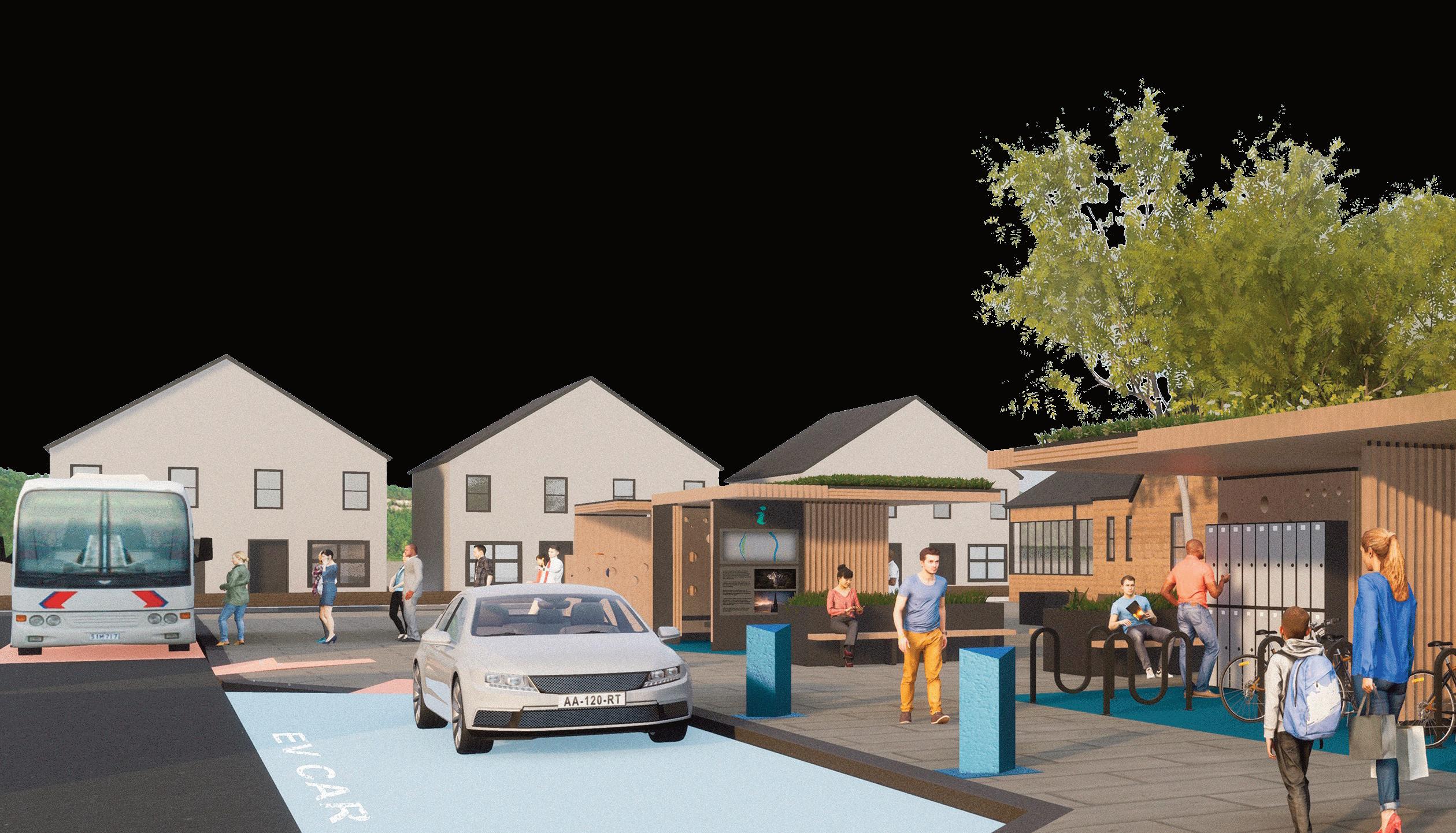
Exhibiting opportunities
If you are interested in exhibiting contact Jason Conboy at: jason@landor.co.uk or call: 020 7091 7895


Exhibitors include:


2024
Presented by: Headline Sponsor:
Image: CoMoUK
Key themes
The event will look at how to plan, implement
Delivering mobility hubs
Cycles, scooters, walking and shared vehicles. The conference will explore the range of mobility services that can be provided at mobility hubs and look at ways of increasing awareness and usage of these facilities.
Meet the experts
Confirmed speakers include:

Trevor Brennan Project Lead England’s Economic Heartland

Dan Gullock Architect/Director FATKIN
and operate mobility hubs
How to build a mobility hub
Mobility hubs have moved from being concept sketches into the real world. The task of creating mobility hubs draws on the skills of planners, engineers and architects as well as public transport and mobility service providers.



Paul Morrison Head of Collaborative Design & Engagement, North of England Sustrans

Amanda Edmondson Mobility Hubs Project Manager, Future Transport Zones (FTZ) West of England Combined Authority
Providing connected services
Mobility hubs act as focal points for services that support local communities and businesses by accommodating services such as bike and scooter hire, shared car clubs, last mile deliveries and ‘click & collect’.



Elizabeth Orchard Strategic Land Technical Director, Endelevu working for Ptarmigan Land

Robin Tyne Project Manager CoMoUK
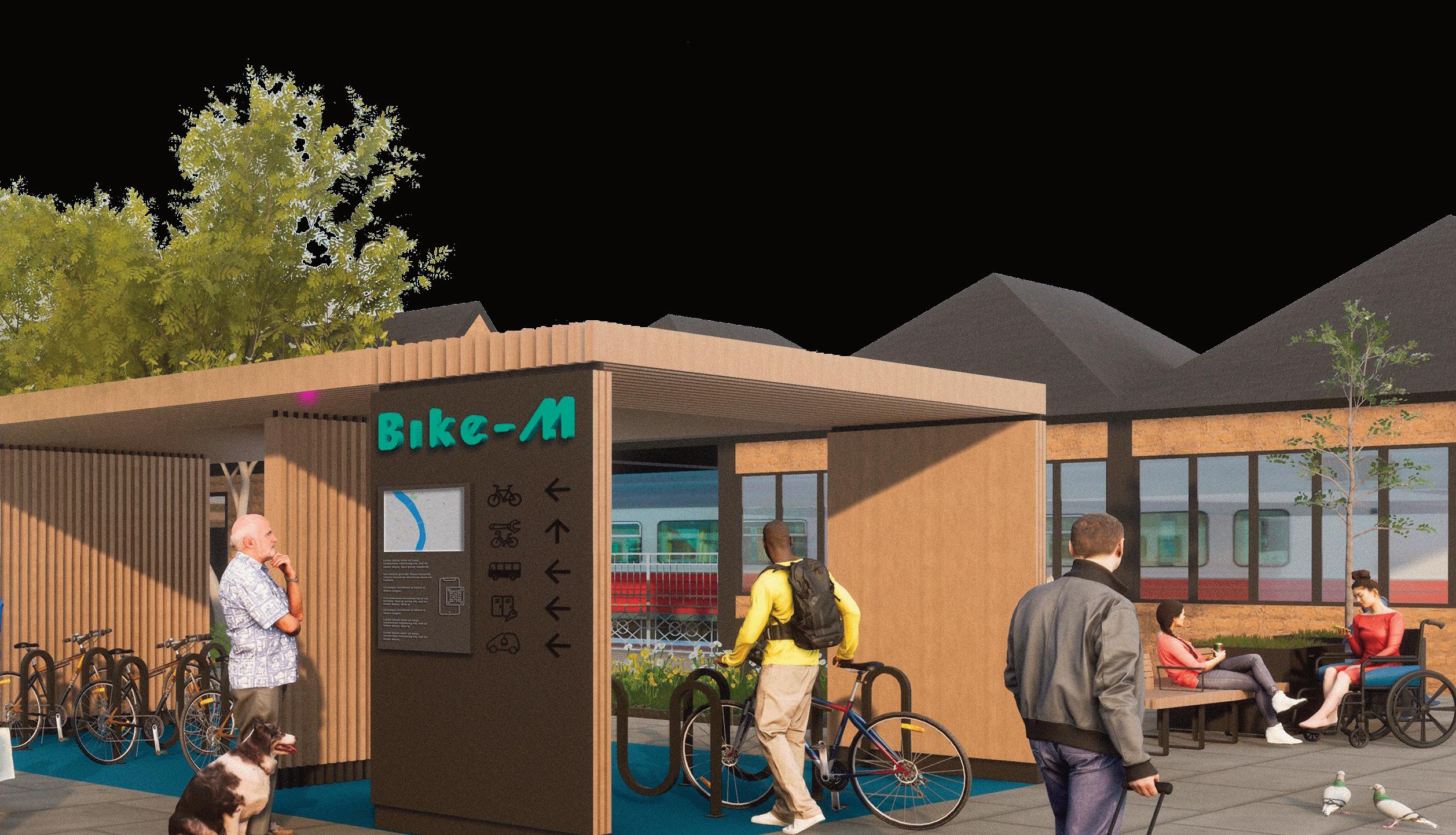
More speakers to follow…
If you are interested in speaking or taking part in a panel contact Mark Moran at: mark.moran@landor.co.uk
 Robert Davis Sustainable Travel Manager Trueform
John Denton Head of CommercialUK & Ireland Q-Park
Lidia Derossi Principal Engineer AECOM
Laura Jacklin Commercial Development Manager Grid Smarter Cities
Robert Davis Sustainable Travel Manager Trueform
John Denton Head of CommercialUK & Ireland Q-Park
Lidia Derossi Principal Engineer AECOM
Laura Jacklin Commercial Development Manager Grid Smarter Cities
Book now: www.mobilityhubs.uk

Parking put on a show
Being sent to Coventry can be fun… if you work in parking!
Parking professionals from across the UK, Europe and the rest of the world gathered gathering at Parkex, the British Parking Association’s annual conference and exhibition.
Parkex 2024 was held at the CBS Arena in Coventry on 22-23 May 2024. Attendees received guidance on current issues at the BPA Live Theatre.
The programme examined challenges for councils and parking operators around parking policy, regulating private land, the National Parking Platform, making better use of data and the design of parking structures and skills development. There were a number of breakout sessions run by the BPA Local Authority Forum and Women in Parking. In addition there were seminars on highways run as part of the parallel Traffex and a focus on electric vehicle infrastructure as part of Evex .
An array of receptions and after hours social events took place that allowed delegates to mingle and relax after attending seminars, briefings and touring the exhibition halls.
In 2025 Parkex returns to the CBS Arena on 21-22 May. www.britishparking.co.uk www.parkex.net


PARKEX 2024
42 | PARKING REVIEW BPA/SMILE PHOTOGRAPHY
The BPA team
The British Parking Association team
Parkex LIVE
The CBS Arena received a Park Mark during Parkex
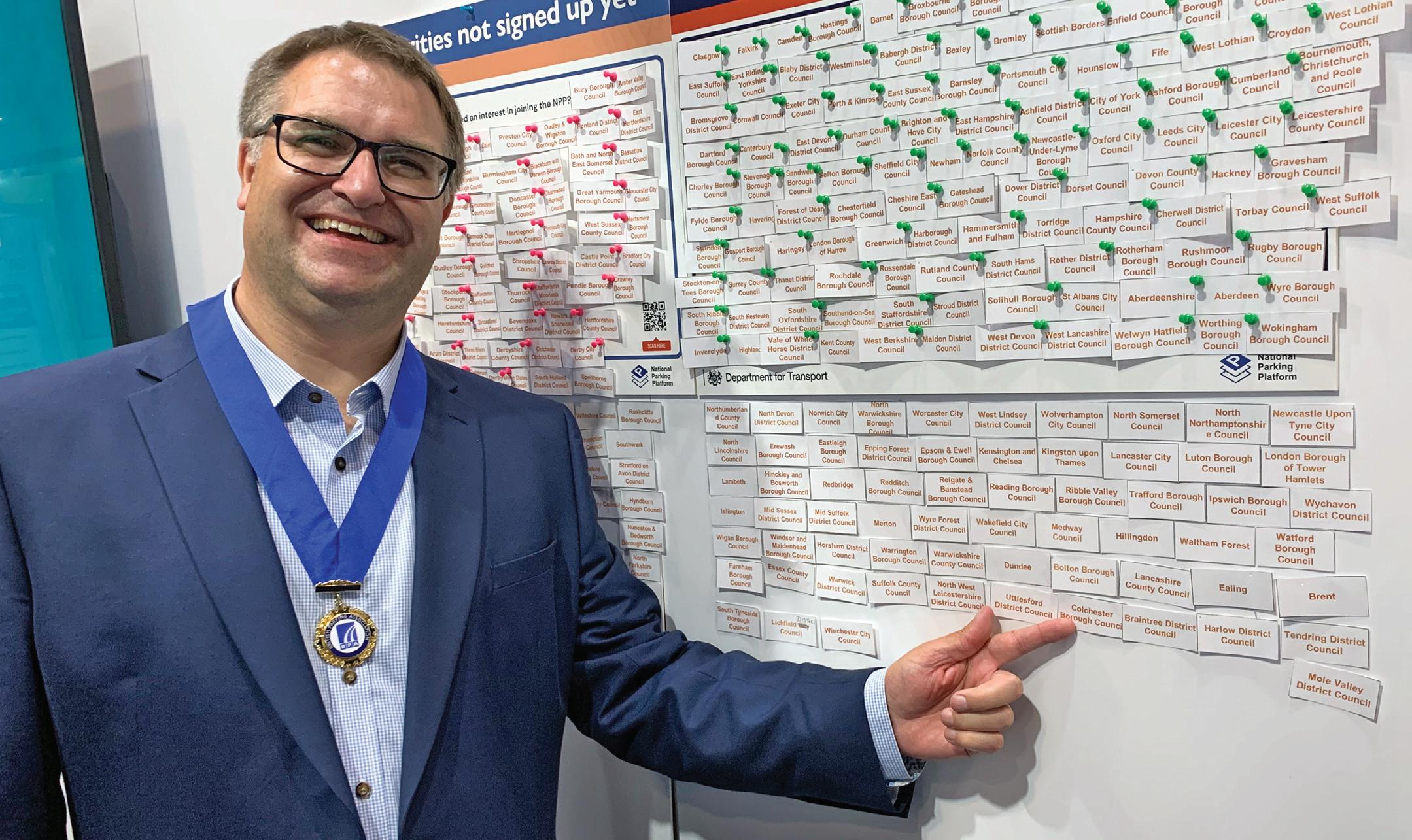
National Parking Platform takes shape
New multi-vendor approach discussed at Parkex
Parkex LIVE kicked off with a look at the National Parking Platform (NPP). This initiative is a multi-vendor cashless parking solution that will allow drivers to use their preferred app or provider to find and pay for parking wherever they are. The NPP will create a centralised system that will ensure drivers don’t need to have a variety of apps installed on their smartphones in order to pay for parking. It’s also publicly owned and not-for-profit and will work to allow parking operators to communicate directly with service providers.
The National Parking Platform has been piloted by the Department for Transport (DfT) working with the British Parking Association, a group of pathfinder local authorities and cashless payment providers. The pilots have been judged a success so the NPP is set to go live nationally in the autumn. The DfT has been encouraging local authorities across the UK to join the scheme.
Michael Dnes, the DfT’s head of the NPP and Future Roads Technology at the Department, set out how the platform will bring order and structure to the current patchwork provision of paying for parking using an app. “We will have a full national platform by October 2024,” he said. “It’s going to be big: we have had 200 local authorities register their interest in joining. The open market will set simple standards for suppliers and allow there to be tailored services for users. It will also be a gold standard for data visibility. We are starting out with local authorities, but this will go wider – to private operators, other service providers and data users, public authorities, equipment suppliers, and transport providers.”
Sunil Budhdeo is transport innovation manager at Coventry City Council, which was one of the first councils to join the NPP. He told delegates: “The primary aim for us was to be prepared for the future. If we can get common data to be shared across the whole country, then we are future-proofing our infrastructure and preparing for the innovative transport systems that are coming through.” npp.org.uk
British parking is the envy of the world
Transport minister Anthony Browne praised the development of the National Parking Platform
Improving the driving experience is one of the government’s top priorities. Many people’s day-to-day lives revolve around vehicles and the car remains indispensable. The government stands squarely behind drivers, be that to tackle the scourge of potholes or cutting out over-zealous traffic enforcement measures.
In our Plan for Drivers, we have 30 initiatives to make driving fairer. One pillar is the National Parking Platform, because paying to park should be a breeze.

The current system of having to download numerous apps for different areas to pay for parking is a source of frustration. The NPP will fix that for good. We currently have seven local authorities using it and there will be full nationwide deployment from this autumn. This advancement will make it easier for drivers now, with knock-on benefits for the future. It makes parking simple by connecting all payment apps in a single system. The NPP currently has more than one million transactions a year – in fact, we’re heading towards two million. It will give motorists unparalleled access to parking through the app of their choice; it will be a unified open market that will foster healthy competition among the app providers; it means cost savings, as it will remove the need for the payment procurement process. British parking will become the envy of the world. It will also deliver wider goals more swiftly.
For example, Motability is using the NPP to build the first app for disabled drivers. In time we’ll be able to integrate EV charging and hassle-free toll payments. The revolution is under way. The data is standardised and sharable in the hands of drivers like never before.
Anthony Browne was speaking before the announcement of the general election.
PARKEX 2024 PARKING REVIEW | 43
MARK MORAN
BPA vice president Richard Walker points out his council – Colchester – has signed up to the National Parking Platform
Creating safer spaces
The safety of the public and welfare of staff were key talking points at Parkex 2024
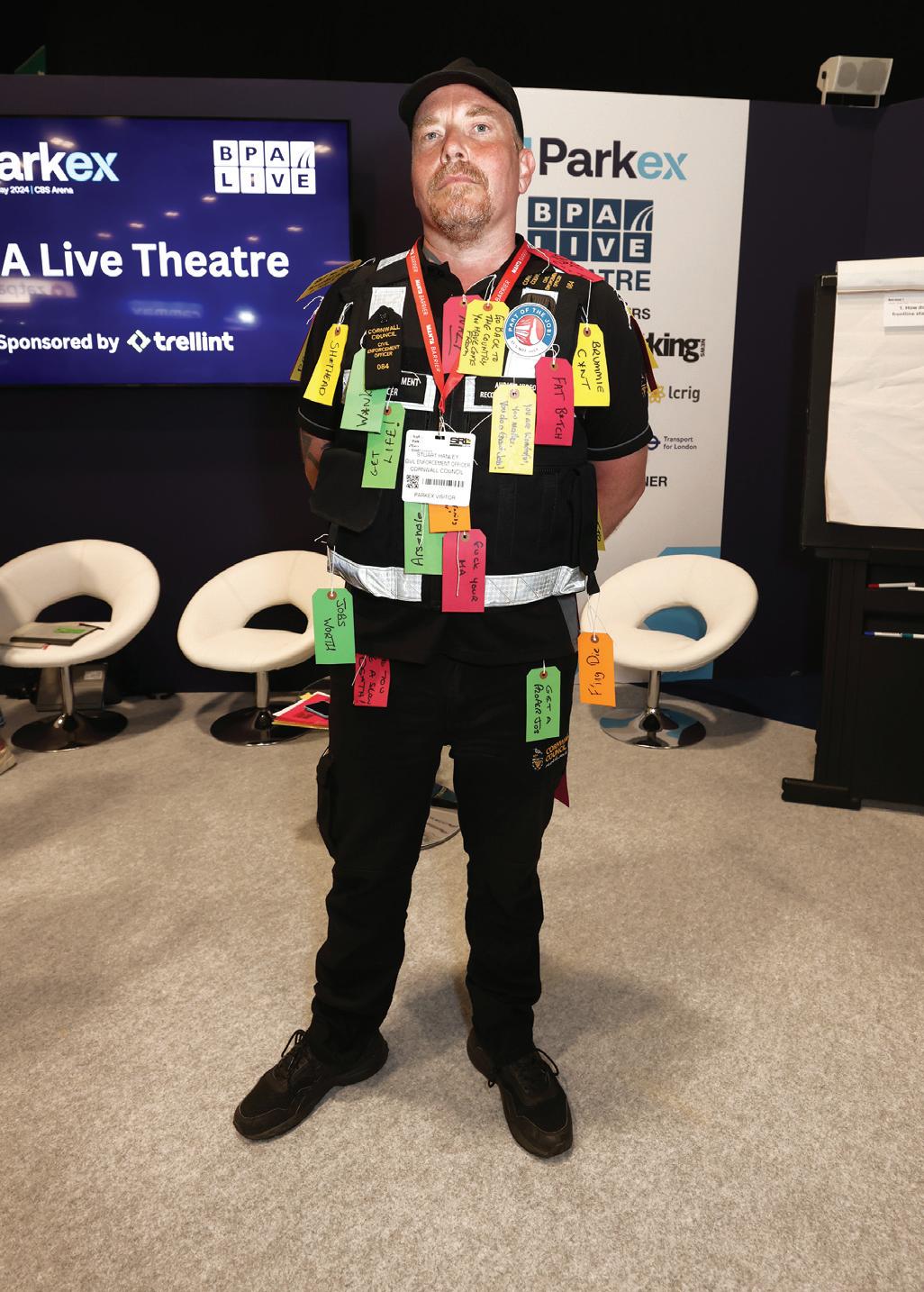
Verbal abuse and physical violence are sadly part of the daily reality of being a parking officer. Parkex featured a workshop looking at ways of better supporting staff and changing the public perception of parking enforcement. Delegates arriving at the workshop were greeted by Stuart Hanley, a civil enforcement officer (CEO) at Cornwall Council, covered in colourful labels. The tags were comments that Cornwall CEOs receive on a regular basis. While some were compliments, the majority were abusive.
“No-one should go to work to face this level of abuse,” said session moderator Zoe Hall, strategic parking manager, Cornwall Council.
The workshop made it clear that there needs to be more awareness of support resources available on the British Parking Association’s Frontline Officer Welfare Hub, which includes a framework for employers and advice on how to report incidents to the police.
Sarah Greenslade, BPA content and research manager, shared the results of the recent BPA survey gathering information on frontline officer abuse. An initial analysis reveals 13 local authorities and 22 companies responded on behalf of 477 and 5,327 officers respectively. Nearly all respondents were very concerned at the levels of abuse.
Collectively, 211 reports of assault were made to the police during the past 12 months, 18 of which had resulted in physical injury. Local authorities were more likely to report assaults than companies.
Only one organisation reported a reduction in abuse (by at least 80% during a three to four-year period) having fostered good support from police civil protection and community safety teams. Of the 77 individual officers who responded, 38% had reported assaults to the police.
The BPA will now be using this data in its ongoing work to lobby for better legislative protection for frontline officers, and to compare levels of abuse year-on-year to see where other action might be needed.
Making travel safer for women

The Women in Parking ‘lunch and learn’ provided delegates a chance to network over lunch, hear updates on key initiatives with which the group is involved and take part in a session on improving the safety of teams and customers. Women in Parking co-founders Jade Neville, head of user experience at Trellint, and Hannah Fuller, director of commercial relationships at Unity5, introduced a speaker panel.
Jennie Martin MBE, chair of Bus Users UK and trustee of the Parliamentary Advisory Council for Transport Safety (PACTS), spoke of the importance of providing an inclusive transport system that is accessible for everyone. She said: “Safe-system thinking and engineering binds the transport system together,” she explained. “We need open channels of communication in the workplace, including with managers and from managers, to get safety policies in place and ensure staff know about them. We also need to empower the public to take responsibility and step up to become active bystanders.”
Emma Kay spoke about creating the WalkSafe app. “Sixty per cent of adults have experienced harassment on our city streets, and 63% of women prefer to visit premises with safety initiatives in place. WalkSafe can signpost people to safe spaces and let them report safety concerns, such as poor lighting, and can even be used to report crime.”
Eren Bessim, training and development manager from the Safer Business Network, talked about safe spaces. “These are havens of temporary refuge for a person to facilitate their onward journey,” he said. “We have a number of retailers that are now recognised as being a safe space.” He also spoke about the Safer Business Network’s Women’s Night Safety Charter, which businesses can use and adapt to their own needs to help ensure the safety of their staff when travelling and at work.”

PARKEX 2024
44 | PARKING REVIEW
BPA/SMILE PHOTOGRAPHY
Cornwall Council CEO Stuart Hanley wore labels featuring comments made to colleagues by the public – some nice, most nasty
Women in Parking at Parkex 2024
Women in Parking’s Hannah Fuller and Jade Neville with DBCL’s Lee Samuels Camozzi

Serving those who serve
BPA signs Armed Forces Covenant
The British Parking Association (BPA) signed the Armed Forces Covenant during Parkex. The covenant is a voluntary pledge of support for the armed forces community. Major Steve Goodwin attended the formal signing of the Armed Forces Covenant. “Skills of veterans are highly transferable – and remember, they have been tested in highly challenging conditions,” said Major Goodwin.
Dean Fennell-Connell, sales director at Trellint and founder of the BPA Veterans in Parking network, said: ”The British Parking Association is committed to a policy of inclusion and representation in all areas. We seek to uphold the Armed Forces Covenant by actively employing veterans.”
Andrew Pester, the BPA chief executive, added: “The BPA has always been proud of our commitment to equality, diversity and inclusion. Signing the Armed Forces Covenant assists us to deliver our strategic aims and objectives, including: promoting an inclusive and professional sector; inspiring and enabling a culture of diversity, equality and inclusion; promoting and providing career development opportunities; and demonstrating our sector’s value to society.”
The BPA will seek to uphold the principles of the Armed Forces Covenant by supporting:
• the employment of veterans, service spouses and partners
• service members of the reserve forces
• service members of our local cadet units, either in our local community or in local schools
• active participation in Armed Forces Day.
The BPA will publicise these commitments to its membership through events, literature and on the association’s website, setting out how it will seek to honour these pledges, and inviting feedback from the armed forces community and members. www.armedforcescovenant.gov.uk
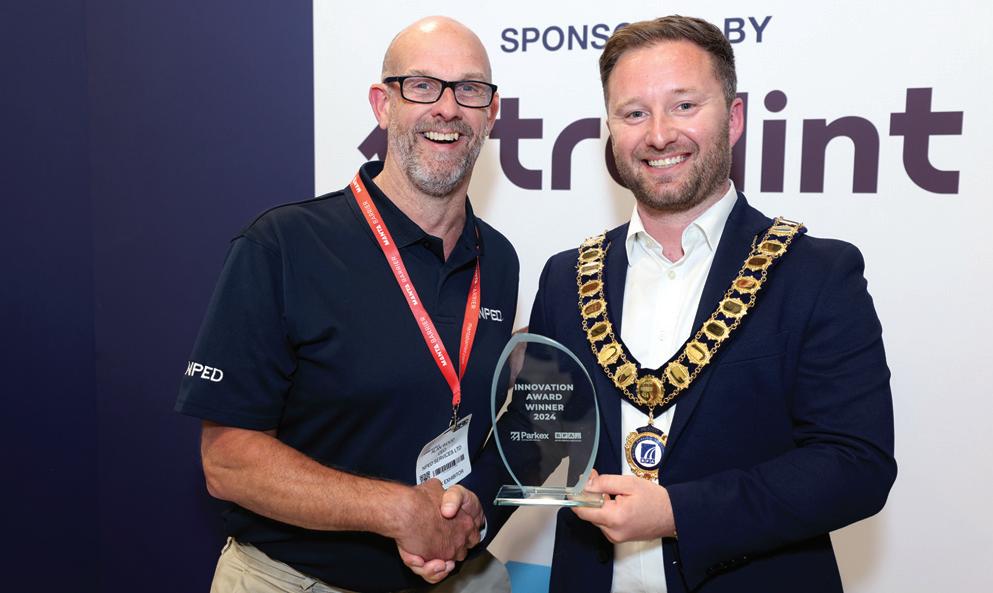
Recognising innovation
The National Persistent Evader Database (NPED) was the winner the Innovation Award, a competition open to all BPA members and Parkex exhibitors. There was a great deal interest in the Innovation Award this year, with almost 30 entries submitted, of which 15 were shortlisted. Each finalist was invited to present a five-minute power pitch to a panel of judges.
NPED founder and chief executive Alan Wood said: “I am delighted to have won the Innovation Award this year. I have put more than 10 years of work into developing what has now become NPED, because I truly believe we need to start tackling the growing levels of non-compliant vehicles on our roads – and the parking sector is in a great position to play a key part in helping us to do this. There were some really strong entries, so to win was a genuine surprise. Congratulations to all who were shortlisted. I am really pleased to receive this recognition so we can continue to drive the NPED aim of making our vehicle community safer for all.”
Jonathan Allan, BPA head of innovation, technology, and research, said: “We were bowled over by the interest and standard of entries this year. Congratulations to all who made the shortlist, and especially to our winner, Alan Wood, from NPED. Thanks, too, to our judging panel for their time: Kelvin Reynolds, Richard Walker, Jade Neville, Conor Greely, Manny Rasores de Toro, Anjna Patel and Louise Parfitt.”
Innovation Award finalists:
• Appyway: Blue Badge visibility
• Bikehubs: Safe, secure bike storage
• CorroDec: Corrosion and moisture sensors
• Metric with London Borough of Hounslow: Accessible micro-payment machine
• Newlyn: Cross-system data AI to address unpaid PCNs
• National Persistent Evader Database (NPED): Tackling nuisance vehicles that have unpaid PCNs, or no MOT, excise duty or insurance
• Octopass: Sustainable car park management solution
• Parking Eye: ANPR bollard to monitor and enforce Blue Badge bays
• Parkwise: Designated parking-space management for disabled drivers, to bring people back to the high street
• Raedam: Workplace parking, cloud-based management tool
• Ratio: io7 EV chargepoint with integrated lighting
• RTA: Traffic regulation order (TRO) management system
• Tap2Park: Data Prism data analytic solution
• Transfer 360: Vehicle lease company PCN management
• Unity5: Bay monitoring solution.

PARKEX 2024 PARKING REVIEW | 45
NPED’s Alan Wood with BPA president Stuart Harrison
Major Steve Goodwin with BPA chief executive Andrew Pester
Test driving the National Parking Platform
Transport Technology Forum delegates
trialled parking system
The Transport Technology Forum (TTF) says that more than 70 delegates at its conference tried out the new National Parking Platform (NPP), downloading a bespoke app to experience in-vehicle signing on their own Android and Apple smartphones when travelling to the event.
The app delivered delegates right to the entrance to the car park specially set aside for those who wanted to use the NPP, which enabled delegates to make payments for parking using their favourite parking app, rather than having to use a single specific app for the car park.
Users paid a token amount to trial the system when using the same car park code on one of six apps – APCOA Connect, AppyParking, Caura, JustPark, PayByPhone and RingGo.
For the in-vehicle messaging demonstration, drivers who downloaded a special app delivered by KL Systems were able to receive live traffic information as they headed to the venue, thanks to virtual traffic signs delivered by a TTF Connected Vehicle Working Group project. They saw National Highways roadside variable message signs
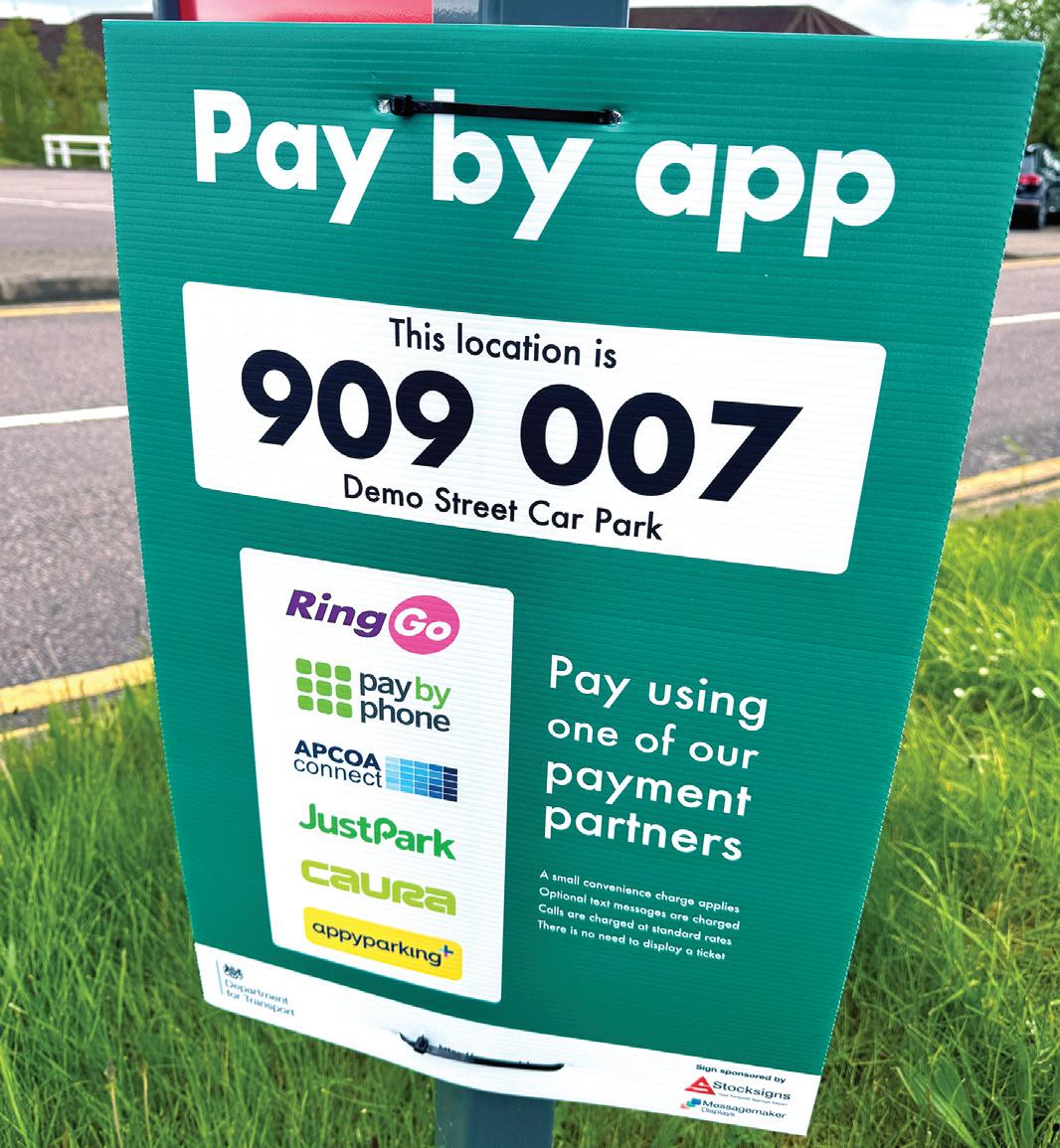
delegates about the whole conference, including these demos.
Work is now taking place to consider demonstrating an upgraded NPP and in-vehicle signage solution at the LCRIG Innovation and Learning Festival in Warwickshire in July.
Developer George Brown is already working on a fully integrated system to navigate drivers to a car park using the NPP solution. He said: “I was delighted with the feedback we gained from delegates and have already made suggestions for how NPP and sat nav can deliver a seamless user experience.”

repeated in-vehicle together with virtual signing to the venue itself along with welcome messages.
Drivers of Polestar electric vehicles were able to receive these messages on their builtin display screens using a version of the app that is directly downloaded into the car.
“It made sense to run the demo on the opening day of the conference, when our Smarter Parking and Connected Vehicle Working Groups met,” said
Connected Vehicle Working Group chair Andy Graham. “I’m pleased to say that, out of the seventy-plus people who tried out our solutions, I haven’t had a single negative comment, which suggests experts in the industry – who can often be the most critical – were happy with what they got.”
The Local Council Roads Innovation Group (LCRIG) which runs events on behalf of the TTF, is currently surveying
East Suffolk Council joins Open Market scheme
Drivers in East Suffolk can now choose to pay for parking via a range of payment apps. This follows the council’s decision to join the National Parking Platform (NPP).
From Monday 20 May, motorists parking in East Suffolk Council-owned car parks will be able to choose from a selection of cashless payment providers.
East Suffolk Council has joined the pilot phase of the NPP, a multi-vendor cashless parking solution delivered by the Department for Transport. This means that, in addition to RingGo, there will now be other parking providers to use when paying for parking cashlessly in all 73 chargeable council-owned car parks.
The suppliers available, which are part of the NPP, are RingGo, APCOA Connect, AppyParking+, JustPark, and PayByPhone. More suppliers may become available later.
Joining the NPP gives drivers the choice to use their preferred parking app or website, rather than having to use a single provider which the council has chosen on their behalf. This makes paying for parking easier, quicker and more convenient.
On arrival at a car park, drivers can choose to pay using any of the listed providers, through an app if they already have it or are able to download it at the time, or through the providers’ website.
Drivers are encouraged to check the terms and conditions of each provider before paying for parking, as administration fees may vary and there may also be optional fees for additional services such as text reminders. There is no fee for paying with cash at the machine.
Cashless payments in East Suffolk Council’s car parks are currently managed through RingGo, which attracts a ‘convenience fee’ of 20p per transaction. To help support cashless payments when they were first introduced, the council has previously absorbed this charge.
Under the conditions of joining the National Parking Platform, this charge will now be paid by the customer. All parking operators on the platform charge a small administrative fee and customers have the option to ‘shop around’ for the provider that offers them the best value for money.
The TTF Conference ran from 23-25 April at the Leonardo Hotel, Hinckley Island in Leicestershire. It was organised by the Local Council Roads Innovation Group on behalf of the TTF, which is co-funded by the Department for Transport (DfT) and Innovate UK. Nearly 350 people attended to discuss current and future trends in intelligent transport, with 71 local or combined authorities represented.
The conference focussed on many DfT-led initiatives including the NPP, Digital Traffic Regulation Orders, the Transport Data Strategy, and the use of AI in transport, as well as the £70m funding for signals improvements as detailed in the UK government’s Plan for Drivers.
Cllr Toby Hammond, East Suffolk’s cabinet member for economic development and transport said: “Across the country, car park providers use a range of different parking apps, meaning drivers may need to download several different apps, depending on where they are parked. This can be inconvenient and time consuming, however, drivers using councilowned car parks in East Suffolk will now have more choice about which provider to use when paying for their parking.
“Although East Suffolk Council will no longer be subsidising the small convenience fee that applies to all cashless parking transactions, people will always have the option to choose the provider which offers them the best value for money.”
All East Suffolk car parks will still accept cash using the on-site payment machines. A valid ticket will still need to be clearly displayed if paying by cash.
Monthly and annual tickets already purchased through RingGo will cross over to the new platform automatically and will remain valid.
The full National Parking Platform is expected to be rolled out later in the year.
PARKING TECHNOLOGY 46 | PARKING REVIEW
Sign advertising the NPP trial at the TTF conference
PayByPhone launches parking insurance
Drivers can insure valuables left in cars while they are parked
PayByPhone has launched PayByPhone Protect, an in-app feature that enables drivers to insure personal items and car windows against theft and damage during parking sessions.
The service has been developed in conjunction with Chubb. PayByPhone Protect provides drivers additional insurance coverage with just two additional clicks when parking. This insures the contents – whether on the passenger or back seats, in the boot or glove box – and side and rear windows of the car for the duration of their parking session up to £2,000 per claim.
In the summary screen, drivers add the insurance by toggling the option on. The cost of insurance will be shown, then drivers confirm on the next screen. They then complete the payment for the parking session – including PayByPhone Protect – as usual.
There is no excess and it does
Parking session insurance protects a vehicle’s contents


not add any cost to the driver’s existing motor insurance. The cost of the insurance is based on the duration of the parking session. If a claim needs to be made, it can be done via the Chubb online portal.
Adam Dolphin, UK managing director for PayByPhone, said: “A driver’s car is precious, but
Unity5 launches bay monitoring
Real-time occupancy reporting for car parks
Unity5 has launched a bay monitoring product for parking enforcement and management. Unity5 Bay Monitoring offers 24/7 realtime occupancy status and automated enforcement of parking bays.
With the ability to enforce various bay types, from EV charging points to permit-only spaces, Unity5 Bay Monitoring is designed to provide a flexible solution for diverse enforcement needs.
Unity5 Bay Monitoring offers features including live view monitoring, customisable camera options and ticket management capabilities through the Unity5 Zatpark platform.
Unity5 is a provider of software-as-a-service parking solutions. Mark Wilson, chief commercial officer of Unity5, said: “Unity5 Bay Monitoring represents a pivotal advancement in parking enforcement technology. Our technology is agnostic by design, supporting all
operators to take advantage of the solution, no matter how much, or little, they want to invest in their camera technology. By leveraging realtime data and smart monitoring capabilities, we are empowering organisations to enhance revenue protection, streamline operations, and deliver superior service to their communities.”
Wilson emphasised the seamless integration of Unity5 Bay Monitoring with the Zatpark platform, stating: “Zatpark’s advanced technology enhances the customer experience by providing intuitive enforcement workflows and comprehensive parking management capabilities.
“Unity5 is inviting organisations to partner with us to leverage the power of bay monitoring and transform their parking enforcement operations. By protecting revenue, enhancing efficiency, and ensuring compliance, Unity5 Bay Monitoring offers a holistic solution for modernising parking and moving traffic management.”
so are their valuables. We don’t want our users to become a statistic, with rising car crime –theft from vehicles rose by 9.9% according to the AA Insurance Services – and rising insurance costs, we have developed a quick, easy and cost-effective way to give drivers peace of mind while they are parked.
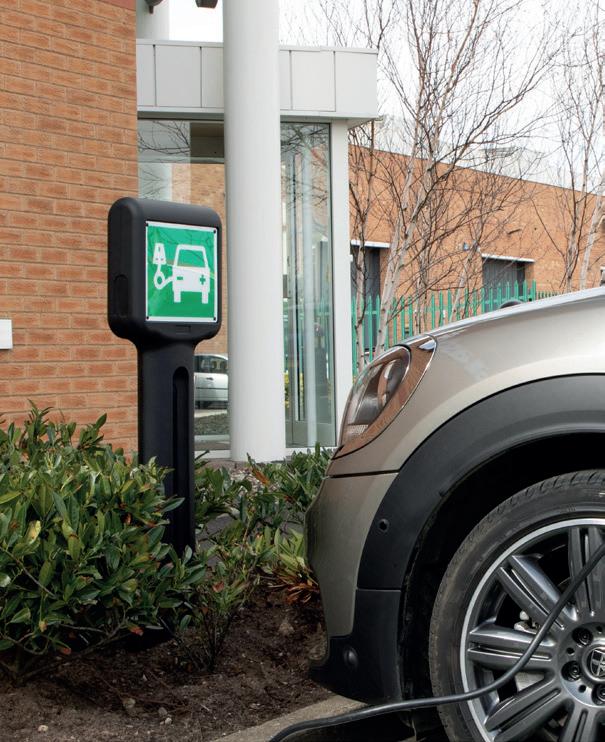
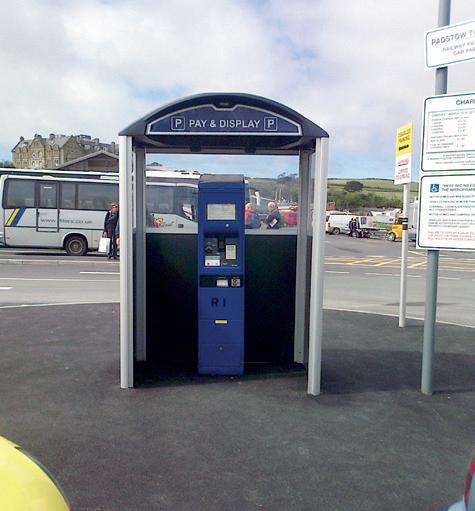
“Our plan is to be much more than just a parking payment app. This aligns with our ethos of simplifying the journey for our users, allowing them to focus on what matters most. With PayByPhone Protect, we are giving them peace of mind every step of that journey, wherever it takes them.”
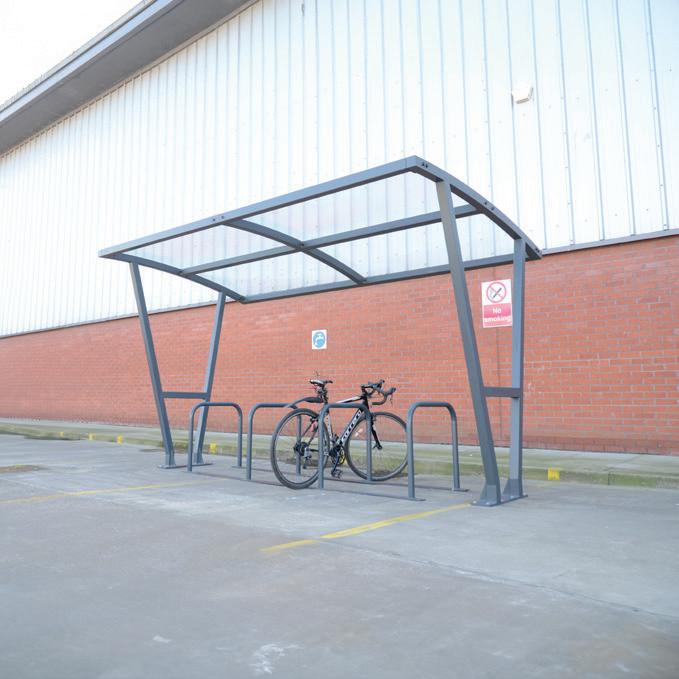
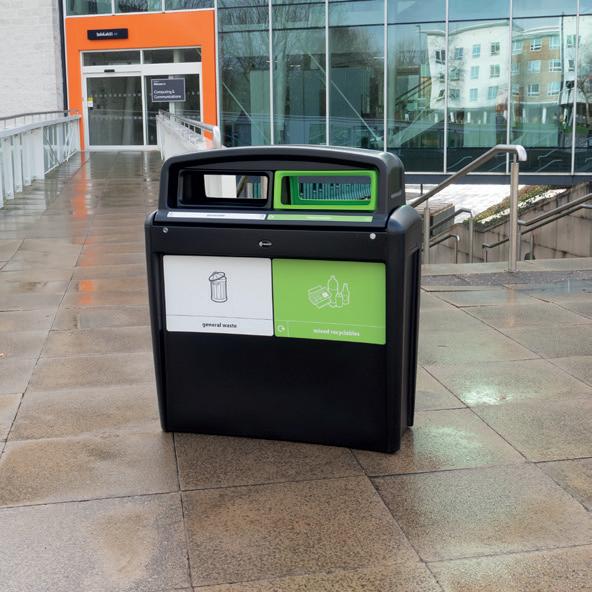

PARKING TECHNOLOGY PARKING REVIEW | 47
Designs for a Cleaner, Safer & More Sustainable Car Park www.glasdon.com GW899 Parking Review Magazine Advert 5 24 indd 1 04/06/2024 14:22:29
Life support for electric cars
Electric vehicle charging infrastructure is an increasingly important component of hospital and campus parking facilities, says Dan Lessiter of Believ

Chargepoints are now a key piece of parking infrastructure
With an increasing consumer demand for sustainable motoring and the greater availability of electric models, the number of electric cars in the UK is growing at a rapid rate. Wherever there is land – a healthcare establishment or educational facility, for example – facilities managers are continually being challenged to make use of that land. With parking, it was about maximising revenues while improving convenience for visitors, staff, patients and students. Now the same challenge – and the same balance between delivering a service and providing an additional revenue stream – applies with EV charging. However, allocating the funding, management and resources


to plan, install and maintain chargepoints poses a significant challenge for facilities managers to overcome. To get them over the line, they need to be convinced that the opportunity is worth the effort, that the infrastructure they provide is dependable, affordable, easily accessible and environmentally sustainable.
Responsible EV chargepoint operators (CPOs) such as Believ can provide this, and also present the healthcare and education sectors with an end-to-end, fully managed, fully funded EV charging solution – taking the responsibility and task of facilitating sustainable transport in house – leaving facilities managers free to carry out the rest of their day job.
The successful installation of EV charging will not only deliver the convenience and revenues a facilities manager may be looking for, but they are also aligned with an increasing need for organisations to demonstrate their environmental responsibilities.
A fully funded model
During a time of increased energy and operational costs, hospitals and educational campuses may be questioning whether now is the right time to invest in EV charging point infrastructure. Questions including whether it is too expensive and whether the chargepoints will be used enough to justify an installation all arise.
The solutions to these questions lie with the CPOs. Believ recognises the first priority is to take funding out of the equation. It recognises also that a private and fully-funded ‘always-on’ EV charging solution is ideal for supporting the wide-scale adoption of sustainable transport in these two sectors with high footfall.
By delivering a competitive host remuneration package, parking fees are further enhanced with additional vehicle charging revenues without any capital expenditure at all. For example, backed by our parent companies, Liberty Global and Zouk Capital, and utilising our sister company and delivery partner, Virgin Media O2, Believ has the scale and capability to deliver all speeds of EV charging infrastructure at the pace that healthcare organisations and educational establishments need, and without the cost.
EVOLUTION 48 | PARKING REVIEW EVs support sustainable transport policies
Allocating the funding, management and resources to plan, install and maintain chargepoints poses a significant challenge
for facilities managers to overcome Dan Lessiter
End-to-end solutions
Delivering an appropriate EV charging infrastructure for staff who have invested in EVs, and visitors needing accessible parking, is not an easy task, and a comparatively recent challenge for facilities managers within the healthcare and education sectors to solve. It has been made more difficult by labour costs and extensive construction and installation timescales. All of this adds to the challenges of deciphering chargepoint location, methods of funding or chargepoint speeds. These can quickly become an overwhelming task for managers in an industry where free time is a rarity.
This is where good CPOs show their true value. CPOs exist to provide solutions by means of consultation, design and planning. They work closely with facilities managers to identify profitable, sustainable and secure locations for chargepoints to be installed. By placing stakeholder need at the forefront of every project, facilities managers can benefit from a made-to-measure, end-toend solution that does not require extensive resource or cause them unnecessary hassle. Whether this comes down to planning the number of EV chargepoint parking spaces needed, the type of chargepoint socket or speed of charge, each solution is tailored towards providing an optimised charging experience for vehicle drivers, meeting EV demand in a reliable and effective way.
Sustainability goals
For many organisations, especially within the healthcare and education sectors, it has become increasingly important to demonstrate active engagement with fostering and encouraging environmental best practice from all stakeholders. Indeed, a clear commitment to sustainability can play a role in attracting and retaining staff and students alike, increasingly so, as being a positive global citizen becomes a greater priority for many people.
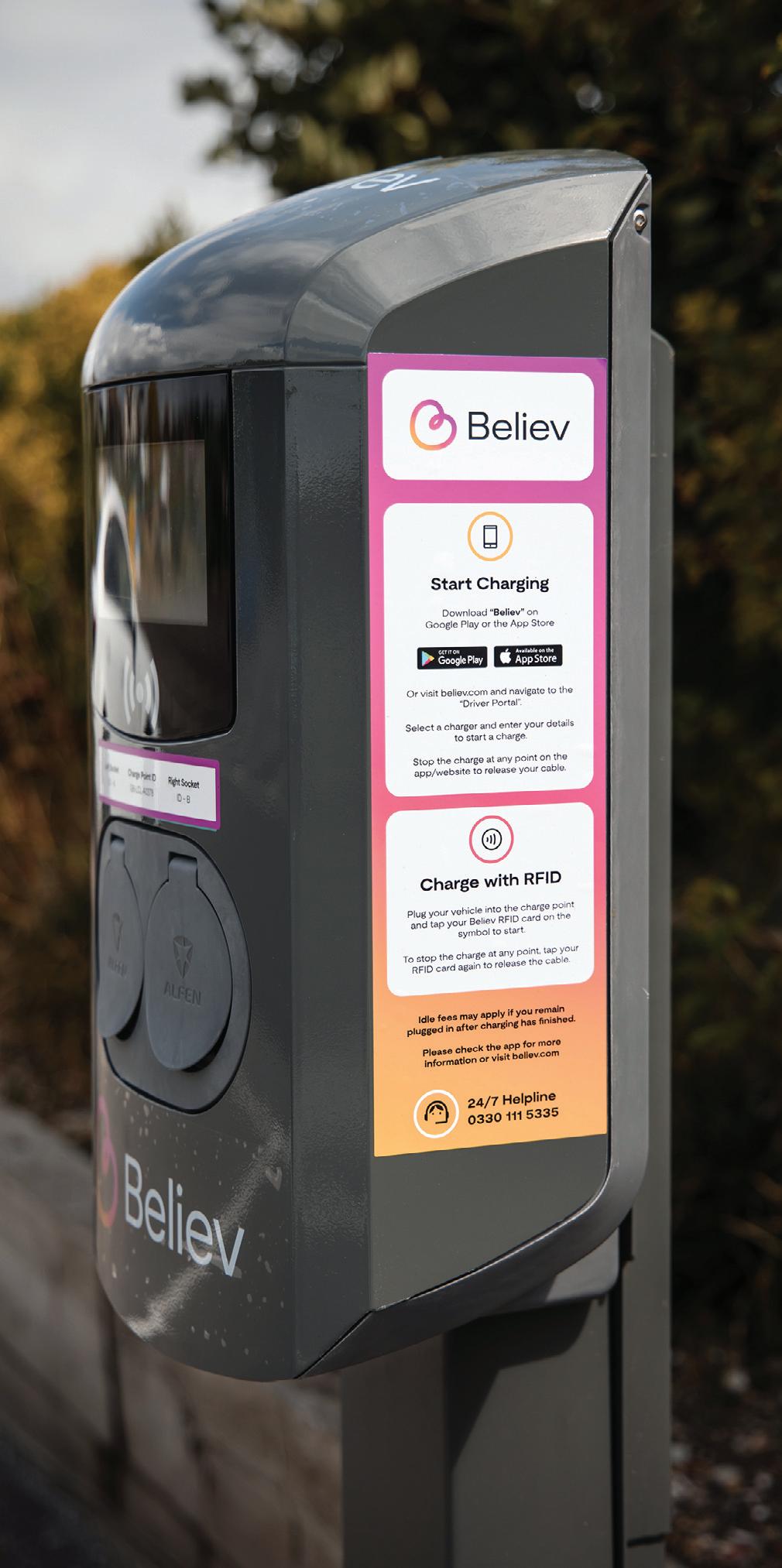
A crucial aspect of a CPO’s service involves assisting healthcare and educational organisations in persuading stakeholders about the environmental significance of promoting sustainable travel for visitors and employees, along with the associated long-term financial advantages.
Partnering with a CPO enables healthcare establishments and education facilities to deliver the practical charging infrastructure that their stakeholders will need, now and for the future. But more than this. Investing in EV infrastructure is an effective strategy in mitigating Scope 3 emissions as part of an organisation’s wider environmental and social governance (ESG) ambitions. It will also help accelerate the decarbonisation of transport across the UK and deliver cleaner air for all.


Believ is the trading name of Liberty Charge, an electric vehicle chargepoint operator (CPO) that installs, operates and maintains all speeds of publicly accessible chargepoints at zero cost to both public and business sectors. Believ is funded by Liberty Global Ventures and Zouk Capital, the manager of the HM Treasury-backed Charging Infrastructure Investment Fund (CIIF). Believ partners with sister company Virgin Media O2 in the deployment of charging infrastructure. believ.com
EVOLUTION PARKING REVIEW | 49
Dan Lessiter is head of B2B partnerships at chargepoint operator Believ
Dan Lessiter
Offer a range of cashless payment options
Around two-thirds of Britain’s most common type of public chargepoint suffer limited mobile signal connectivity, says the RAC Foundation in a report highlighting how the current state of the UK’s phone networks are impacting the electric vehicle charging infrastructure. Failure to design public chargepoints to work around Britain’s patchy mobile signal coverage means drivers of electric cars could be facing problems when they seek to ‘fill up’ at thousands of locations, research by the RAC Foundation suggests.
According to Department for Transport figures, based on data from Zapmap, there were 53,677 public charging devices in the UK at the start of 2024. Of these, 31,910 have speeds up to 8kW and almost all will be so-called Type-2 chargers.
Unlike chargepoints with a speed of 8kW or faster, chargers below 8kW are not obliged to provide for contactless payment. The RAC Foundation found that the vast majority require drivers to access them via mobile phone apps. Most chargers themselves also need an adequate mobile signal connection to function, reports the RAC Foundation.
Britain has four mobile network providers: EE, O2, Three and Vodafone, on which other companies such as giffgaff and Tesco Mobile can piggyback. The foundation worries that unless all four are providing adequate signal coverage at the chargepoint location there’s a risk that either the user or the charger will lack the connection needed to unlock the flow of electricity.
Reading the signals
The RAC Foundation analysed a randomly selected sample of 2,059 Type-2 public chargers across Britain. The research reveals that the majority of these chargers do not have an adequate level of coverage from all four mobile phone network providers to guarantee they can be activated 100% of the time.
In Britain, outside of London, just a third (33.4%) of the Type-2 chargers analysed are in locations where there is acceptable allnetwork 4G coverage. Two-thirds (66.4%) are in spots where a signal from one, two, three or even all the providers is absent or too weak to work.
In London, the picture is only slightly better at 39.7% and 61.3% respectively.
Where a 4G signal is absent then a residual 3G signal might still be available, but the national 3G network is due to be shut down completely by 2033. Vodafone has already turned off its 3G network with EE and Three expected to complete their shutdowns later this year, and O2 next year.
The mobile signal strength data used in the analysis was provided by Teragence. This data was then matched to the 2,059 chargers used in the study.
Drivers depend on phones
The RAC Foundation has also published an account of an EV ‘road trip’ by its director Steve Gooding around the South East of England which highlighted some of the challenges drivers of electric cars face when
Steve
Gooding: The mobile phone is already deeply embedded in our daily lives, not least when it comes to driving

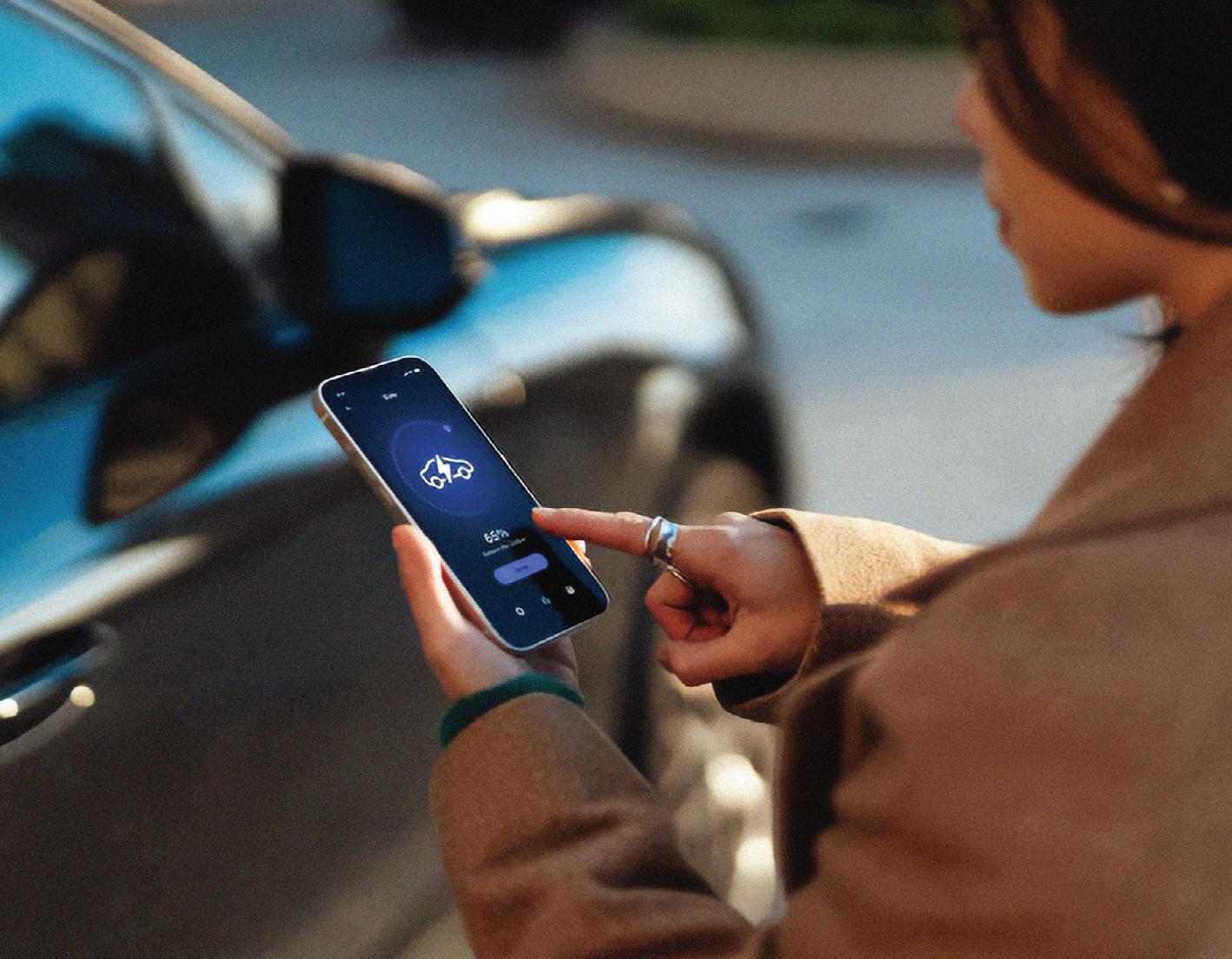
Is poor mobile coverage slowing EV transition?
RAC Foundation research raises concerns about negative consequences of patchy electric vehicle chargepoint connectivity
they try and recharge.
Steve Gooding said: “Drivers of vehicles fuelled by petrol and diesel are used to reliable and hassle-free filling up at any of the 8,400 forecourts across Britain. The same cannot yet be said of topping up the battery of an electric car at a public chargepoint. In many instances the mobile phone has become the key to unlocking the potential of the electric car. Unfortunately, that key does not always work.
“The mobile phone is already deeply embedded in our daily lives, not least when it comes to driving where we rely on a good mobile connection to inform our sat navs, pay for parking and to unlock electric chargers. But all these systems need to be designed with an eye sharply focussed on real-world network coverage, which is often patchy, sometimes non-existent, and not about to become infinitely better.
“Where signal connectivity at a chargepoint is a problem drivers might conclude that the charger is at fault hence undermining the confidence we should be building in the reliability of public charging options for electric vehicles. What’s more, the poor connectivity won’t get picked up in the new mandatory reporting system applying only to the rapid charger network. In order to design reliable connected services that work for motorists we need a better approach to assessing and reporting the adequacy of on-the-move connectivity so that designers, including electric chargepoint providers, can select which of the readily available
workarounds would cover for the shortcomings of the mobile networks.”
Workarounds
Where adequate mobile phone signal coverage is unavailable workarounds could include:
• signposting the availability of a limited Wi-Fi hotspot for drivers to use (e.g. in the on-charger instructions for use) if the chargepoint’s connection is robust but the motorist’s might not be
• use of roaming SIM cards (i.e., from other countries), which have become increasingly common on the Internet of Things (IoT) sector, so that connectivity can adjust by roaming to whichever mobile network is most robust at a given moment
• use of external and/or directional antennae for more reliable data connections
• making ‘roaming’ RFID (Radio Frequency Identification) cards more widely, and freely, available to remove the motorist’s phone from the equation
• improvements to signal quality through the Shared Rural Network (SRN) programme of mast sharing between mobile network operators
• satellite internet provision from operators like Starlink and OneWeb
• as a fallback, when the issue is an unresolvable signal connectivity failure, the charger itself could be set to default to provide a free charge up to a limit that would at least guard against a potential breakdown for lack of a sufficiently charged battery.
EVOLUTION 50 | PARKING REVIEW
Road legal: automated vehicles
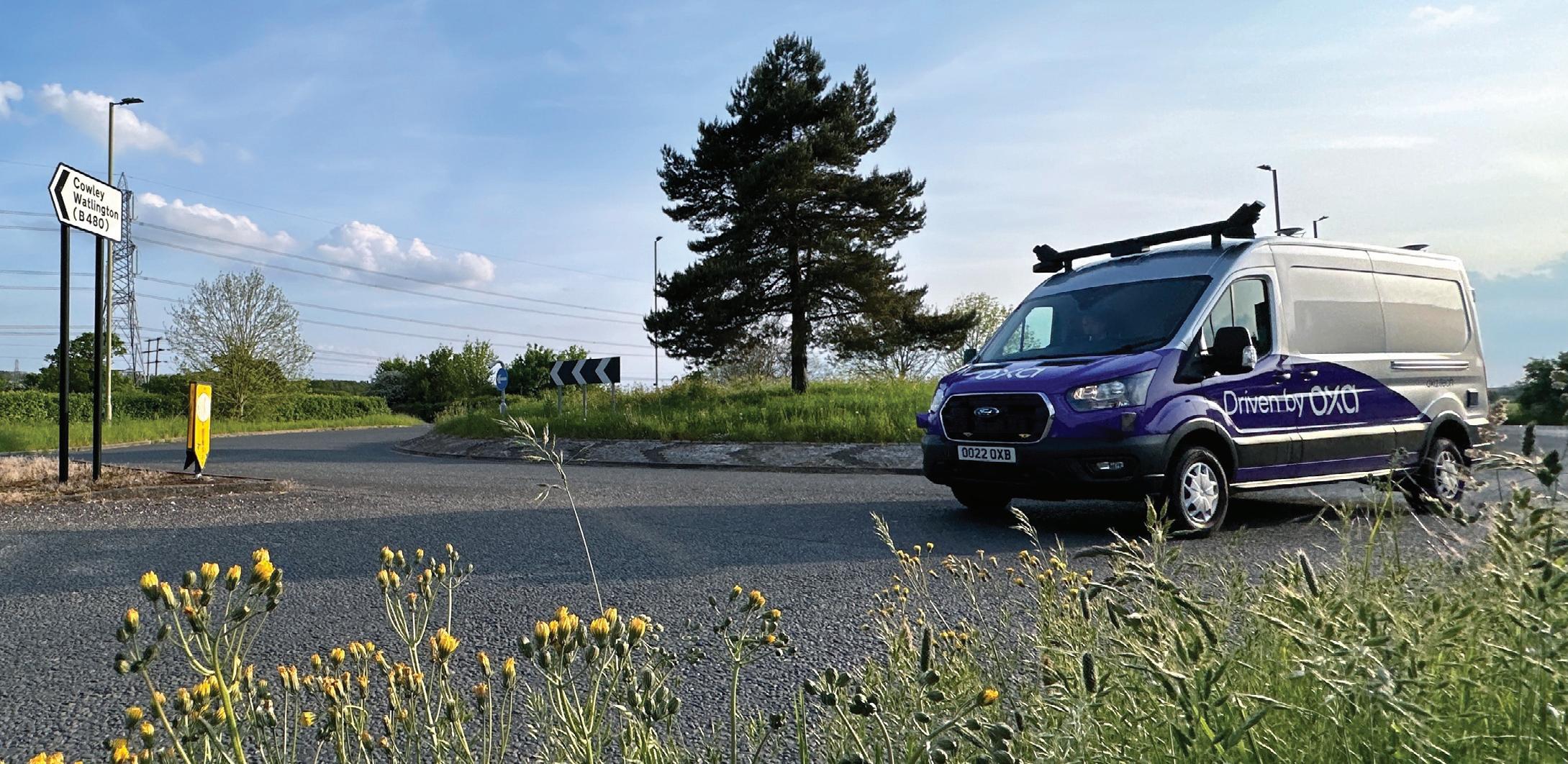

New law means self-driving vehicles could be on British roads by 2026
Self-driving vehicles could be on British roads by 2026, after the Automated Vehicles (AV) Act received Royal Assent and was signed into UK law. Announced in the King’s Speech, the Act sets out a new regulatory framework for the selfdriving industry. The law will require self-driving vehicles to achieve a level of safety at least as high as careful and competent human drivers, as well as meeting safety checks before being allowed onto roads.
The Department for Transport (DfT) says in the future deaths and injuries from drink driving, speeding, tiredness and inattention could be drastically reduced. The DfT predicts that automated vehicles will improve road safety by reducing human error, which contributes to 88% of road collisions.
Transport secretary Mark Harper said: “Britain stands at the threshold of an automotive revolution, and this new law is a milestone moment for our self-driving industry which has the potential to change the way we travel forever. While this doesn’t take away people’s ability to choose to drive themselves, our landmark legislation means self-driving vehicles can be rolled out on British roads as soon as 2026, in a real boost to both safety and our economy.”
The Act delivers a legal framework setting out who is liable for AVs, meaning that drivers can be assured that while their vehicle is in self-driving mode, they will not be held responsible for how the vehicle drives. For the first time, corporations such as insurance providers, software developers and automotive manufacturers can assume this responsibility. To ensure self-driving vehicles are safe for use on public roads, the vehicle
approval system will be supported by an independent incident investigation function. This will promote the same culture of learning and continuous improvement that has made our aviation industry one of the safest in the world. Companies will have ongoing obligations to keep their vehicles safe and ensure that they continue to drive in accordance with UK law.
Some AVs will have a ‘user-in-charge’ function, while others will be ‘no-user-incharge’. User-in-charge cars will have functionality to both be driven or to drive itself for some or all of the journey. When in selfdriving mode, the driver is not responsible for how the vehicle drives, though they retain other responsibilities such as insurance and vehicle roadworthiness. When the vehicle is being driven, it is treated as a conventional vehicle. A ‘no-user-in-charge’ journey would be one where the AV drives itself for the whole journey. No occupant is a driver during the journey and, in some cases, it may not be possible for the vehicle to be traditionally driven. A licensed operator would monitor the vehicle during the journey and ensure it is properly insured and maintained.
The AV Act follows self-driving trials already taking place across the country. For example, Wayve and Oxa are trialling self-driving cars in
London and Oxford.
Paul Newman, founder and chief technical officer of Oxa, said: “The immense work put in by the DfT, Law Commissions and Centre for Connected and Autonomous Vehicles (CCAV) in crafting the Automated Vehicles Bill has helped it pass into law with the strongest cross-party backing. We now have autonomous vehicle (AV) legislation which is more comprehensive in scope and clearer in its requirements than in any other country.
“The Act gives the UK new momentum as developers like Oxa will need to comply with the world’s most comprehensive autonomous vehicle laws to deploy technology in vehicles here. Meeting the highest AV standards will make British companies global leaders with technology that is the safest and AI systems the most trusted – all key to building business and public trust in autonomy globally.”
Wayve said its technological advancements have been supported by the UK’s Code of Practice: Automated Vehicle Trialling, which sets out a clear framework to support and promote the safe trailing of self-driving vehicle technology.
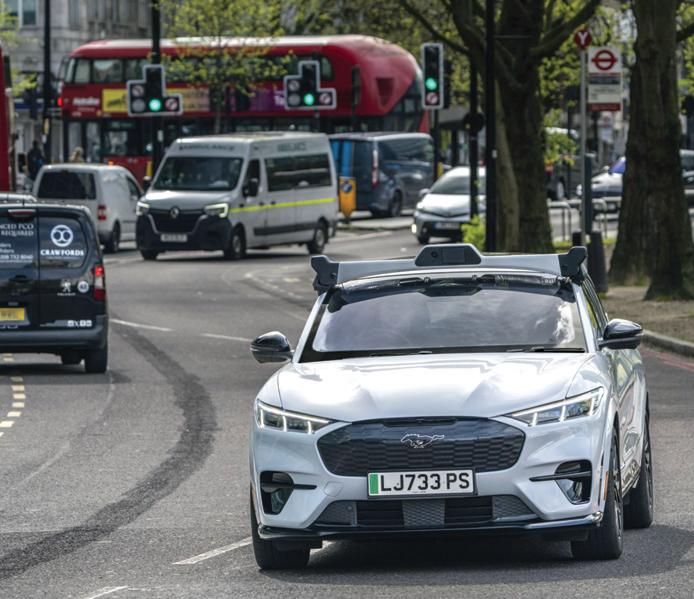

Alex Kendall, co-founder and chief executive of Wayve, said: “I am delighted that the Automated Vehicles Bill has received Royal Assent. This is a critical milestone for the UK’s deployment of self-driving technology and cements the UK as a global leader in regulating this sector. We are grateful to the government and all who have engaged with us in the conversation about the importance of this legislation. Self-driving technology promises a safer, smarter and more sustainable future of transport. There’s still some way to go with secondary legislation before we can reap the full benefits of selfdriving vehicles in the UK, but we are confident the government will prioritise these next steps so this technology can be deployed as soon as possible.”
EVOLUTION PARKING REVIEW | 51
An autonomous-enabled Oxa van
A Wayve trial vehicle in London
Uber funds Redbridge’s new EV chargers
Believ installs kerbside chargepoints across east London borough
On-street EV chargers are being installed in the London Borough Redbridge as part of a new partnership project with Uber.
The fast chargers are being fully funded through Uber. Believ was awarded the contract to install, operate and maintain the fast chargers.
Locations in the east London borough were identified based on demand. Following the first leg of the project, Redbridge residents now have access to 34 new 22kW dual fast chargers around the borough.
The dual chargers allow two vehicles to be charged simultaneously at the same location, providing 68 chargepoints in total. They are available to all EV drivers, subject to local parking restrictions.
Further chargers are also being rolled out under the project, bringing a total of 174 new fast chargers to 87 locations around the bor-
Ubitricity wins Camden contract
Camden Council has appointed Ubitricity to operate and maintain over 90 chargepoints across the north London borough. This follows on from the expiration of the council’s existing Go Ultra Low City Scheme (GULCS) contracts with Siemens.
The move is part of the council’s Electric Vehicle Charging Point Action Plan. It provides Ubitricity, a subsidiary of Shell, with a 12month contract to align the borough’s EV charging infrastructure ahead of a new operation and maintenance tender later in 2024.
The first round of GULCS contracts were awarded in 2018, with 92 chargepoints deployed across Camden by Ubitricity and its partner, Siemens.
“Since 2018 we have overseen the delivery and operation of Camden’s network of EV chargepoints under the GULCS scheme, and are thrilled to be able to provide a continuity of service to the borough and its EV users ahead of the new tender,” said Toby Butler, UK managing director at Ubitricity.
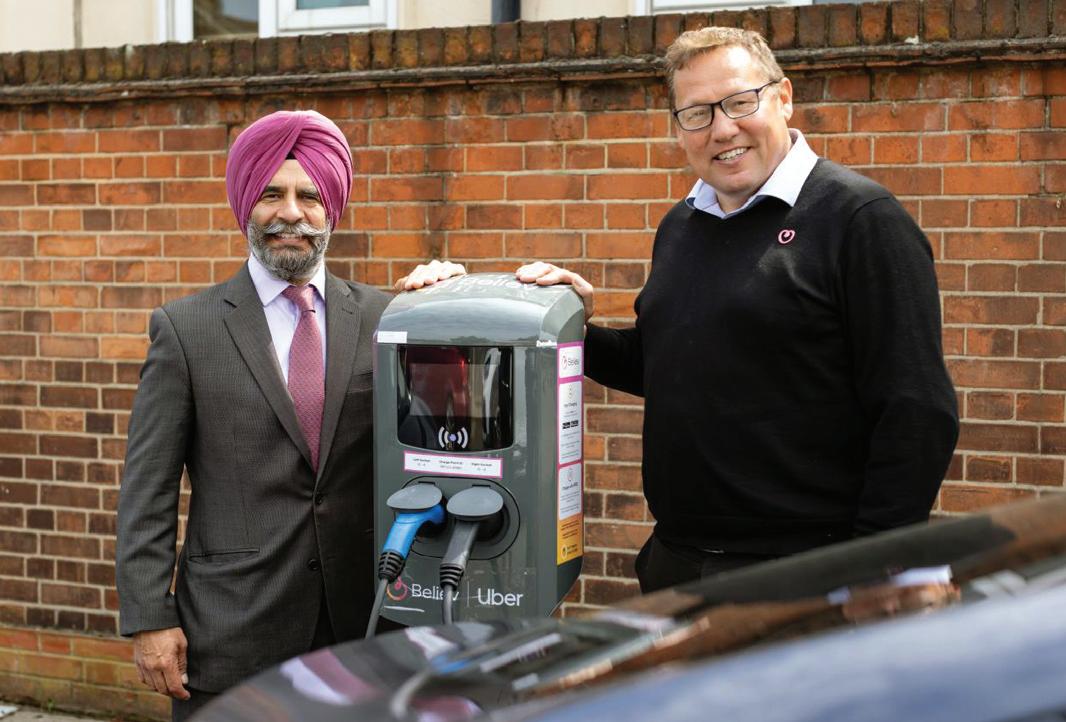
the borough’s EV infrastructure to support local people with making greener travel choices. Our goal is to keep expanding Redbridge’s on-street electric vehicle charging network to make it easier for local people to switch to an electric vehicle, helping to cut air pollution and tackle climate change in the process. And this also means helping local taxi and private hire drivers in Redbridge to switch to electric vehicles too.”

ough by the end of 2024, helping add to the borough’s existing network of chargepoints.
Transport was identified as one of the largest sources of carbon emissions in Redbridge, making it one of the council’s key areas for action in tackling climate change and creating a cleaner and greener borough.
Redbridge cabinet member for environment and sustainability, Cllr Jo Blackman, said: “The installation of these new fast chargers in this innovative part-
nership with Uber and Believ marks another milestone in Redbridge’s commitment to developing the borough’s EV network. With more on-street chargers now available to local people than ever before we hope more people will have the confidence to switch from petrol and diesel, to electric.”
Cllr Jas Athwal, leader of Redbridge Council, added: “Working in partnership with Uber and Believ we are making significant progress in developing
Stansted opens charging hub
Andrew Brem, general manager of Uber UK, said: “We are delighted to work with Redbridge Council on this vital project to boost EV infrastructure. Getting these chargers in the ground is a huge milestone with drivers often telling me that being able to access reliable charging near their homes is critical to their decision to switch to an EV.”
Guy Bartlett, Believ chief executive, said: “This project is an excellent example of public and private sectors working together to install EV charging infrastructure that delivers on a community’s need, without burdening the public purse.”
Burger King and Caffe Nero as an advertising platform to generate additional revenue.
Gareth Powell, managing director at London Stansted, said: “We are fully committed to the sustainable and responsible growth of London Stansted, which is why we’re delighted to open our first EV charging hub at the airport.


London Stansted Airport’s first rapid electric vehicle (EV) charging hub is now live for public use. The Evolt Charging hub is located on Thremhall Avenue, the main road into and out of the airport. It includes 10 charging bays that feature Evolt Touch charging units to provide up to 150kW of power, enabling a full charge in 30 minutes.
Evolt Touch, which has a 32inch touch screen, is a charging solution available with either one or two power outlets to provide simultaneous or sequential charging. The latter maximises power availability,
allowing the next vehicle in turn to start charging automatically once the vehicle in front has finished.
The Touch family of products can also be configured with clusters and satellite unit’s dependent on customer need and environment.
The touch screen helps transform the charging experience, and is perfect for displaying tariff and payment information, or instructional content (with multilingual options) to guide the driver through each charging event. The screen can also be used by Stansted and the new on-site
“This new facility is ideally located so that passengers, commuters, staff, local residents, and businesses passing through can grab a bite to eat and a cup of coffee while recharging their vehicles. Our focus is to continue driving forward on our commitment to reach net zero carbon operations by 2038.”
Lara Navetta, sales director at Evolt Charging, said: “We pride ourselves on building the best portfolio of charging technology and we know that rapid and ultra-rapid charging is key to the future of EV driving and uptake. We’re proud to support London Stansted with the launch of its first rapid EV charging hub, which marks a significant milestone in our shared commitment to sustainable travel.”
EVOLUTION 52 | PARKING REVIEW
Redbridge leader Jas Athwal with Believ’s Guy Bartlett
EV hub signage at Stansted
Power supply problems prompt call-outs
Techniche looks into causes of EV charger maintenance call-outs
Around 30% of all electric vehicle charger breakdowns require an engineer visit to fix them, reveals a study conducted by Techniche.
Problems with the power supply were the primary reason, responsible for 24% of engineer call-outs. Payment terminals (20%), slow charging or charging failures (20%) and hardware failures (18%), each generated the next highest number of callouts, while communications failures caused 13% of engineer visits.
The analysis also revealed that 70% of EV charger breakdowns can be solved remotely, using automation to reset a charger’s internal software.
Techniche analysed data from 5,000 EV chargers across its European customer sites in the UK, Ireland, Netherlands, Germany and Spain over the last year. Chargers were mostly 150175kWh fast chargers less than five years old, located in public


charging locations, mainly at forecourts, retail parks and supermarkets.
Techniche automates the maintenance of chargepoints to improve uptime. Techniche EV software enables chargepoint operators achieve higher levels of uptime by automating maintenance and monitoring processes.
The software triages issues and faults and automates the creation of work orders, notifications and alerts based on error codes. Charging session analytics are
Parkopedia works with BMW and MINI
used to identify patterns and trends that help reveal any issues, leading to earlier intervention and proactive maintenance.
David Cornish, head of product at Techniche, said: “Analysis of our data shows that 70% of EV charger breakdowns can be solved remotely but the remaining 30% require an on-site engineer to get them up-and-running again. It’s this 30% which causes the biggest headache for operators, resulting in slow repairs,
fidence in the charging process can be gained by automating resets and the maintenance process to make faulty chargers available for drivers as quickly as possible.
“The findings indicate there is much work to be done on improving the grid infrastructure with power issues being the single largest reason for callouts. This could be further compounded during the roll-out of chargers to more remote or rural locations, or the installation of power-hungry rapid chargers in urban areas, which present a challenge for power delivery.”
Glitches with payment terminals were only responsible for 20% of call-outs but not all rapid chargers today have contactless payment terminals.
Looking forward, Cornish predicted: “This figure could increase in the UK in coming months, with the government mandating that contactless payments be made available on all new rapid chargers, in addition to existing



Connected car services provider Parkopedia has expanded its partnership with BMW Group to provide EV drivers with additional EV Point of Interest (POI) data, enabling them to make more informed decisions about when and where to charge their vehicles.
The new functionality provides EV drivers with photos and ratings for charging locations, alongside Parkopedia-provided information such as the precise location of the charger, the charging speed, connector type and dynamic data including charging availability and whether units are operational or out-of-order.
Parkopedia now provides coverage for Spain, Italy, Belgium and Luxembourg, adding to the previous coverage in Germany, France, Netherlands, Austria and Switzerland.
The additional information is designed to help alleviate potential stress from the charging process for EV drivers by assisting them in selecting locations that best suit their needs – whether drivers want to prioritise well-lit sites where they feel safer, locations with local amenities so they can make the best use of charging times, or those with the highest user reviews, ensuring more reliable charging.

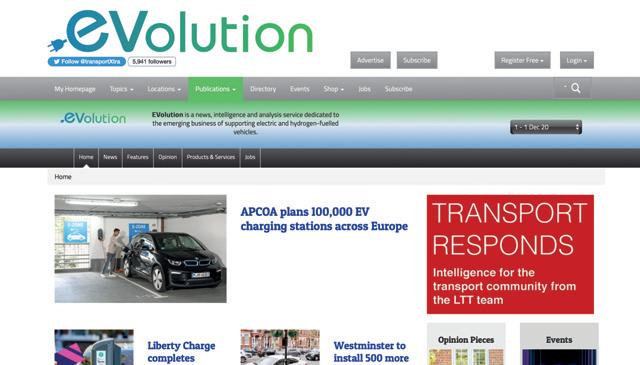















EVOLUTION
EVolution is an independent source of news and analysis on planning, creating and operating electric vehicle and zero-emission charging infrastructure. Plug into the Future www.EVolutionMagazine.co.uk
A Techniche EV charger status report
BMW in-car display

































54 | PARKING REVIEW Car Park Equipment Manufacturer Ticketed & Ticketless Systems ANPR & Prebook Mobile & Contactless Payment Multichannel Support Flexible Finance Options Orbility Limited Info.uk@orbility.com Unit 6 Mitchell Way, Portsmouth, Hampshire, PO3 5PR P +44 (0) 2392 414 423 www.orbility.com PAYMENT SERVICES DESIGNA UK Ltd Unit 11, Windmill Business Village Brooklands Close, Sunbury on Thames Middx. TW16 7DY info www.designa.com Are you ready for the future of parking? We are! Office tel: 01932 784040 Email: sales@designauk.com DESIGNA is a global technology leader in parking management systems. Our innovative, integrated equipment and soft ware solutions make efficient parking management extremely easy on all new media. Discover what Integrated Intelligence made by DESIGNA can do for you. DESIGNA | Technology CONSTRUCTION & REFURBISHMENT SERVICES Free Site Surveys Waterproof Coatings Movement Joints Corrosion Mitigation Concrete Repairs Anti-Carbonation Coatings Structural Repair and Protection For more information visit: www.structurecare.com TRANSFORMATION EXCELLENCE Concrete repairs Electro chemical Deck waterproofing Anti carbonation coatings Signage, CCTV Testing & investigation Lighting schemes & design Movement joints T: 0845 8994444 E: enquiries@makers.biz W: www.makers.biz Structural Car Park Repair and Refurbishment TECHNOLOGY SERVICES SERVICES DIRECTORY For directory advertising contact: Jason Conboy: 020 7091 7895 or Email: jason@landor.co.uk
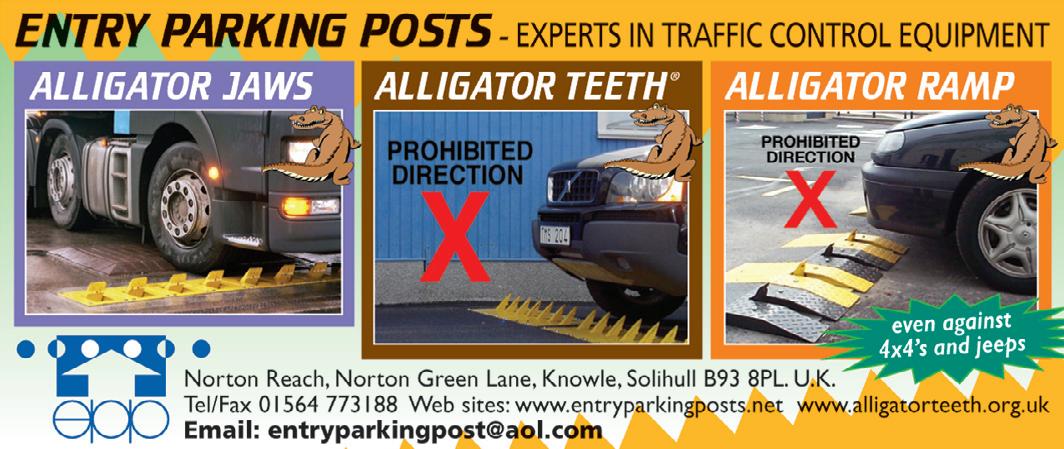

The Leading Independent Consultancy for all your parking solu琀ons
Established in 1991, with over 230 sa琀s昀ed customers comprising both public and private sector (including Local Authority and Health and Educa琀on establishments). Quality parking solu琀ons provided by our experienced in house specialists:
GIS mapping and surveying
• MTO site surveys and digi琀sing.
• On street TRO signs and lines: legality and condi琀on surveys (sample surveys also available).
• GIS mapping of TRO surveys, produc琀on of digital maps and TRO management for Order wri琀ng, upda琀ng and consolida琀on.
• Data extrac琀on and conversion of text based schedules to digi琀sed map based solu琀ons.
• Length of stay, usage, and occupancy parking surveys, both on and o昀 street.
• Compliance surveys and data analysis.
• Surveying and mapping of infrastructure assets.
Contact:


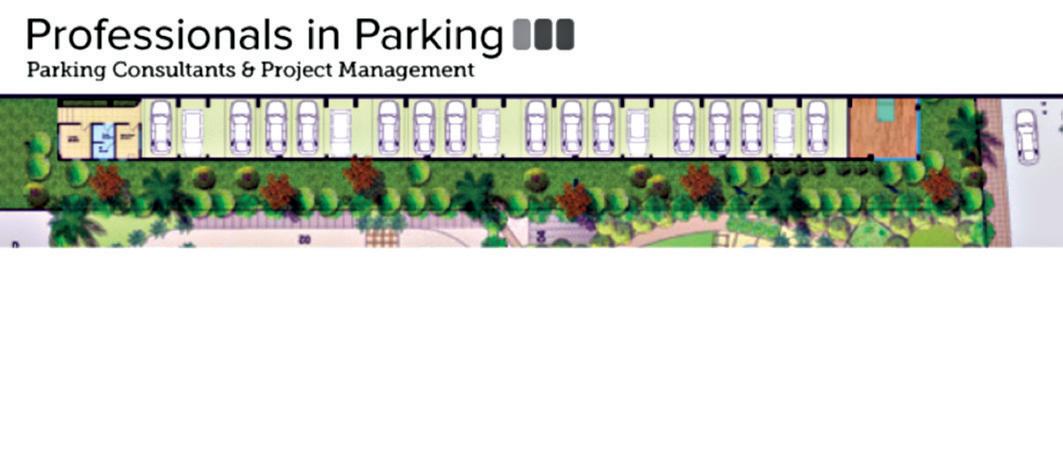
Consultancy services
• Financial appraisal and e�ciency reviews of parking service provision.
• Collabora琀ve working – joint no琀ce processing and shared enforcement.
• On and O昀 street tra�c regula琀on order wri琀ng.
• DPE and CPE feasibility studies and implementa琀on.
• Tari昀 reviews.
• DPE/CPE services speci昀ca琀on wri琀ng and tender evalua琀on. RTA
Peter Lowe B.Eng., C.Eng., M.I.C.E., FBPA
Tel: 01492585055 or 07900264137
Email: plowe@rtaassociates.co.uk
www.rtaassociates.co.uk
ENFORCEMENT & DEBT RECOVERY SERVICES

For more information on our services, please contact:
Lauren Appleby (North) lappleby@newlynplc.co.uk 07931 811088
Shaun Byrne (South) sbyrne@newlynplc.co.uk 07964 764099
DOCUMENT AND STATIONERY SERVICES
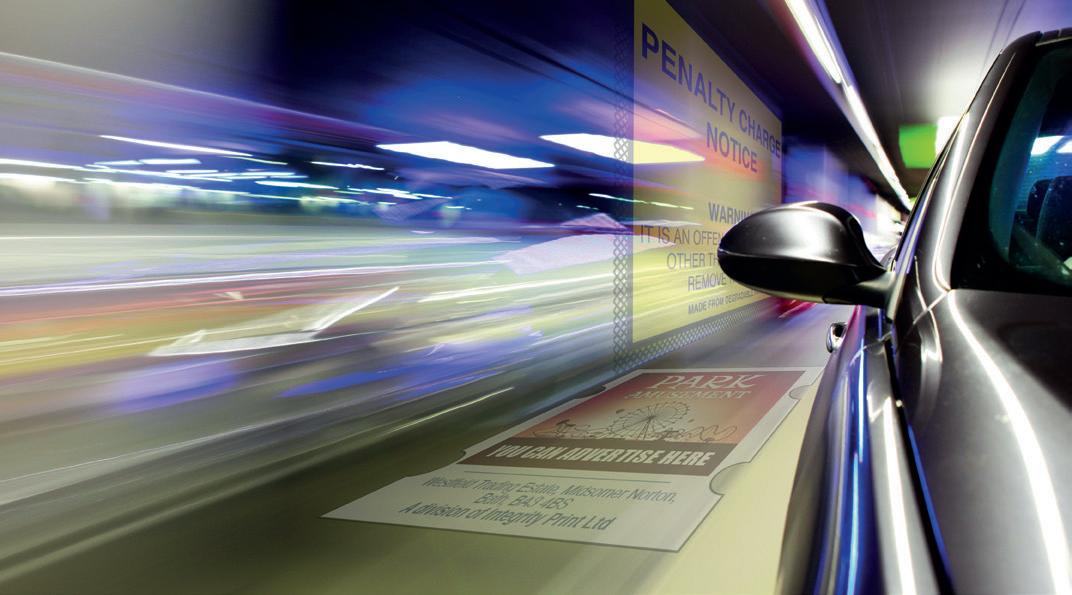
PARKING REVIEW | 55 SERVICES DIRECTORY
Associates Ltd
PSD - incorporating The Parking Shop –is the market leader for parking related statutory document mailings and sustainable manual enforcement stationery. We also supply line marking and signage solutions and as part of our service we offer on site surveys and reports.
contact@parkingandsecuredocuments.com Main office: 01761 409290 PARKING SERVICES Services include: Demand Forecasts Analysis Strategy Policy Pricing Survey Design & Execution Management Plans Contact: harry@parkingperspectives.com 01245 330370 www.parkingperspectives.com All services are delivered by staff with extensive operational experience in all areas of CPE. Our consultants are either ex-local authority managers or have many years of commercial CPE experience. We will tailor our services to meet your specific requirements. Contact details – Kirsty Reeves 07917 353 218 E-mail – info@parkingassociates.co.uk Please visit our web site for further information – www.parkingassociates.co.uk • CPE implementation assistance • Contract preparation (enforcement, customer services and IT) • Quality reviews of existing operations • Management support • Policy and procedure manuals • TMA 2004 training and WAMITAB qualification • CEO training and WAMITAB qualification • Audits and compliance surveys • Telephone and customer care courses • Letter writing courses • Parking Manager’s courses • Mystery shopping Parking strategy & policy development Making the most of your assets Consultation & analysis Efficiency & productivity review For professional and independent consultation in parking please contact: Phil Grant on 07807 832554 Usage surveys & analysis Development of revenue channels Equipment tenders & procurement Operational service reviews Tel: 07807 832554 Email: pipltd@outlook.com CONSULTANCY SERVICES
www.parkingandsecuredocuments.com Email:



















































































































































SAVE THE DATE! Organised by:Presented by: Supported by: 30 OCTOBER 2024 MANCHESTER CONFERENCE CENTRE



















































































 Patrick McGillycuddy
Patrick McGillycuddy














 Peter O’Driscoll
Peter O’Driscoll









































































 Robert Davis Sustainable Travel Manager Trueform
John Denton Head of CommercialUK & Ireland Q-Park
Lidia Derossi Principal Engineer AECOM
Laura Jacklin Commercial Development Manager Grid Smarter Cities
Robert Davis Sustainable Travel Manager Trueform
John Denton Head of CommercialUK & Ireland Q-Park
Lidia Derossi Principal Engineer AECOM
Laura Jacklin Commercial Development Manager Grid Smarter Cities



































































































